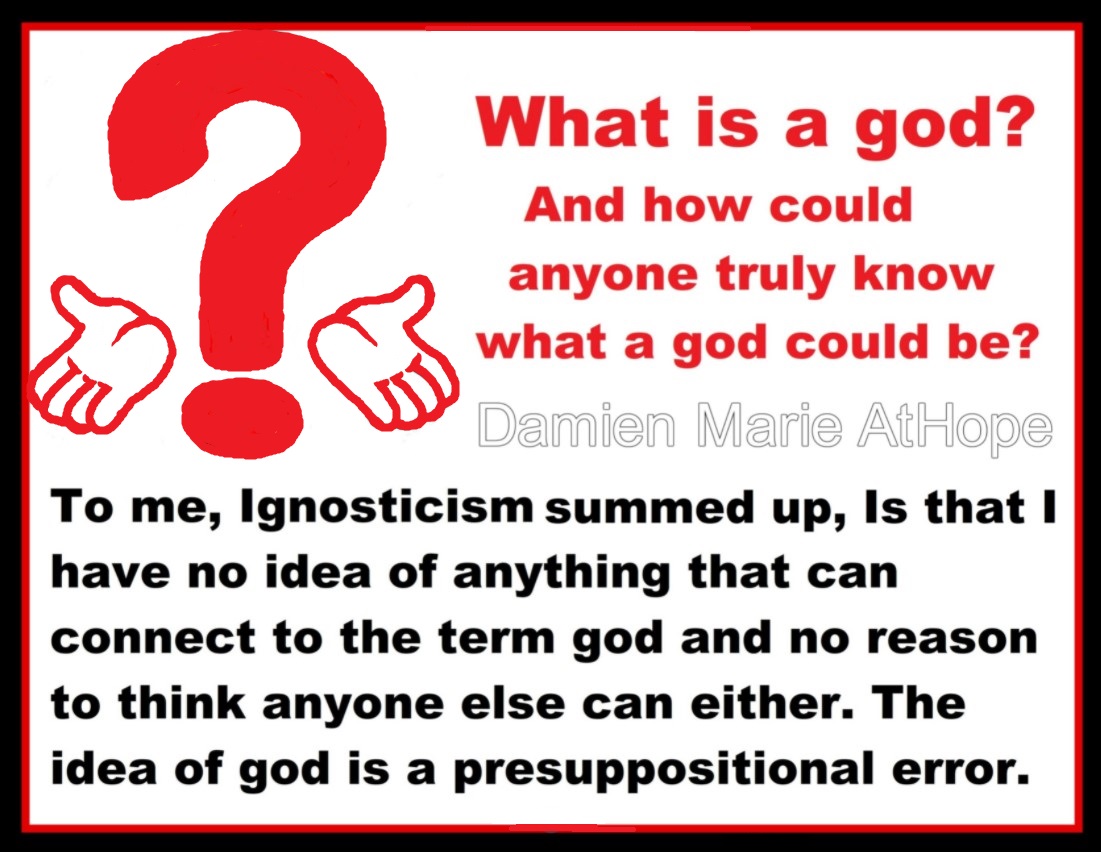
My response, I know the full history of religion and when and why gods were likely invented it was in the agricultural area around 12,000 years ago I have no more reason to ponder than real any more than Superman, an extraterrestrial living a hidden life on earth helping others with god-like powers. Goddesses (at least by 12,000 years ago in what is now turkey) were likely first after animals as god-like beings specifically seen 70,000 years ago with the first human worship of a stone snake in southern Africa. Well, it started female-centric but generally egalitarianistic and was so at least tell like after 7,000 and definitely by 5,000 and the birth of statism women fall in status but to me it’s 13,000 to 12,000-year-old proto-paganism goddess and animal gods that seem to come first I presume likely was drived from lesser earlier spirit beings/mythic ancestors, like a greater symbol of clan protectors in totemism which seems to go back like 50,000 to possibly 70,000 years ago which they already believed in from both proto-animism which seems to go back like 100,000 to ? years ago (possibly pre-human maybe as far back as 300,000? years ago) and further developed in shamanism which seems to go back like 30,000. Yes, you need to know about Animism to understand Religion
“Ok… Irrelevant… How do you define a “God”? What attributes would it have to possess for you to consider it a genuine concept of a god? Have you ever considered that you put the idea of God into such a small box that you’ve made it too easy to discard anything that doesn’t fit the criteria?Basically, you may have consciously, but unintentionally created a definition of God that’s inherently irrational so that you can easily dismiss it. To say that any god exists and to say that no gods exist are equally dishonest assertions.” – Challenger
My response, What is a god? Are you wishing I address the inability to prove any magic anything, which means I have no need to even act if it is worthy to consider, it is not. Are you asking me if magic exists, as it does not thus no think is supernatural prove any magic or supernatural anything in this reality. What magic is they to compel me to think of the absurd? Well, my answer as an ignostic atheist is, first prove the actuality of simple magic before you try to ask anyone about the possibility of some supreme magic. I am a hardcore methodological rationalist and will believe nothing without valid and reliable reason and evidence neither will I ever be pushed any skepticism, unless I first appeal to its reason. Thus, my default, is like a null hypothesis: “no beliefs are true”, then it must be proven otherwise with valid and reliable reason and evidence before I entertain any firm belief. I strive to employ an intellectually high standard in my thinking and value good belief etiquette. What is a gOD Challenge Do you believe in god? If so, what is a god and how can you claim to know about this? The Disproof Atheism Society: EMPIRICAL, CONCEPTUAL, and DISPROOFS of gOD, Reasons for or Types of Atheism, Sedentism and the Creation of goddesses as well as gods, Yes, you need to know about Animism to understand Religion, Debunking both Positive (HEAVEN) and Negative (HELL) near death experiences., Atheistic Null Hypothesis: There is no God/Gods, My Strongest Explicit Atheism “positive” / “strong” / “hard” atheists similar to Antitheist Atheism., My Atheism: “Axiological Atheism”, [Antireligionist] My blogs that address Religion: Archaeology, Anthropology, Philosophy and History, Vague Theism or god Somethingism: just say NO, Challenging Agnosticism Assumptions, Faith is Not Evidence of Reality.
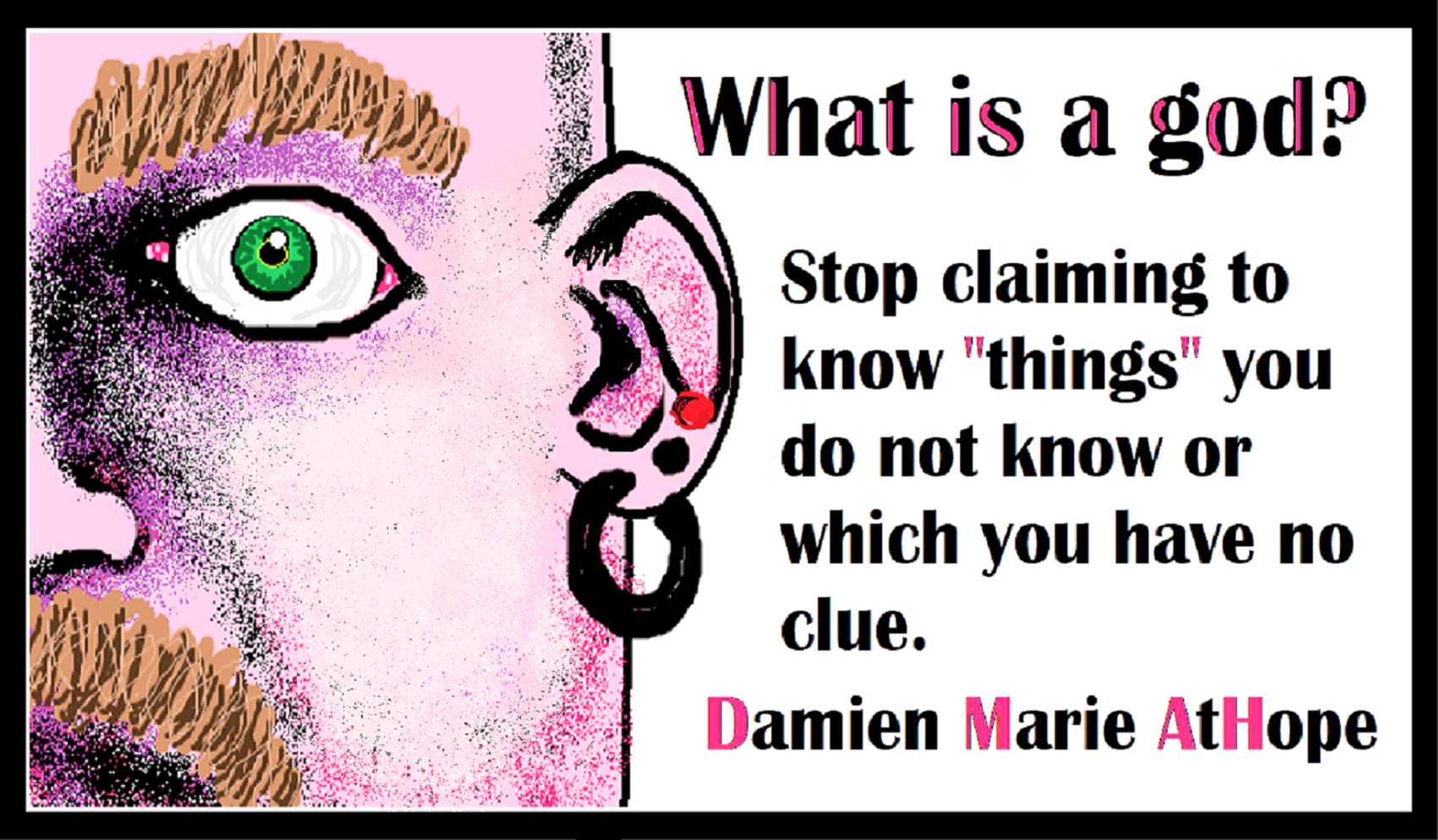
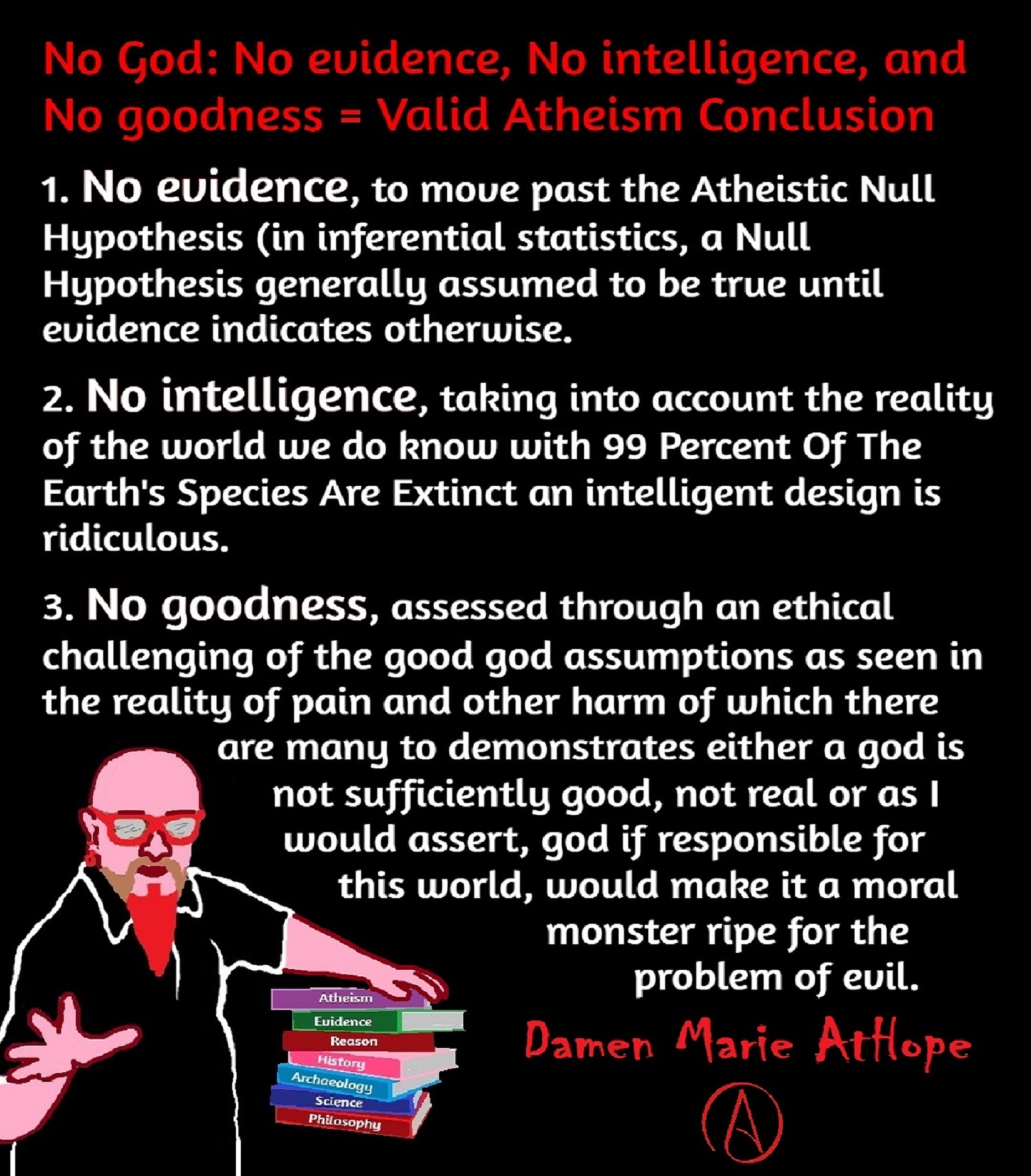
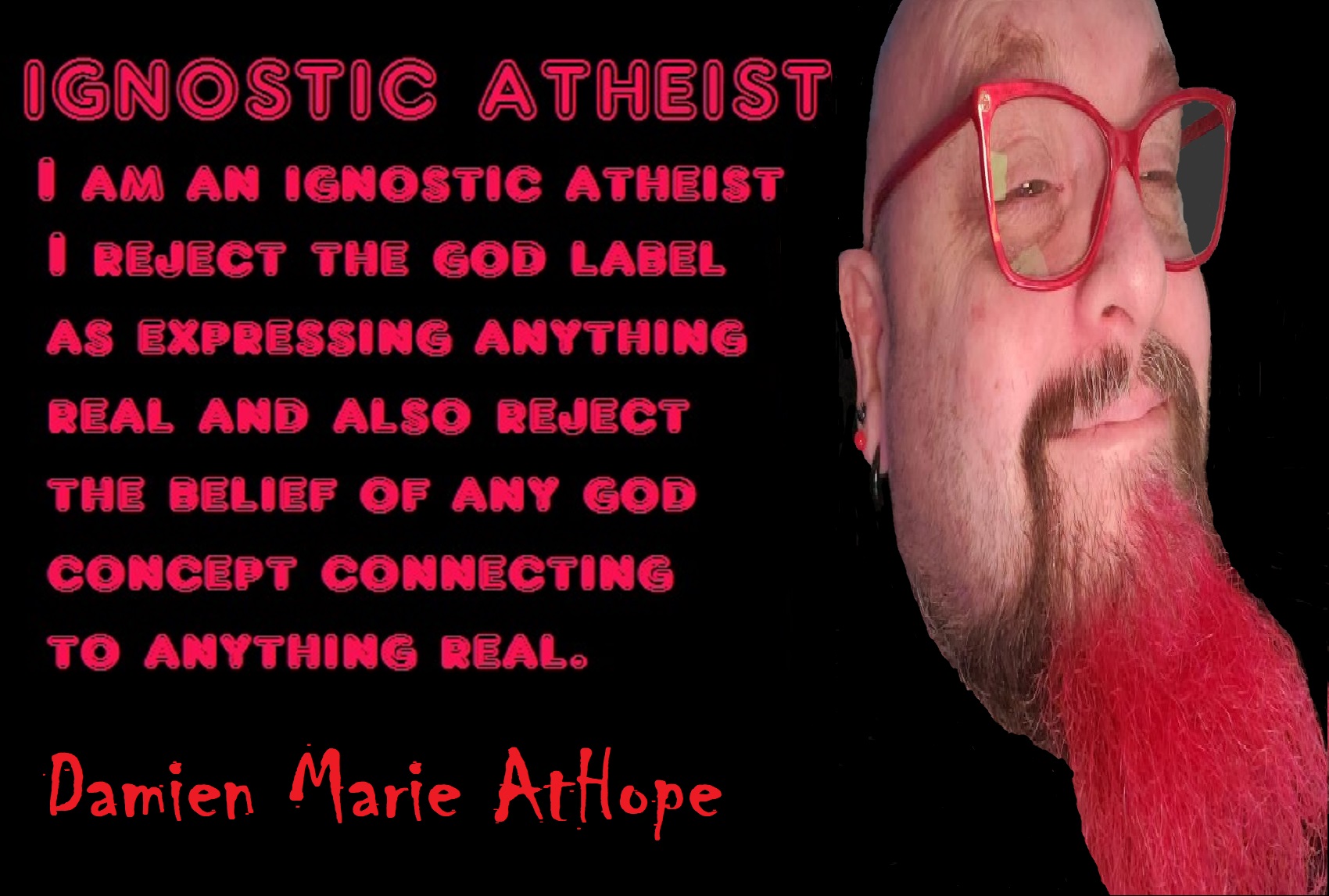
My response, Naturalism and Logical Positivism? I am intellectually honest and that means I have reason for beliefs not doubt about that with no access to evidence (gods). The Scientific Method and its Philosophy Axioms, Challenged or Challenging? (questions of ontology), My Methodological Rationalism: investigate (ontology), expose (epistemology) and judge (axiology), Using Ontology to Attack Theistic Errors, Let to tell you about ontology as I see it and use it., Ontology, Epistemology, & Axiology argument/challenge protocol, “The Hammer of Truth” (scientific philosophy: Ontology, Epistemology, & Axiology) in action., Grasping the status of truth (ontology of truth), agnostic vs ignostic, Damien, how do you feel about agnostics?, Explaining Axiological theism, Axiological agnosticism, and Axiological atheism, Discussions on Agnosticism and Atheism, Theists and Atheists as well as Agnostics?, Agnosticism Beliefs Involve “FOLK LOGIC” Thinking?, Agnosticism: Non-Standard Epistemology, My Anti-Agnostic Atheism Thinking, Agnosticism No Thanks, I am Ignostic, Firebrand Atheists Unite: Damien Marie AtHope Interviews David Silverman and That is not accurate in any way… Challenging Claims?
“There’s nothing wrong with doubt. I’m not saying that. I’m saying if your actually honest, you can’t say there isn’t something when you don’t even know what “it” could be” – Challenger
My response, So what is first doubt or reason for you? Reason is my only master. And, you made a truth claim, there is nothing wrong with doubt, yes there is. Denialism is negative doubt, Staying Religious believing in supernaturalism is Denialism. And, to me, believing in the clown car of fantacy that is belief god or the reality empty belief that is the god concept, in general, is a profound thinking error! All doubt is worthless without the reason validating it (Justificationism that actually supports it as logical: Logics is Naturalistic Observation).
“I was referring to the kind of doubt you were expressing…” – Challenger
My response, What makes me different, you asking me about a thing of fantasy without a valid justification thus it doesn’t need much thinking-attention. I have no reason to logically doubt the nothing term god. The Battle of Truth and To Find Truth You Must First Look
“You’re a gnostic atheist. It’s as unreasonable as being a gnostic theist. Neither of you can know an unfalsifiable claim. The only reasonable position is that of agnostic atheism, of which I subscribe. I don’t believe in God. I have no reason to as there is no evidence to support the claim (atheism). But I can’t say I know there is no God because there could be evidence I haven’t considered or been presented yet and I may be ignorant about a yet unimagined god concept (agnostcism). You can lack belief without knowing your lack of belief is the correct position” – Challenger
My response, What is this god term you feel requires doubt, please provide a reasonable argument? Saying I need to be open, I am and when I get a reasonable thing to consider I will. It’s funny how people think gods are real when the so-called help attributed to a supernatural agency is always proportional to the ability or means of the believer. With or without some god myth poor people are still poor and rich are still rich, the able-bodied are still just able-bodied, just as disabled bodied are still disabled bodied. So, although god believers claim all kinds of supernatural help, the only difference between the god believer and the non-god believer is the belief “itself” nothing else as we are alone. Naturally, there are no gods at all. We are as we ever were before the god myth was invented, only scared wishful thinking primates. We maybe be smart enough to create persuasive thought, yet dumb enough to waste it on the fantasy that somehow imaginary friends are, actually real. Let’s make it simple: Atheism is the reality position. Whereas, Theism is the anti-reality position! And as a rationalist, I don’t need mythic religion or its fake gods. Your assumptions about the term god are as empty as all assumptions of the term god, it is thinking, not a reality claim. I need reality beliefs to take thinking seriously, gods are up there with my value of Extreme Skepticism: Solipsism.
“It would really help me parse out your thoughts if you used some punctuation” – Challenger
My response, I am a rationalist thus I see reason as required to all thinking and ideas but enriched by scientific realism. Scientific Realism & Scientific Anti-Realism?, Scientific Realism & Scientific Anti-Realism?, When would skepticism NOT be reasonable?, I am a Rationalist, Rationalism and the Enlightenment, Rationalist atheism, and I am an Axiological Atheist, with a Rationalist Persuasion, who Supports Anarcho-Humanism. Why do people think Religion is much more than supernaturalism and superstitionism?
I will not validate your god term superstitions. “Religion and its god claims are both an Evolved Products” and Yes, Religion is like Fear given Wings, including its concepts of gods… It seems ancient peoples had to survived amazing threats in a “dangerous universe (by superstition perceived as good and evil),” and human “immorality or imperfection of the soul” which was thought to affect the still living, leading to ancestor worship. This ancestor worship presumably led to the belief in supernatural beings, and then some of these were turned into the belief in gods. This feeble myth called gods were just a human conceived “made from nothing into something over and over, changing, again and again, taking on more as they evolves all the while they are thought to be special,” but it is just supernatural animistic spirit-belief perceived as sacred. So, it all starts in a general way with Animism (theoretical belief in supernatural powers/spirits), then this is physically expressed in or with Totemism (theoretical belief in mythical relationship with powers/spirits through a totem item), which then enlists a full-time specific person to do this worship and believed interacting Shamanism (theoretical belief in access and influence with spirits through ritual), and then there is the further employment of myths and gods added to all the above giving you Paganism (often a lot more nature-based than most current top world religions, thus hinting to their close link to more ancient religious thinking it stems from). My hypothesis is expressed with an explanation of the building of a theatrical house (modern religions development).
“How is my definition of God empty? Simple yes, but empty? I think that may be your antitheistic bias speaking. I’d like it if you could justify and elaborate on that. You see it as reasonable to claim a thing does not exist for which you have no clear definition by which to identify it? How would you define God? You must be able to for you to claim it doesn’t exist.” – Challenger
My response, Scientific realism is the view that the universe described by science is real regardless of how it may be interpreted. Within philosophy of science, it is often an answer to the question “how is the success of science to be explained?” Because reality is as it presents itself, naturalism or supernatural anything is real and science having any accuracy is errors or totally wrong?
“I’m not denying reality. I’m not denying scientific truth. I’m saying maybe, just maybe, it fits into a larger scheme of which you or I haven’t been able to recognize” – Challenger
My response, The term god doesn’t connect with anything in reality removing it as a valid hypothesis or even a thing I need consider much. Scientific Values: fallibilism, realism, & rationalism and Archaeological, Scientific, & Philosophic evidence shows the god myth is man-made nonsense.
“But you can’t even give me a definition so how can I accept your assertion that it has no basis in reality?” – Challenger
My response, I am open to whatever is reality, gods As of now are not reality beliefs, if that changes I will be open to whatever is true. As a rationalist I strongly stand up for reality and Scientific Thinking not Faith Thinking
“I can define a unicorn. Doesn’t mean I need to believe in one. But I do need to be able to identify it so I can recognize it’s absence” – Challenger
My response, It’s what you think differently than me. I am not at all a skeptic I only value methodological skepticism (about truth) not philosophical skepticism (about doubt).
“I’m sure you’re aware of the simulation hypothesis. If true, and there is a conscious entity that’s responsible for the creation of our reality, would that qualify as a god to you?” – Challenger
My response, No, the world was made from natural and nothing is supernatural. To me, staying religious in this world of information is mostly denialism. I feel agnostics seem to make a similar error in thinking, to me. When I see someone is religious I think they are valuing lies and reality inaccuracies. Likely this is because they believe myths told to them most often as a child when they were most venerable to magical thinking and are now if an adult either not informed of the truths or are so invested in these childhood supernatural predilections that they are experiencing denialism. Yes, I think entire cultures can experience denialism. In human behavior, denialism is exhibited by individuals choosing to deny reality as a way to avoid dealing with an uncomfortable truth. It is the refusal to accept an empirically verifiable reality. In science, denialism has been defined as the rejection of basic concepts that are undisputed and well-supported parts of the scientific consensus on a topic in favor of ideas that are both radical and controversial. It has been proposed that the various forms of denialism have the common feature of the rejection of overwhelming evidence and the generation of a controversy through attempts to deny that a consensus exists. A common example of denialism is Young Earth creationism and its dispute with the evolutionary theory.
“How do you know this? That’s what the best evidence says, but you can’t know that” – Challenger
My response, I do not have to accept non-reality hypotheticals as if they are the same as reality hypothesis. Hypothesis are thinking not reality, as if they don’t use reality to support the assumption they are unrealistic.
“And if the engineer of our simulation obeys the same laws of physics we do, only in base reality instead of the simulation, it wouldn’t count as supernatural. Humans are in the process of making simulations. It’s only a matter of time before we can do it to such detail that an observer inside the simulation won’t know the difference. So if we’re going to be able to do it, why is it impossible to entertain the notion that it may have been done before and we’re the product of it? I use science to tell me what is as close as the evidence can get me. Philosophy tells me what could be beyond the bounds of our ignorance. To say that what science says is all there is, is not only intellectually dishonest, it’s historically ignorant of the scientific process” – Challenger
My response, I do appreciate your thoughtful and intelligent responses.
“But it’s obvious neither of us is going to change the others mind so I’m going to cut this short now, thank you for your time and stop wasting mine. Good day sir” – Challenger
My response, I care about what is true.
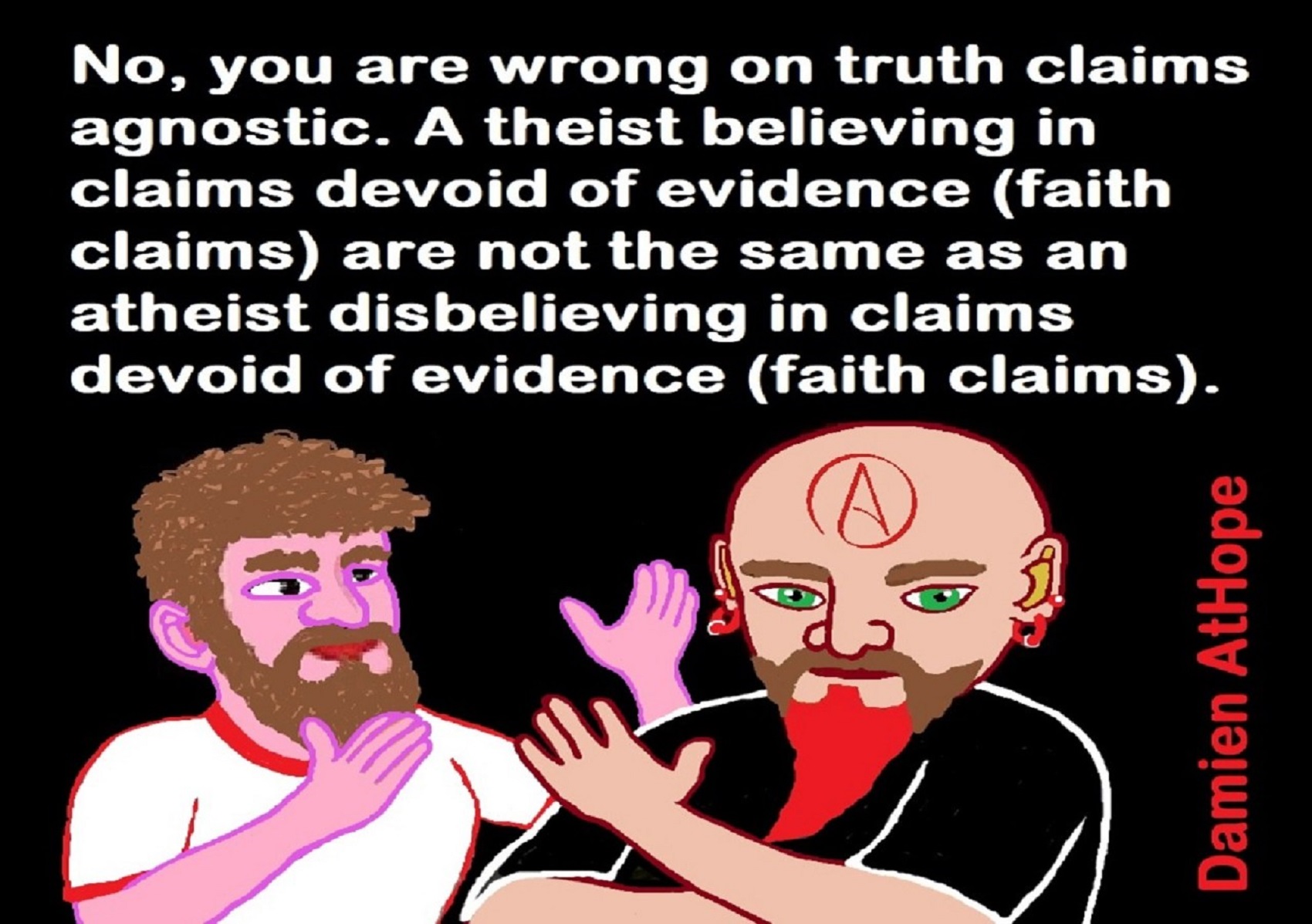
Do you believe in god?
Ok, What is a god and how can you claim to know about this?
The Disproof Atheism Society: EMPIRICAL, CONCEPTUAL, and DISPROOFS of gOD
“Damien, is it possible, just possible, there’s a God you haven’t considered? Maybe, like Christians who don’t understand how certain natural explanations can be true, it is also you that lacks imagination.” Questioner
My response, I know the full history of religion and when and why gods were likely invented, it was in the agricultural area around 12,000 years ago I have no more reason to ponder than real any more than Superman, an extraterrestrial living a hidden life on earth helping others with god-like powers. Goddesses (at least by 12,000 years ago in what is now turkey) were likely first after animals as god-like beings specifically seen 70,000 years ago with the first human worship of a stone snake in southern Africa. Well, it started female-centric but generally egalitarianistic and was so at least tell like after 7,000 and definitely by 5,000 and the birth of statism women fall in status but to me it’s 13,000 to 12,000-year-old proto-paganism goddess and animal gods that seem to come first I presume likely was drived from lesser earlier spirit beings/mythic ancestors, like a greater symbol of clan protectors in totemism which seems to go back like 50,000 to possibly 70,000 years ago which they already believed in from both proto-animism which seems to go back like 100,000 to ? years ago (possibly pre-human maybe as far back as 300,000? years ago) and further developed in shamanism which seems to go back like 30,000.
Sedentism and the Creation of goddesses as well as gods
Yes, you need to know about Animism to understand Religion
Debunking both Positive (HEAVEN) and Negative (HELL) near death experiences.
Atheistic Null Hypothesis: There is no God/Gods
A.T.H.E.I.S.T.= Against Theological Heresy Endangering Intelligent Sensible Thinking
By me referring to “Theological Heresy” I am saying theology is “Heresy” to reality.
I will now offer helpful but simplistic definitions of why a position of atheism could be chosen it is of course just an over-generalization but it will highlight the main idea though it always will be more substantive in reality and who is applying it.
Here is my list of non-theistic and theistic assumptions
Nonbelief:
- Weakest implicit Nontheistic/Atheism “negative” / “weak” / “soft” nonbelief similar to Nontheism
- Strong implicit Atheism “negative” / “weak” / “soft” nonbelief similar to Apatheist Atheism.
- Weak Explicit Atheism “negative” / “weak” / “soft” atheists similar to Agnostic Atheism.
- Strong Explicit Atheism “negative” / “weak” / “soft” atheists similar to Ignostic Atheism.
- Strongest Explicit Atheism “positive” / “strong” / “hard” atheists similar to Antitheist Atheism.
Belief:
- Weakest implicit Theistic thinking/Theism “negative” / “weak” / “soft” belief similar to Somethingism(Ietsism)/Vague Theism
- Weak implicit Theism “negative” / “weak” / “soft” belief similar to apatheist theists.
- Weak Explicit Theism “negative” / “weak” / “soft” theists similar to agnostic theism.
- Strong Explicit Theism “positive” / “strong” / “hard” theists similar to standard theism.
- Strongest Explicit Theism “positive” / “strong” / “hard” theists similar to Gnostic theism.
Out Caring Firebrand Atheist?
I am an Axiological Atheist, with a Rationalist Persuasion, who Supports Anarcho-Humanism
I am so out about my disbelief, as I support reality and not because I feel better than a believer in supernatural things, gods or religions. Actually, I too once was the same until somewhat late in my life. In fact, I did not stop being this way until I was 36. I am so open now with good belief etiquette focusing on reasoned belief acquisitions, good belief maintenance, as well as honest belief relinquishment and challenging not out of hate or loathing, but out of deep compassion and understanding. This care wishes to save the indoctrinated victims of magical thinking falsehoods. I wish then self-esteem, self-ownership, self-leadership, self-efficiency, self-empowerment, self-love and self-mastery all of which can and in some way, are undermined by God’s and Religions; which either directly attack/challenge or subvert in some lesser realized way.
Science is an intellectual endeavor to search for that which is accurate to the way the world is while religion is still desperately relying on fantasy stories and about what the world is not full of many inconsistencies as well as glaring inaccuracies in relation to true reality, thus religion is an unintellectual endeavor forcing a non-accurate/non-truth “faith” over “valid and reliable reason and evidence” so a blind searching to not understand the accurate to the way the world actually is in reality. This is likely because religions are not “real truth” searching endeavors and beyond all the other negative things, on the whole religions and their make-believe are but conspiracies theories of reality not worth believing in. Did you know Moses write nor asked for the writing of the Torah, the first five books Jewish holy book (the old testament)? Well, Moses didn’t, and neither did Jesus write nor asked for the writing of anything not one word in the Bible, just like how Mohammed did not write nor asked for the writing of the Quran: holy book of Islam. Do you see a theme? Well, here you go, because neither did Lao-Tzu write nor asked for the writing of the Tao Te Ching, the holy book of Taoism, and guess what neither did Gautama Buddha (the first Buddha) write nor asked for the writing of a book in Buddhism. And what do you know just like all the rest neither did nor guru Nanak write nor asked for the writing of Guru Gobind Singh the holy book in Sikhism?
What do you mean by god? Funny isn’t it how almost all of the world’s religions share the same facts that the claimed holy teacher never wrote their holy book and for that matter are not even sure if they are historical or made up. But please don’t say they were not fake or that we don’t know the truth about them. Ha, ha, ha, please, I feel safe in my anti-religionism, thank you very much. I am a reality revolutionary fighting hard to defend reality as it actually is in a world working hard to do the opposite. To offer that which is not true to reality is to offer a conspiracy theory about it, including the beliefs of ghosts, gods, and religions. Believe me wrong prove it with valid and reliable reason and evidence or I don’t believe you nor would anyone have good reason to either including your self if you are an honest thinker. I don’t really have trust it is just from experience I know many beliefs people like holding are not worth believing in and full of shit. Why do most religious people claim to have religious or spiritual experiences is they add make-believe to “reality.” And the general “WHY” people profess to have religious or spiritual experiences is because we are emotional beings, that while we can employ the thinking strategy of rationalism over faith or unreason/illogical beliefs, we still often seem to prefer to follow emotional driven thinking or simply learn to appeal to emotionalism. Things are not the other way around as we are not rational beings who understand the world accurately by employing the logical thinking strategies and not thinking clouded emotionalism needed to replace faith or unreason/illogical beliefs that follow such thinking, right? We are all emotional and thus will experience emotional wonder.
This common experience of things like emotional wonder or awe is just a positive emotional hijacking, as the experience of joy, but that is just the joy of being alive, it’s wholly cheapened to me by fantasy daydreaming delusions (supernatural) to this beautiful magic devoid reality. To me, rationalistic thinkers of intellectual character engaging in a thoughtful critical challenge, and thus should strive to disagree, debate, dispute, debunk, and degrade harmful unjustified beliefs (such as pseudo-science, pseudo-history, and or pseudo-morality the stuff religions love to promote) and not the swindled or reality deluded believer. However, I understand how we treat others matters even as an atheist dealing with theists. When I get angry or frustrated, I strive to have understanding and patience. When I get to where I think I will say something hurtful, so I strive, to say it a better way if possible, as I want to help not hurt. So, I wish to something not often offered to me; I wish to be kind, compassionate, and thoughtful as much as I can, as often as I can because how we treat others matters. Therefore, even as an out firebrand atheist I do respect people, I do not respect religion. I believe in people; I do not believe in religion. Tolerance has its limits for it will not stand for blind ignorance and the intolerance of bigotry, and it’s connected injustice cross that line first. I will NOT tolerate the unjust intolerance of oppression and harm.
Because I want to live a value-driven life to promote kindness and human flourishing as an axiological atheist not just the call for reason in thinking but also thinking in behaviors as well. Simply how we treat others reflects on us just like how we make others feel about themselves tells a lot about our chosen character. Thus how we choose to treat others, respond or react to others, will often identify the kind of person we are striving to be. I wish to be a person of value. I am 100 % sure not you nor anyone can honestly justify their claim of knowing even the concept of gods, if one like me simply demands a valid and reliable ontology of the term god. I see no honesty is saying that god anything as not one person can truly even say what it is and defiantly can offer no valid justification for the thinking either the concept of gods is a thinking error period. You have no ontology of god as you have not validated the term to mean anything but myths or confusions. Provide a support to even claim what a god could or could not be then validated hoe you know this and why it is valid and reasonable or as I already know, no one honestly can they must intellectually lie or be so under confusion they can’t think clear to do so. What is this god whatever you are supposedly agnostic about? if you don’t know then you don’t have something to doubt rather you are holding open a thinking error possibility from some myth others invented without reason as if it was reason.
What do you mean by god? The concept of gods begins with a faulty presupposition of an unsound thinker who has failed to demand justification an simply accepts the absurd. May the actions of my life be written deep with the poetry of my humanity. I have one big goal in life, I just want to make the world kinder. I am intelligent enough that I see I must be open to learn from everyone around me. I don’t try to compare people, Instead, I compare ideas. I am willing to have anyone teach me something and I hope I am always so wise. Some wish for empirical proof of some god. I say no start at what is god and how is it that you are claiming to know anything about it with a sound justification. I say empirical proof of what, when you cannot justify what the term god should contain? Start by justifying there is anything in the term god other than simply a three letter noise. Theists love their faith so much they unjustifiably appealed to the term god as if its attributes were a given, well they are not and to claim they are is uninformed, intellectually dishonest or confused. Actually, I know there is no theist that has done anything but start with something unjustified “the god claim” empty of worth to begin with, then take said unjustified claim to add something to this unjustifiably defined god term and then assert this willful theist with its myth and superstition driven attributes that not one of them are justified to be packed into the term god seems a kind of mental masturbation inventing unjustified attributes drunk on some wishful thinking hijacking, may simply be confused/uninformed, not truly thinking just willfully believing or outright intellectually dishonest.
What do you mean by god? God talk is unjustified until you can demonstrate that you can know anything even belongs in the term with valid and reliable reason and justification. What is a god is the first burden of proof that is required? Some wish for empirical proof of some god. I say no start at what is god and how is it that you are claiming to know anything about it with a sound justification. I say empirical proof of what, when you cannot justify what the term god should contain? Start by justifying there is anything in the term god other than simply a three letter noise. Theists love their faith so much they unjustifiably appealed to the term god as if its attributes were a given, well they are not and to claim they are is uninformed, intellectually dishonest or confused. Actually, I know there is no theist that has done anything but start with something unjustified “the god claim” empty of worth to begin with, then take said unjustified claim to add something to this unjustifiably defined god term and then assert this willful theist with its myth and superstition driven attributes that not one of them are justified to be packed into the term god seems a kind of mental masturbation inventing unjustified attributes drunk on some wishful thinking hijacking, may simply be confused/uninformed, not truly thinking just willfully believing or outright intellectually dishonest. God talk is unjustified until you can demonstrate that you can know anything even belongs in the term with valid and reliable reason and justification.
What do you mean by god? What is a god is the first burden of proof, that is required? You say some wish for empirical proof. I say no start at what is god and how is it that you are claiming to know anything about it with a sound justification. I say empirical proof of what, when you cannot justify what the term god should contain? Start by justifying there is anything in the term god other than simply a three letter noise. Theists love their faith so much they unjustifiably appealed to the term god as if its attributes were a given, well they are not and to claim they are is uninformed, intellectually dishonest or confused. It is not intellectually honest to support that that lacks a sound justification. So there is no way a theist or agnostic can honestly assess to know, it’s like you saying you without looking can affirm what is in box A compared to box B. You nor anyone can honestly know anything get it the god term (asserted unknown box you have not looked inside, nor an you: thus you cannot claim anything is inside the hypothetical available posable attributes) you and others see as something is an unjustified list of things added without justification thus you don’t know nor can anyone justify claim knowing what should be added removed fro a possible god term, not one, one attribute, nothing… and each peace anyone wishes to add must be justified. All terms are empty of reality anything unless justified, there is nothing to add to justify the term god after doing so I will create a justifiably offered concept of a god something. What else do you have as a justification if you are a theist or an agnostic available something to assert?
What do you mean by god? I am all ears? It is nothing that I have to know other than the term god is offered without justifying anything in the term deserves to be in the term. Is god, hod fod, nod, who knows its just letters put together, is this unknown whatever a woman, man, tansgender, or intersex? Is god pink, black collarless? All claims to everything or anything and there is no such valid confirmation for anything wished to be added in the term god must be proven to intellectually claim to know them. No such thing has ever happened or could thus there is no justified thing called god, period. So, are an ignostic now and agree no one can justifiably claim to know anything about the term god but myth terms or descriptions? I don’t start with debunking the offered term god instead I wish to show the absurdity of claiming the term god has anything of value. I begin with an argument of presumptive value, prove the accurate values for anything you wish to define the term god I assert until this is done the term god and all connected ideas that appeal to the god terms meaning which had not even justifiably been defined. You can’t get any church to 100% agree on what a fod/god is or how they think or behave because there is no valid ontology to begin with before everyone gets to do that, not even one of all the famous theistic apologetics nor any reported theist in history at all are the same no it’s a shit show with ideas all over the place, all are a little different you know like myths.
Moreover, to value faith as a means to know reality or the truth or something, is a mental weakness of wanting one’s beliefs about reality to matter more than the actual reality. Faith in relation to truth is at best just wishful emotions over rational understanding which could involve just admitting one lacks knowledge. Here is my blog: Authoritarian Truth Seekers and Anti-Authoritarian Truth Seekers?
Reasons for or Types of Atheism
“Be Free, be Mental Dynamite.”
Philosophy should not be your master my friend; it should be your slave. I will no longer bow to an abstract not fall victim to the confusion that misses the Ontology that we are the body fully alive with every breath a self-evident absolute truth so profound it is before reason it’s the existential awareness of self-emotional aware even before any other way of awareness it is at such a core beginning we simply forward to start there confused about it or not reason or anything else that is a thinking abstraction. Hear me; we are aware before the abstraction; we are a body feeling all that is around, fully realized when one understands that there is no aware undamaged human mind that is not emoting. This includes before, during, and after you believe you are doing reason. And this also brings up the ontological or qualities of reason. Reason is a high thinking primate mental style or process to add accuracy, we learn, well most of us try to learn how to further develop our reason, the thinking strategy to not simply have a goal of accuracy it can be so developed that its use, skilled mastery is not simply finding external truth to belief accuracy one is also achieving an inward self-mastery, not over emotion as if it was reason’s enemy. No, emotion is a vitality needed part proven in brain damage studies. Reason and emotion are friends, more accurately we are emotional feeling beings that with emotional intelligence construct thinking methodologies to improve our accuracy or we should. Some people think you are trapped in you’re behavior. But take for instance I strive to be kind now even think I do a good job, generally. However, I was not always this way. I was extremely abused as a child (mainly before 13 years old by my father), and it made me suffer from mental health issues I can still battle today. I, one was quite different from how you view me today, this is after 20 years of on and off counseling services. One of the reasons I am good at understanding caring is much of my childhood lacked it. One of the reasons I am good at understanding kindness is I have had little in my life. One of the reasons I am good at understanding hope is I felt little of it most of my life. I don’t just blindly theorize such things, I have lived the lack of them. This upfront view has shown me a lot, demonstrating in living color of my own experiences just how important they are and why I must further their support, firstly in my actions rather than just some call for action of others alone. Kindness used to be against my nature as a high functioning sociopath (some likely genetic most helped by my suffering abuse), but through reason, I am changed into something more than me, not a victim of my nature, I am better than merely my nature. Do all you can to help others as people matter and don’t forget you are one of the most valuable of those people that need your best too. It’s amazing how one can allow themselves to treat themselves in ways others than they would do to someone they cared about but we should be friends to ourselves first then spread such care out to the world hopefully inspiring other to do the same. I can’t stand the harmful ways of the world. Be the best you can I do all I can. One is hardly ever shown the door to glory getting the rewards due, good thing I am a bit thug by nature. So I will fuckng brake into the closed minds, even though they wish to keep me out and want to deny my thinking truths, to keep me out, but I am not stopping my intrusive flow as you have already seen the undeniable truths in my wisdom you so wish to dent as much as you try. I have an ego like the lights above, and yet you feel my mental flames as the fire spits from every word you mental earworm one word and past your defenses I grow. You see the need for change, her that truth call out loud and don’t let a word pass gold one to try as a character like Ebenezer Scrooge which need change free your own bran as I can’t stand likes pushed as truths and the similar harmful ways of the world so I fight with all I can. Be the best you can I do all I can. I may be a champion of rationality but this is not all I am. I live by my heart but I also follow the valid and reliable reason as well as the evidence available. And strive to preposition any belief to them. This is true that even if I could affirm I was completely in error. I will let that belief go or updated as required because I am a truth seeker. I wish to be a friend to the world. I offer myself, all I have, hoping to do all I can. Often kindness is a gift, an act of love, honoring the valued dignity of others. Eyes of hate will always find a victim, whereas eyes of love may always find a friend. One cannot simply demand respect for their character, instead, it requires that one must demonstrate it’s virtue. Even if one has a mind of a worrier but not the heart of kindness, still must learn what is worth fighting for. Love as ones thinking strategy is a feeling that can motivate a generosity of spirit which then compel my kindness. I am a thinking rule breaker, I am a deep question risk taker, I am a mental freedom firestarter, and I am a mental riot maker.
I use a kind of Dialectical Rhetoric = truth persuasion (motivational teaching)
Truth Navigation: Techniques for Discussions or Debates
“Child’s Eyes”
Atheism is the reality position.
Theism is the anti-reality position!
I don’t need religion or its fake gods.
I am will to power!
Reasons for or Types of Atheism
“Reason is my only master, whereas faith offered as reality is most defiantly not my friend.”
Theistic believers think that as an atheist, I have a life without meaning. What foolishness, I only have this one short life, how precious life is when you only have “one life” with no extra afterlives nor any reincarnation do-overs.
No, as an atheist, there is just this one valuable life, may I live it well.
Understanding Religion Evolution: Animism, Totemism, Shamanism, Paganism & Progressed organized religion
The Evolution of Religion and Removing the Rationale of Faith
Similarities and differences in Animism and Totemism
What do you mean by god? So, even though You may say terms like god(s), as if that term universally means anything, without a connected myth people believe in (appeals to faith Fideism “FAITH-ISM”: faith is independent of reason, superior to reason, or reliance upon faith alone in some (generally religious) chosen beliefs and not others, even if reason is valued). But you don’t believe in a know-nothing theism “FAITH-ISM”, do you? You only value reason and evidence, right? Now, be honest when you think of god the influences of some god myth come in your head not an unknown and unknown possibly god somethingism, a vague unjustified theistic possibility thing you think came before the big bang. And, whatever, people can believe it’s a god but even if one could agree with you, honestly that would at best only get you the vague unjustified god nothing as your possibility before all the nature and reality we do know. However, we both get such a god does not fit a given religion hella vague something unknown before the big bang god if real has shown complete indifference to life on earth. So, all the religions are out the door or you could say almost all god claims can fit an origins unknown like what the big bang would limit and in that we find the problem. Religious holy book myth gods are well defined and not at all like the undefined something that could have been concluded as something before the big bang, which leaves us at, we don’t know but what is it about this unknown that can be believed to be a god something does nothing for you just as it tells you nothing and is most likely nothing but more nature just as everything we do know is a nature nothing magical.
What do you mean by god Evidence?
What do you mean by god? Are you just making stuff up or guessing/hoping or just promoting unjustified ideas you want to believe, what is a god? What makes you think this naturalistic reality contains unproven magic or supernatural anything and how do you know that you are not in error?
Do you want what is true or want what you believe without concern for what may actually be true?
Character is not something you get by accident. Just like caring for humanity should not be something you only do if it is not to hard or support equality if it’s convenient. One makes a choice to champion what is right because it is right, knowing that to do so will take hard work and one is proud to do so because they have character. I see a care for humanity as an honor for the direct part I play in it. Again, what do you mean by god and are you really “ok” with just pretend or do you seek to truly know, such as are you ethical in your prosses of forming, developing and maintaining beliefs?
As ethical atheists, we are not ok with pretend. So we are not silent because sacred falsehoods must end, even if the truth may offend. What is Faith but an unjustified belief that is willfully supported in violation to The Ethics of Belief, as faith holds a burden of proof until justified so faith claiming to “know” anything by this means is intellectually dishonest, uninformed on good belief etiquette or confused thinking offered as pseudo-knowledge? Theists like to confuse the understanding of atheism to lessen its obvious reason. So, here’s a definition of atheism: all offered claims of god(s) are baseless and devoid of a shred of testable or provable evidence and the claims of or about gods either don’t represent in reality or claim to represent things contrary to reality as well as contradicts each other requiring a conclusion of atheism (lack of belief or disbelief in theism). The god claim, is like a clown car in the magic big top of Fideism “faith-ism”, and Presuppositional Apologetics is Just Fascist Fideism all of which demonstrates the Theistic Reality Confusion.
What do you mean by god? Sure there are intelligent theists and that does not in any way make theism even reasonable as one can be brilliant and hold logical fallacies as their truth and that like any thinking errors like theism can happen to an otherwise sound thinker. I strive to be a sound thinker thus I am an axiological atheist and some may wonder what is that? Axiological Atheism (“philosophic” value theory/value science “formal axiology” social science” atheism) is Classed Under Anthropocentric (human-centered) arguments: “Axiological atheism favors humanity as the absolute source of ethics and values, and permits individuals to resolve moral problems without resorting to God. Marx, Nietzsche, Sartre and Freud all used this argument to some extent to convey messages of liberation, full-development, and unfettered happiness.” – Link
“Damien, your Axiological Atheism sounds Highly interesting! One point, though. Have you considered that all of this philosophizing will mean nothing when you are dead? Human ideology on the concepts of mortality have been around since the dawn of mankind and will continue until every last human being is dead.” – Challenger
My response, philosophizing like all science will mean nothing after “we” are dead but I care about more than me I want universal betterment and true humanity flourishing so philosophizing like all science matter in this goal does it not? I am Not just Atheist, I am a proud Anti-religionist as well as Anti-theist. Those atheists who still like esoteric religions or religious philosophies, that is not me at all I oppose it all. Yes, you read that right, I reject it all, every religion or even pseudo-religion like. Just so I am not misunderstood, this includes buddhism, satanism, taoism, paganism, wicca, spiritualism, etc. Don’t get me wrong I am against ALL religion. What makes some believed Truth is actually True? To me, truth, in general, is a value judgment we place on what we think or believe is evidence or reason. Therefore, the rational imperative on us as intellectually honest thinkers to demonstrate that the proposed evidence or reasoned assumption is actually of a high epistemic standard with as much valid and reliable reason and evidence as possible from a credible source as possible which then makes some believed “Truth” actually worthy to be seen as Epistemologically True thus a “justified true belief”. Broadly, epistemic means “relating to knowledge (itself) or to the degree of its validation” and epistemological means ” critical study of knowledge validity, methods, as well as limits to knowledge and the study or theory of various aspects of or involved in knowledge”.
What do you mean by god? I have justification to claim to know what I claim to know, that is proof, not faith which is unproof “Unjustified Belief.” Do you have such Justification? By claiming to know something by faith is to act in a way mirroring a dishonest thinker, as intellectually honest thinkers don’t claim knowledge without justification.
As a general thinking in all my epistemology is Justificationism:(philosophy) is an approach that regards the justification of a claim as primary, while the claim itself is secondary; thus, criticism consists of trying to show that a claim cannot be reduced to the authority or criteria that it appeals to. In a general way, “Justificationism” to me, is the presupposition that claims to knowledge must be authenticated, certified, verified, validated, confirmed, proven, corroborated, back up, show to be accurate, confirmed or in some other way shown to be justified. In other words, if a belief is knowledge, then it is in some way justified, and if a belief is unjustified then it is not knowledge. Justificationism” is the presupposition that claims to knowledge are on trial and the desire is make sure or demonstrate that (something) is true, thus in a Justificationism presupposition inquiry any claim to knowledge can be analyzed, for value by asking for its justification, and failure to provide sufficient justification is enough to reject that claim to knowledge until adequate justification is provided. In this context, a rational ethical belief (Ethics of Belief), is one which is justified, and a rational person is one who provides a rational ethical belief, with good reasons or proof to justify what is believed. For a justificationist, the purpose of philosophical investigation is not a search for faith (unjustified) belief, but only a search for justified true belief. This difference is subtle but important: while a justified belief is always rationally justified as true, it still must be realized that an unjustified belief is not necessarily always false but indeed is not justified. Failure to provide sufficient justification is enough to reject an offered claim to knowledge as unjustified belief (faith: belief without evidence or belief even up against contradictory evidence). These presuppositions constitute a reinforced justificationism uses and defines the rules by which competing proposals are evaluated, it can ensure any attempt to introduce faith (unjustified) belief(s) can be dismissed as unjustified. “Theory of justification is a part of epistemology that attempts to understand the justification of propositions and beliefs. Epistemologists are concerned with various epistemic features of belief, which include the ideas of justification, warrant, rationality, and probability. Loosely speaking, justification is the reason that someone (properly) holds a belief. When a claim is in doubt, justification can be used to support the claim and reduce or remove the doubt. Justification can use empiricism (the evidence of the senses), authoritative testimony (the appeal to criteria and authority), or logical deduction.” Ref
What do you mean by god? I have to challenge your beliefs, because you won’t. To me, every religion was new at some point and had someone who made shit up, yes all of them, every religion. As an atheist, I am a person who disbelieves or lacks belief in the existence of god or gods. In my non-belief, I am also ignostic feeling that every theological position assumes too much about the concept of god(s). As an ignostic, I am a person who rational no idea of anything from reality whatever to label as “a concept of god” thus I can say I have no idea of anything that can connect to the term god and no reason to think anyone else can either. As an anti-theist, I am a person who is active in opposition to theism: both the concepts of god(s) as well as the religions that support them. This is because theistic concepts and theistic religions are harmful and that even if theistic beliefs were true, they would be undesirable. As an anti-religionist, I am a person who can look at religion on the whole and see it is detrimental to the progress of humanity thus am in opposition to all and every religion, not even just opposition to organized religion. In case you were wondering, I am anti-pseudoscience, anti-supernatural, and anti-superstition as well. Therefore, I am a proud anti-religionist, not just atheist or even anti-theist. Yes, I am an atheist, anti-theist, and an anti-religionist. I am against flawed superstitious magical beliefs like god(s) and/or religion. However, I am not against people. I have many strong opinions and beliefs as well as my challenge of others or I am against many types of beliefs especially if they involve supernatural or superstitious, or harm. However, I am not against people nor am I against their free right to believe as they wish. To me, everyone owns themselves and their beliefs are theirs as well, and will be held accountable for those beliefs. Thus, to me, not I or anyone has the right to force people on what to believe. I as others do have the right to voice our beliefs, just as I or others then have the right to challenge voiced beliefs. Long live mental freedom. Proudly, I am an atheist, anti-theist, and an anti-religionist.
“Damien, what’s your philosophical position? Are you a materialist who believes that everything is reducible to physical? Idealism, Neutral Monist, etc.?” – Questioner
My response, I am a metaphysical naturalist (basically everything is reducible to physical) because of the universal reliable truth of the application of the scientific methods reliable and only demonstration using methodological naturalism, no magic, not even simple supernatural found in any amount ever anywhere by anyone.
“Damien, regardless of fancy wording we can not prove something is true without evidence just the same as we can not prove something is not true without evidence. Do you not agree that is the real argument?” – Questioner
My response, No, I don’t agree, it is always so. If I say I have the Nile River in my pocket you can’t see in my pocket but if you are rational and assess just what is allowable in reality, you don’t have to even look I know as you such a claim is preposterous to the point it can defy reason thus anyone would rightly reject a claim that a very limited space of a pants pocket watch can only at most fit something about 10 inches long but the Nile River is 4,258 mi long and even if it could be moved, which it can’t, more issues, but all and all it is clear that you can with certainty say that the Nile River in my pocket does not exist. I will give you another. Or say I said I have a money in my front pocket and you look finding nothing where it would be if there thus you now have negative evidence of my pocket which is empty when reasonably searched and nothing, you rightly can confirm with certainty that the pocket is, in fact, empty and not filled with money as I had claimed. You are certain there is no money in my pocket exists. There are many more examples but I think you can see what I am saying. To me even your question, while a good one exposes how the approach to reason may be used differently depending on the thinker.
What do you mean by god? I am a Methodological Rationalist, I rarely am pushed to doubt as a default, instead, I see reason as my default and at times it may be responsible to doubt, but I get to that conclusion because of reasoning. A common saying in pseudologic is “You can’t prove a negative.” This is, simply not true. This is clearly not true because any statement can be rewritten into the negation of its negation. Any provable statement can be written as a negative. For example, “X is true” can be rewritten as “X is not false”, a negative statement! If “X is true” can be proven true, then you have also proven a negative statement “X is not false”. Moreover, even if it is widely believed that you can’t prove a negative. Going so far as to have people thinking that it is a law of logic—you can’t prove that Santa Claus, unicorns, the Loch Ness Monster, God, pink elephants, WMD in Iraq and Bigfoot don’t exist. This widespread belief is flatly, 100% wrong. In this little essay, I show precisely how one can prove a negative, to the same extent that one can prove anything at all. Evidence of absence is evidence of any kind that suggests something is missing or that it does not exist. Per the traditional aphorism, “absence of evidence is not evidence of absence”, positive evidence of this kind is distinct from a lack of evidence or ignorance of that which should have been found already, had it existed. In this regard Irving Copi writes: “In some circumstances, it can be safely assumed that if a certain event had occurred, evidence of it could be discovered by qualified investigators. In such circumstances, it is perfectly reasonable to take the absence of proof of its occurrence as positive proof of its non-occurrence.” — Copi, Introduction to Logic (1953), p. 95
Here are some links about proving a negative: Link, Link, Link, Link, Link, Link We fight IDEAS, not people, so while I wish to destroy harmful or false ideas I wish to uplift and empower people by inspiring their will to reason and know REASON is often the enemy of ignorance.
My Strongest Explicit Atheism “positive” / “strong” / “hard” atheists similar to Antitheist Atheism.
What is a gOD Challenge
“What is a god?”
Challenger, “I have had many experiences with GOD THE FATHER GOD THE SON(JESUS) and GOD THE HOLY SPIRIT. The bible is true…GOD says if YOU seek ME with ALL YOUR HEART YOU WILL find ME………. taking a class in school and thinking that GOD does not exist is of YOUR OWN FREE WILL but I know without a doubt GOD exists and have witnessed his power by seeing a crippled woman get up and walk just like JESUS did in the bible. dont take my word for it YOU have to seek GOD.”
My response, what is a god?
Challenger, “GOD loves you more than anyone could ever love you. He sent his only begotton son JESUS CHRIST to die for you and me/ It is a free gift, reach out and take it. tonight ask GOD to reveal himself to you and he will but you have to take a step of faith, you are not a robot or a dog and not forced to do anything by GOD. I know there is deep hurt and pain inside you but GODs love is mightier than that. If you seek him you will find. have a great evening sir.”
My response, “GOD loves you more than anyone could ever love you.” —This does not tell me what a god is.
“He sent his only begotton son JESUS CHRIST to die for you and me/ It is a free gift, reach out and take it.” — Again, this does not tell me what a god is. Tonight, ask GOD to reveal himself to you and he will but you have to take a step of faith, you are not a robot or a dog and not forced to do anything by GOD.” — And again, this does not tell me what a god is. I know there is deep hurt and pain inside you but GODs love is mightier than that. If you seek him you will find. have a great evening sir.” – And still again this does not tell me what a god is.
So, what is a gOD?
Challenger, “Please use spellcheCK you misspelled God! God is a male it says in the Book of Genesis that God created Man In His Image therefore God is a man because he created man first not woman. and you know he exists because he gave you a conscience when you do something wrong you know it that’s why as a child you’d look around and see if somebody’s watching and do the same thing today there is absolute in this world and you know there is nobody has to convince you you already know in your own conscience God has written his laws in your heart and in your mind for the visible things that are made or clearly seen being understood his eternal power and godhead so that you are without excuse.”
My response, I like using “gOD” often for all gods, simply to remind egotistical god believes that your myth of gods is not special, just another fake description of nothing, so no “G” for any of you. lol
Challenger, “The god that you made up in your mind is addressed lowercase like it says in the Bible lord’s many gods many one God one Lord Jesus Christ.”
My response, “the god that you made up in your mind is addressed lowercase like it says in the Bible lord’s many gods many one God one Lord Jesus Christ” —This does not tell me what a god is.
So, what is a god?
Challenger, “Love you Damien and so does God.”
My response, “What is a god?”
Challenger, “Praying for you Sir.”
My response, Why? Please don’t waste it on me, pray for all the starving children in the world that a god if real let’s die. And of course, don’t forget to tell me, what is a god?
Challenger “Damien AtHope the world would be a very boring place without the problems and the bad things that happen. I like to thank god not only for the good things.”
My response, what do you mean by god?
Challenger “Damien AtHope you don’t have hope lol”
My response, Interesting how you talk without knowledge, is that a pattern? it seems you prefer to make believe as I have Hope for a Brighter Humanity. Life is short but not as short as the times we smile or laugh and even shorter are the times our heart smiles or we are filled with bliss, love and joy. It is this realization that reminds me to not just fill my life with them but to likewise do what I can so others around me can experience them…
Why are lies more appealing than the truth?
Knowledge is power…
To me, we can know things and it is science and reason that are most relevant in this endeavor, and this understanding that there is valid and reliable methods helps is confirming what is warranted to call truth, as we can know it.
To me, truth is a value judgment we place on what we think or believe is evidence. Therefore, the rational imperative (on us) is to demonstrate that the proposed evidence, or reasoned assumption, is actually of a high epistemic standard with as much valid and reliable reason and evidence as possible, from as credible a source as possible, which then makes some believed “Truth” actually worthy to be seen as Epistemologically True, thus a “justified true belief.”
Broadly speaking, epistemic means, “relating to knowledge itself, or to the degree of its validation,” and epistemological means, “critical study of knowledge validity, methods, as well as limits to knowledge, and the study or theory of various aspects of, or involved in knowledge”.
There is much philosophical debate about knowledge. However, for the sake of most arguments, I’m fine working from the definition of “justified true beliefs”. But I always do so tentatively as problems could come up (the Gettier problem, etc.).
Therefore, I follow the standard in philosophy Justified True Beliefs = knowledge and when such knowledge reaches a high or the highest epistemic standard it can be dubbed epistemically certain.
To established justification, I use the philosophy called Reliabilism.
Reliabilism is a general approach to epistemology that emphasizes the truth-conduciveness of a belief-forming process, method, or other epistemologically relevant factor. The reliability theme appears both in theories of knowledge and theories of justification.
For the true part, I use the philosophy called The Correspondence Theory of Truth.
The correspondence theory of truth states that the truth or falsity of a statement is determined only by how it relates to the world and whether it accurately describes (i.e., corresponds with) that world.
For the beliefs part, I use what philosophy calls The Ethics of Belief.
The “ethics of belief” refers to a cluster of questions at the intersection of epistemology, philosophy of mind, psychology, and ethics. The central question in the debate is whether there are norms of some sort governing our habits of belief-formation, belief-maintenance, and belief-relinquishment. Is it ever or always morally wrong (or epistemically irrational, or imprudent) to hold a belief on insufficient evidence? Is it ever or always morally right (or epistemically rational, or prudent) to believe on the basis of sufficient evidence, or to withhold belief in the perceived absence of it? Is it ever or always obligatory to seek out all available epistemic evidence for a belief? Are there some ways of obtaining evidence that are themselves immoral or imprudent?
Intelligence, knowledge and wisdom are not the same and don’t require a doctoral degree. I have only a BA in psychology and yet am an autodidact on many subjects and can often think more critically than many people who have a PhD. Some think that only one type of knowledge is power, such as thinking science is all that matters, well it beats the fantasy of religion that is for sure but it’s not the only thinking of value even as an atheist. As if all thought was relatively limited if not directly related to science? Because one’s life is full of may needs, some of the heart, some the mind and others are simply for joy all matter as well as enrich our lives.
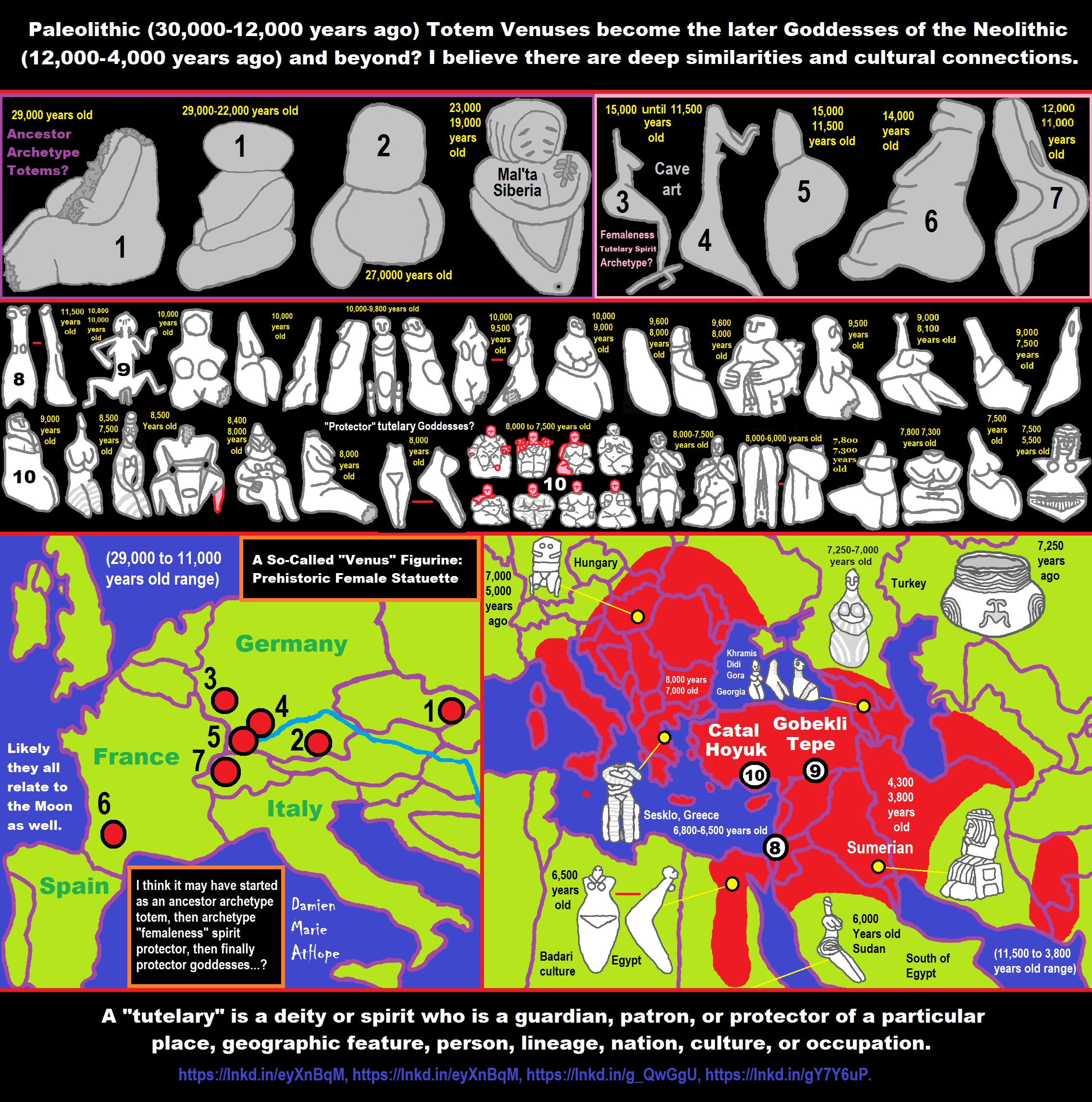
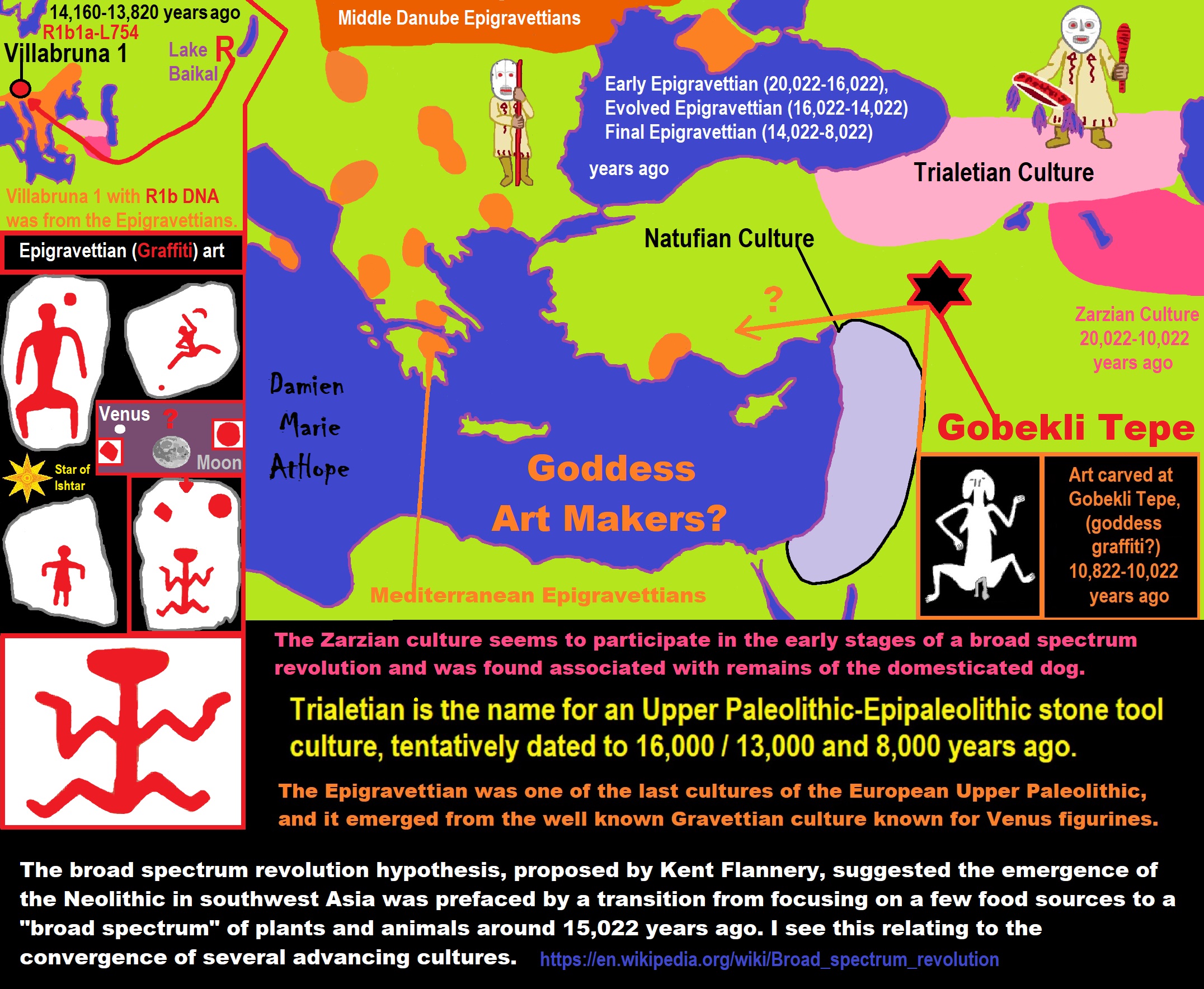
ref, ref, ref, ref, ref, ref, ref, ref, ref, ref, ref, ref, ref, ref, ref
Trialetian peoples which I think we’re more male-centric and involved in the creation of Göbekli Tepe, from its start around Pre-Pottery Neolithic A (12,000 – 10,800 years ago) began with their influence and this is seen in animal deities many clearly male and the figures also being expressively male themed as well at first, and only around Pre-Pottery Neolithic B (10,800 – 8,500 years ago) or so it seems with what I am guessing is new Epigravettian peoples with a more female-centric style (reminiscent but less than the Gravettians known for Venus figurines) influence from migration into the region, to gain new themes that add a female element both with A totem pole seeming to express birth or something similar and graffiti of a woman either ready for sex or giving birth or both. and Other bare figures seem to show a similar body position reminiscent of the graffiti of a woman.
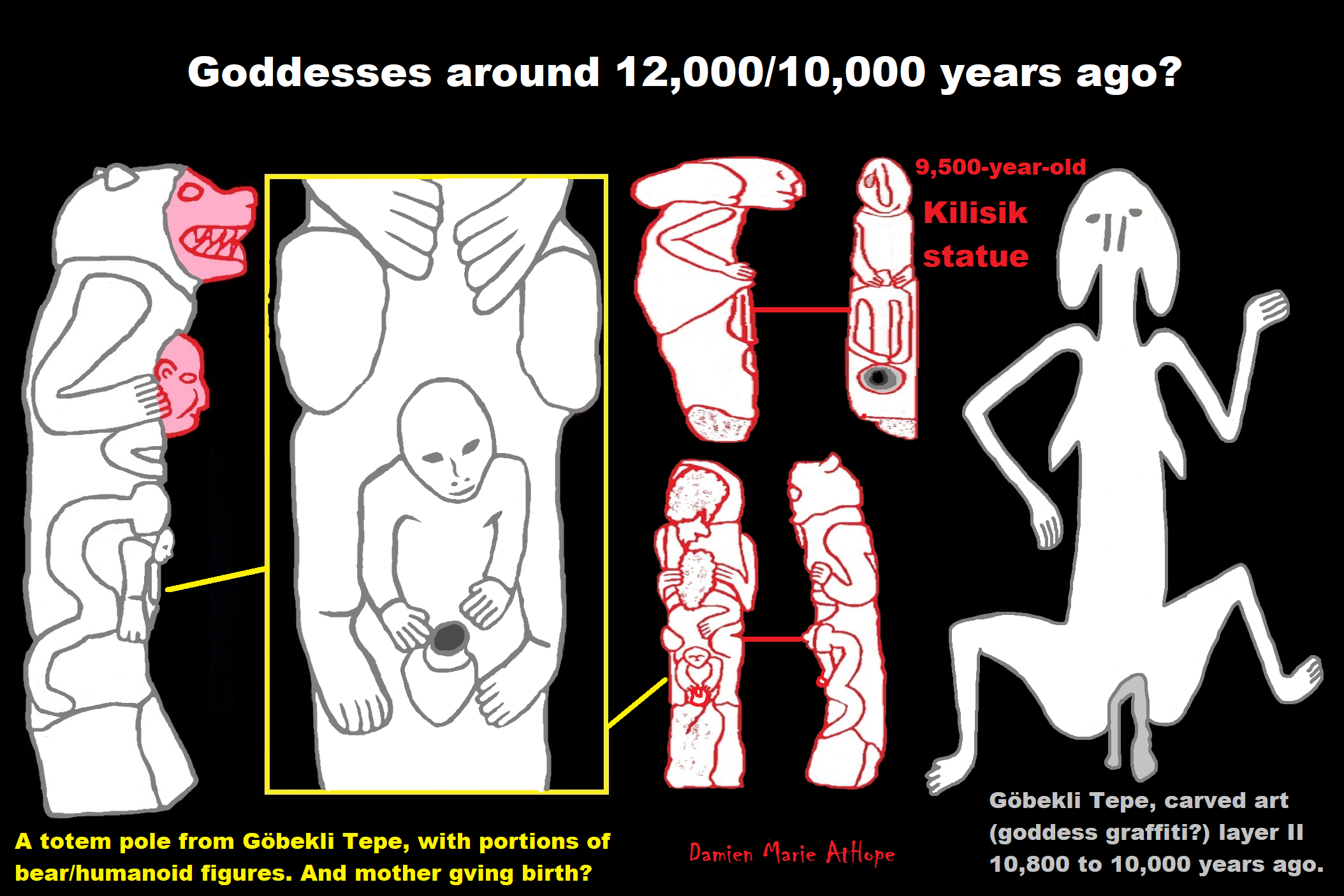
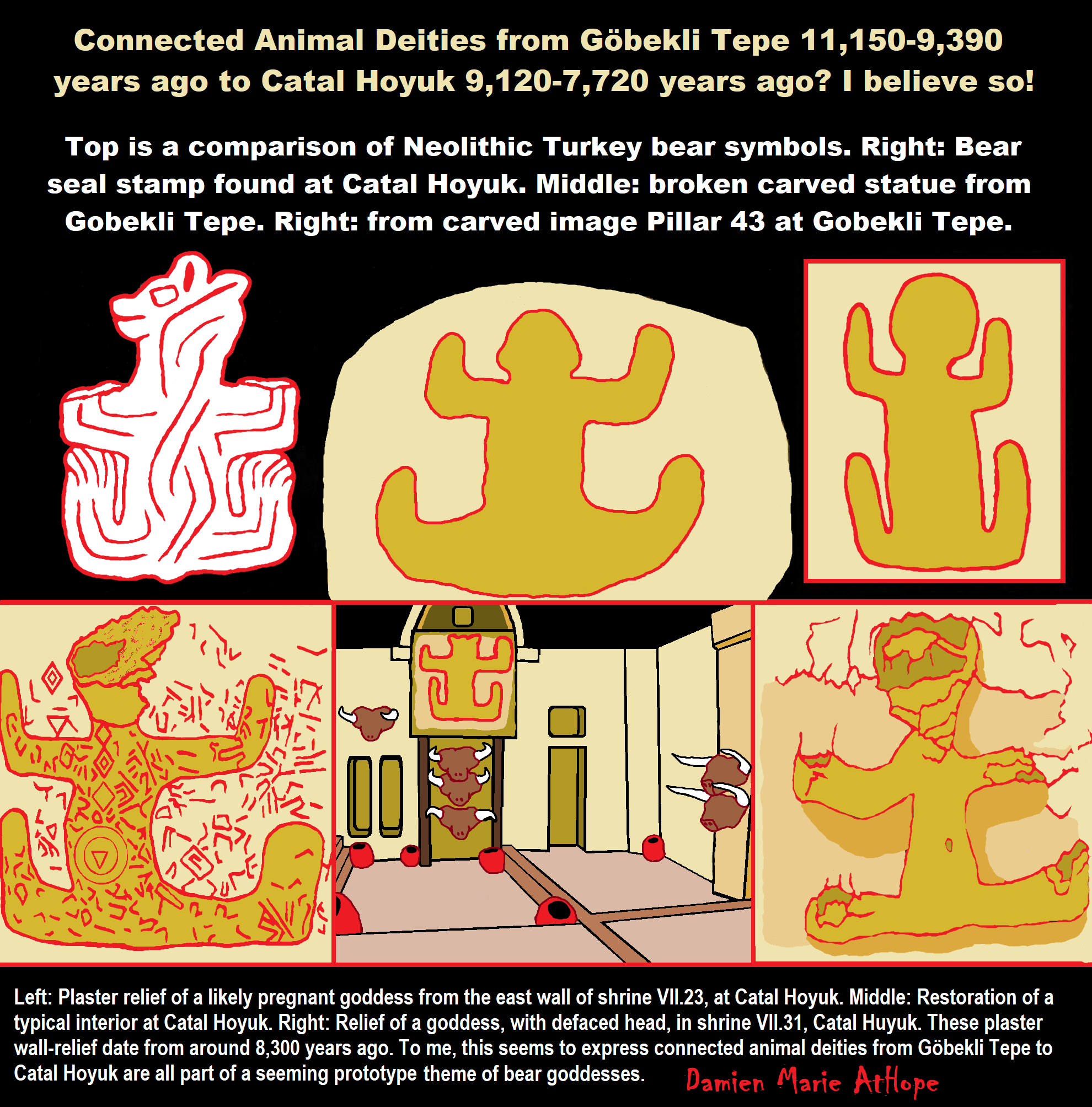
ref, ref, ref, ref, ref, ref, ref
Bear worship
“Bear worship (also known as the bear cult or arctolatry) is the religious practice of the worshipping of bears found in many North Eurasian ethnic religions such as among the Sami, Nivkh, Ainu, Basques, Germanic peoples, Slavs, and Finns. There are also a number of deities from Celtic Gaul and Britain associated with the bear, and the Dacians, Thracians, and Getians were noted to worship bears and annually celebrate the bear dance festival. The bear is featured on many totems throughout northern cultures that carve them. Bears were the most worshipped animals of Ancient Slavs. During pagan times, it was associated with the god Volos, the patron of domestic animals. Eastern Slavic folklore describes the bear as a totem personifying a male: father, husband, or a fiancé. Legends about turnskin bears appeared, it was believed that humans could be turned into bears for misbehavior.” ref
“Bears in Korean mythology, According to legend, Ungnyeo (literally “bear woman”) was a bear who turned into a woman, and gave birth to Dangun, the founder of the first Korean kingdom, Gojoseon. Bears were revered as motherly figures and as symbolic of patience. In Finnish paganism, the bear was considered a taboo animal and the word for “bear” (oksi) was a taboo word. Euphemisms such as mesikämmen “honey-hand” were used instead. Bear hunting and killing a bear was followed by a party called peijaiset with ceremony intended to show that the bear would be a “honored guest” instead of a slaughtered animal, and that its death was “accidental”, in order to not to anger the bear’s spirit. The skull of the bear was hung onto a tree, which was venerated as a totem.” ref
The bear festival is a religious festival celebrated by the indigenous Nivkh in Russia’s far east. A Nivkh shaman (ch’am) would preside over the Bear Festival, celebrated in the winter between January and February depending on the clan. Bears were captured and raised in a corral for several years by local women, treating the bear like a child. The bear is considered a sacred earthly manifestation of Nivkh ancestors and the gods in bear form. During the Festival, the bear is dressed in a specially made ceremonial costume and offered a banquet to take back to the realm of gods to show benevolence upon the clans. After the banquet, the bear is killed and eaten in an elaborate religious ceremony. The festival was arranged by relatives to honor the death of a kinsman. The bear’s spirit returns to the gods of the mountain ‘happy’ and rewards the Nivkh with bountiful forests. Generally, the Bear Festival was an inter-clan ceremony where a clan of wife-takers restored ties with a clan of wife-givers upon the broken link of the kinsman’s death. The Bear Festival was suppressed in the Soviet period; since then the festival has had a modest revival, albeit as a cultural rather than a religious ceremony.” ref
The Ainu people, who live on select islands in the Japanese archipelago, call the bear “kamuy” in their language, which translates to mean “god” similar to Kami. While many other animals are considered to be gods in the Ainu culture, the bear is the head of the gods. For the Ainu, when the gods visit the world of man, they don fur and claws and take on the physical appearance of an animal. Usually, however, when the term “kamuy” is used, it essentially means a bear. The Ainu people willingly and thankfully ate the bear as they believed that the disguise (the flesh and fur) of any god was a gift to the home that the god chose to visit. While on Earth – the world of man – the Ainu believed that the gods appeared in the form of animals. The gods had the capability of taking human form, but they only took this form in their home, the country of the gods, which is outside the world of man. To return a god back to his country, the people would sacrifice and eat the animal sending the god’s spirit away with civility. This ritual is called Omante and usually involves a deer or adult bear.” ref
“Kami (Japanese: are the deities, divinities, spirits, phenomena, or “holy powers”), that are venerated in the religion of Shinto. They can be elements of the landscape, forces of nature, or beings and the qualities that these beings express; they can also be the spirits of venerated dead people. Many kami are considered the ancient ancestors of entire clans (some ancestors became kami upon their death if they were able to embody the values and virtues of kami in life).” ref
“Omante occurred when the people sacrificed an adult bear, but when they caught a bear cub they performed a different ritual which is called Iomante, in the Ainu language, or Kumamatsuri in Japanese. Kumamatsuri translates to “bear festival” and Iomante means “sending off”. The event of Kumamatsuri began with the capture of a young bear cub. As if he was a child given by the gods, the cub was fed human food from a carved wooden platter and was treated better than Ainu children for they thought of him as a god. If the cub was too young and lacked the teeth to properly chew food, a nursing mother will let him suckle from her own breast. When the cub reaches 2–3 years of age, the cub is taken to the altar and then sacrificed. Usually, Kumamatsuri occurs in midwinter when the bear meat is the best from the added fat. The villagers will shoot it with both normal and ceremonial arrows, make offerings, dance, and pour wine on top of the cub corpse. The words of sending off for the bear god are then recited. This festival lasts for three days and three nights to properly return the bear god to his home.” ref
Bear Goddesses and Gods Across Ancient Cultures
“Gods and goddesses of the ancient world held a connection with certain animals. This is because our ancestors’ beliefs were animistic – they believed everything on earth had consciousness. Wildlife was sacred in ancient times. The bear is one of the most powerful and most feared of the animal kingdom. Dating back thousands of years, the people of Europe left their marks on cave walls—some of these drawings were of bears. Moreover, shamans have revered the bear for its power, but also for its motherhood qualities and healing abilities. Bear medicine is strong medicine. It’s no wonder ancient gods and goddesses were connected to the bear. Learn of the bear goddesses and a bear god here.” ref
The Greek Bear Goddesses
“The typical illustration of Artemis, Greek Goddess of the Hunt, depicts her with either a hunting dog or stag. However, one of Artemis’ most sacred animals was the bear. Artemis had domain over the forest and all wildlife within it. The bear was the largest and most powerful animal, and so Artemis found it to be a special animal. Any time a bear was killed by the Greeks, Artemis would lay a plague on the people as punishment. Artemis’ cult spread over Greece. In Brauron, young girls played she-bears in honor of Artemis and as a preparation for motherhood. They wore bear masks and acted wildly in worship of her. Artemis’ name is theorized to have meant bear-sanctuary. If we break it down—art is close to ark which means bear, and temis is close to temnis which means sanctuary. We will see in the next section how another Goddess’ name reflects this etymology.” ref
“Another close association between Artemis and bears is in the tale of one of Artemis’ followers named Callisto. Callisto was a nymph (demi-god nature spirit), and as followers of Artemis, women were charged to stay chaste and pure from men. Callisto was lured into having relations with Zeus, who impregnated her. When Artemis found out, she changed Callisto into a bear. Other versions say Athena was angered when Zeus impregnated the nymph and so she turned Callisto into a bear. The constellations Ursa Major and Ursa Minor (known to the Greeks as Arktos—bear) are said to be the soul remnants of Callisto and her son, and were placed in the sky by Zeus himself.” ref
Celtic Bear Goddess
“We don’t know a lot about Artio, the Bear Goddess of the ancient Celtic-Gauls, but we know she was intimately connected to bears. The few pieces of evidence we have of her cult’s existence were found in Switzerland and southern Germany. A bronze statue depicting Artio feeding a giant bear surfaced in Bern, Switzerland. Scholars say Artio feeds the bear with a bowl of fruit in her lap. But could it be the other way around? It seems to me the goddess is being confronted by the bear and she is not backing down. There was once a great tale about this encounter, I am sure; however, over time the lore of Artio has been lost. The inscription on the Bern statue translates to “for the goddess Artio”. As with Artemis’ name, there is a clear link to the bear in Artio’s name. Art translates to bear in Gaulish. Could Artio, the Bear Goddess of the Gauls, be the same goddess as the Greeks’ bear goddess Artemis?” ref
Hungarian Bear Goddess
“Much of what we know of the Hungarian Bear Goddess Ildiko has been lost in time, or perhaps is just not readily accessible by my research methods. However, according to the Encyclopedia of Spirits by Judika Iles, Ildiko was a goddess of the forest and wildlife. One of her most sacred animals was the bear. Ildiko was like Artemis – she was the goddess of the hunt but also a protector of forest animals. This is because of the need for balance—she guides the hunters but also protects animals in need of preservation or honor. Ildiko is a common name in Hungary with a Germanic origin meaning “warrior”. We can see how a warrior goddess would also be keen of bears—power, wisdom, and ferocity.” ref
Finnish Bear Goddess
“Above all, Mielikki is a healing goddess of Finland. She is associated with the woods and with wildlife, just as Artemis and Ildiko, but her main attribute is her healing abilities. She heals the animals when they are sick or wounded. This corresponds directly with the medicine of the bear. Shamans know bears to be healers, and so Mielikki is like the bear in this way. Mielikki is one of the bear goddesses who had a part in the creation of the bear. The story goes that Mielikki left earth and traveled into space, past the moon, in search of the materials with which to make the perfect animal. She returned and stitched together the materials from the heavens to make the bear. The bear is Mielikki’s favorite animal, above all. The tale of Mielikki going into space to find the materials to make the bear correlates nicely with the tales of the other Bear Goddesses Artemis, Callisto, and Zeus putting Callisto into the sky to make the Ursa Major and Minor constellations. There is an asteroid and a mountain on the planet Venus named for Mielikki.” ref
Slavs and the bear worship
“Bear was one of the most worshipped animals among the ancient Slavic tribes. It was connected to the god Volos, who was the protector of animals and wilderness. In Slavic folklore, the bear is usually depicted as a male, either as a father, husband or groom.” ref
Norse or Germanic pagans Odin: The All-Father and Bear God
“Odin is a popular god among Norse and Germanic pagans and his cult has spread to nearly every part of the modern world. He is known as the All-Father, the One-Eyed, and the terrifying one. He is a wise, yet powerful god and knows how to win a battle. Because of this, warriors and magicians of ancient times sought Odin for his knowledge and ferocity. When depicted, he is usually illustrated as an old man with white hair and beard, cloaked, and carrying a staff. One of his eyes is missing, a sacrifice Odin made to tap into the wisdom of the well of Urðr. Odin is almost always flanked by two of his totem animals—ravens and wolves. However, some claim Odin may also be guarded by two great bears. I’ve yet to find solid evidence of this claim; however, this could be in part because of Odin’s association with the berserkers (shaman warriors) who often wore the pelts of bears. Either way, a god of war, wisdom, healing, and trickery such as Odin would be well received as a friend of the bear.” ref

Seated Woman of Çatalhöyük
“The Seated Woman of Çatalhöyük (also Çatal Höyük) is a baked-clay, nude female form, seated between feline-headed arm-rests. It is generally thought to depict a corpulent and fertile Mother goddess in the process of giving birth while seated on her throne, which has two hand rests in the form of feline (lioness, leopard, or panther) heads in a Mistress of Animals motif. The statuette, one of several iconographically similar ones found at the site, is associated to other corpulent prehistoric goddess figures, of which the most famous is the Venus of Willendorf. It is a neolithic sculpture shaped by an unknown artist, and was completed in approximately 6000 BCE.” ref
Kubaba
“Kubaba is the only queen on the Sumerian King List, which states she reigned for 100 years – roughly in the Early Dynastic III period (ca. 2500–2330 BCE) of Sumerian history. A connection between her and a goddess known from Hurro–Hittite and later Luwian sources cannot be established on the account of spatial and temporal differences. Kubaba is one of very few women to have ever ruled in their own right in Mesopotamian history. Most versions of the king list place her alone in her own dynasty, the 3rd Dynasty of Kish, following the defeat of Sharrumiter of Mari, but other versions combine her with the 4th dynasty, that followed the primacy of the king of Akshak. Before becoming monarch, the king list says she was an alewife, brewess or brewster, terms for a woman who brewed alcohol.” ref
“Kubaba was a Syrian goddess associated particularly closely with Alalakh and Carchemish. She was adopted into the Hurrian and Hittite pantheons as well. After the fall of the Hittite empire, she continued to be venerated by Luwians. A connection between her and the similarly named legendary Sumerian queen Kubaba of Kish, while commonly proposed, cannot be established due to spatial and temporal differences. Emmanuel Laroche proposed in 1960 that Kubaba and Cybele were one and the same. This view is supported by Mark Munn, who argues that the Phrygian name Kybele developed from Lydian adjective kuvavli, first changed into kubabli and then simplified into kuballi, and finally kubelli. However, such an adjective is a purely speculative construction.” ref
Cybele
“Cybele (Phrygian: “Kubileya/Kubeleya Mother”, perhaps “Mountain Mother”) is an Anatolian mother goddess; she may have a possible forerunner in the earliest neolithic at Çatalhöyük, where statues of plump women, sometimes sitting, have been found in excavations. Phrygia‘s only known goddess, she was probably its national deity. Greek colonists in Asia Minor adopted and adapted her Phrygian cult and spread it to mainland Greece and to the more distant western Greek colonies around the 6th century BCE. In Greece, Cybele met with a mixed reception. She became partially assimilated to aspects of the Earth-goddess Gaia, of her possibly Minoan equivalent Rhea, and of the harvest–mother goddess Demeter. Some city-states, notably Athens, evoked her as a protector, but her most celebrated Greek rites and processions show her as an essentially foreign, exotic mystery-goddess who arrives in a lion-drawn chariot to the accompaniment of wild music, wine, and a disorderly, ecstatic following.” ref
“Uniquely in Greek religion, she had a eunuch mendicant priesthood. Many of her Greek cults included rites to a divine Phrygian castrate shepherd-consort Attis, who was probably a Greek invention. In Greece, Cybele became associated with mountains, town and city walls, fertile nature, and wild animals, especially lions. In Rome, Cybele became known as Magna Mater (“Great Mother”). The Roman State adopted and developed a particular form of her cult after the Sibylline oracle in 205 BCE recommended her conscription as a key religious ally in Rome’s second war against Carthage (218 to 201 BCE). Roman mythographers reinvented her as a Trojan goddess, and thus an ancestral goddess of the Roman people by way of the Trojan prince Aeneas. As Rome eventually established hegemony over the Mediterranean world, Romanized forms of Cybele’s cults spread throughout Rome’s empire. Greek and Roman writers debated and disputed the meaning and morality of her cults and priesthoods, which remain controversial subjects in modern scholarship.” ref
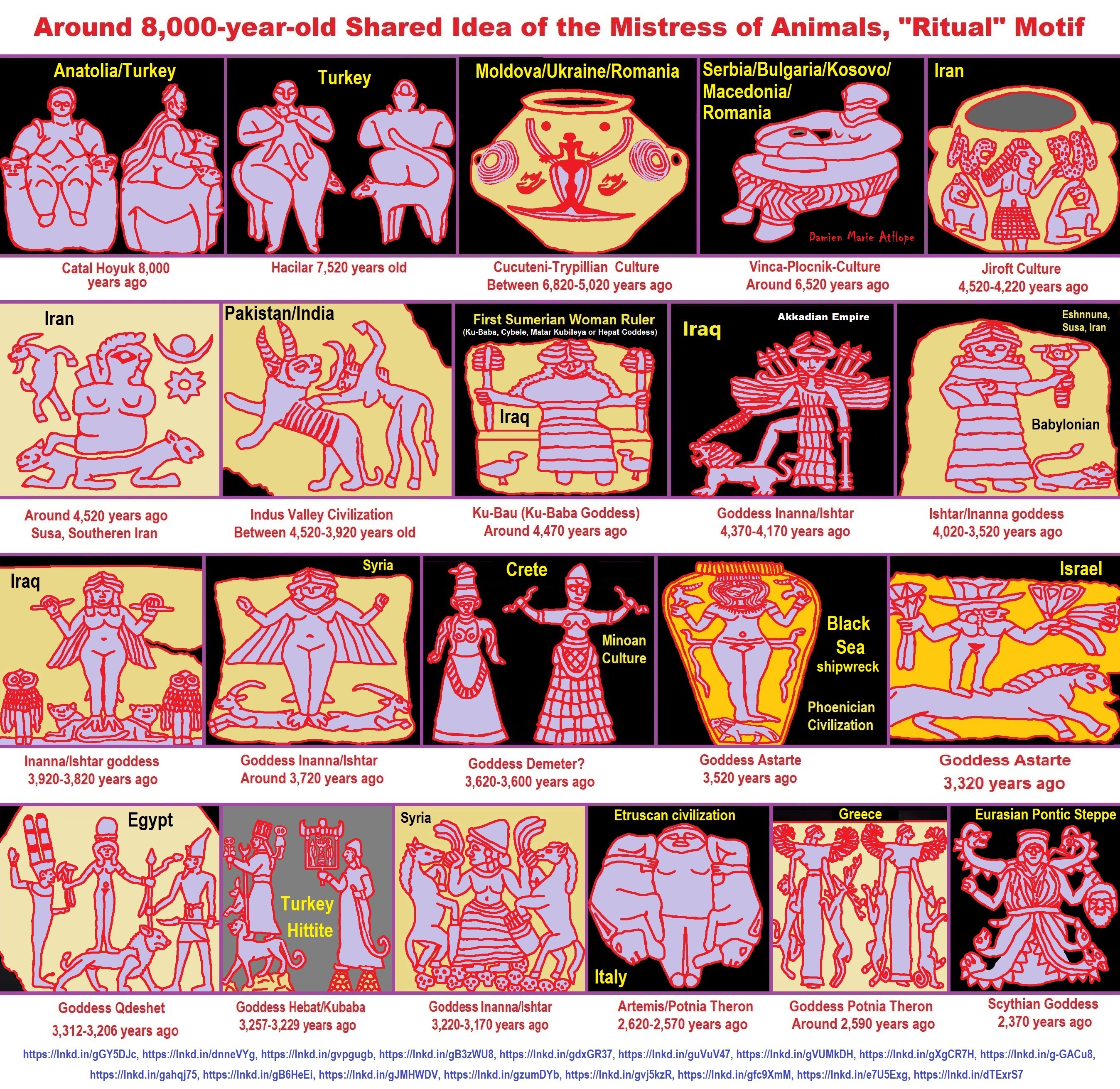

ref, ref, ref, ref, ref, ref, ref, ref, ref, ref, ref, ref, ref, ref, ref, ref, ref, ref, ref
Here are my thoughts/speculations on where I believe is the possible origin of shamanism, which may have begun sometime around 35,000 to 30,000 years ago seen in the emergence of the Gravettian culture, just to outline his thinking, on what thousands of years later led to evolved Asian shamanism, in general, and thus WU shamanism as well. In both Europe-related “shamanism-possible burials” and in Gravettian mitochondrial DNA is a seeming connection to Haplogroup U. And the first believed Shaman proposed burial belonged to Eastern Gravettians/Pavlovian culture at Dolní Věstonice in southern Moravia in the Czech Republic, which is the oldest permanent human settlement that has ever been found. It is at Dolní Věstonice where approximately 27,000-25,000 years ago a seeming female shaman was buried and also there was an ivory totem portrait figure, seemingly of her.
And my thoughts on how cultural/ritual aspects were influenced in the area of Göbekli Tepe. I think it relates to a few different cultures starting in the area before the Neolithic. Two different groups of Siberians first from northwest Siberia with U6 haplogroup 40,000 to 30,000 or so. Then R Haplogroup (mainly haplogroup R1b but also some possible R1a both related to the Ancient North Eurasians). This second group added its “R1b” DNA of around 50% to the two cultures Natufian and Trialetian. To me, it is likely both of these cultures helped create Göbekli Tepe. Then I think the female art or graffiti seen at Göbekli Tepe to me possibly relates to the Epigravettians that made it into Turkey and have similar art in North Italy. I speculate that possibly the Totem pole figurines seen first at Kostenki, next went to Mal’ta in Siberia as seen in their figurines that also seem “Totem-pole-like”, and then with the migrations of R1a it may have inspired the Shigir idol in Russia and the migrations of R1b may have inspired Göbekli Tepe.
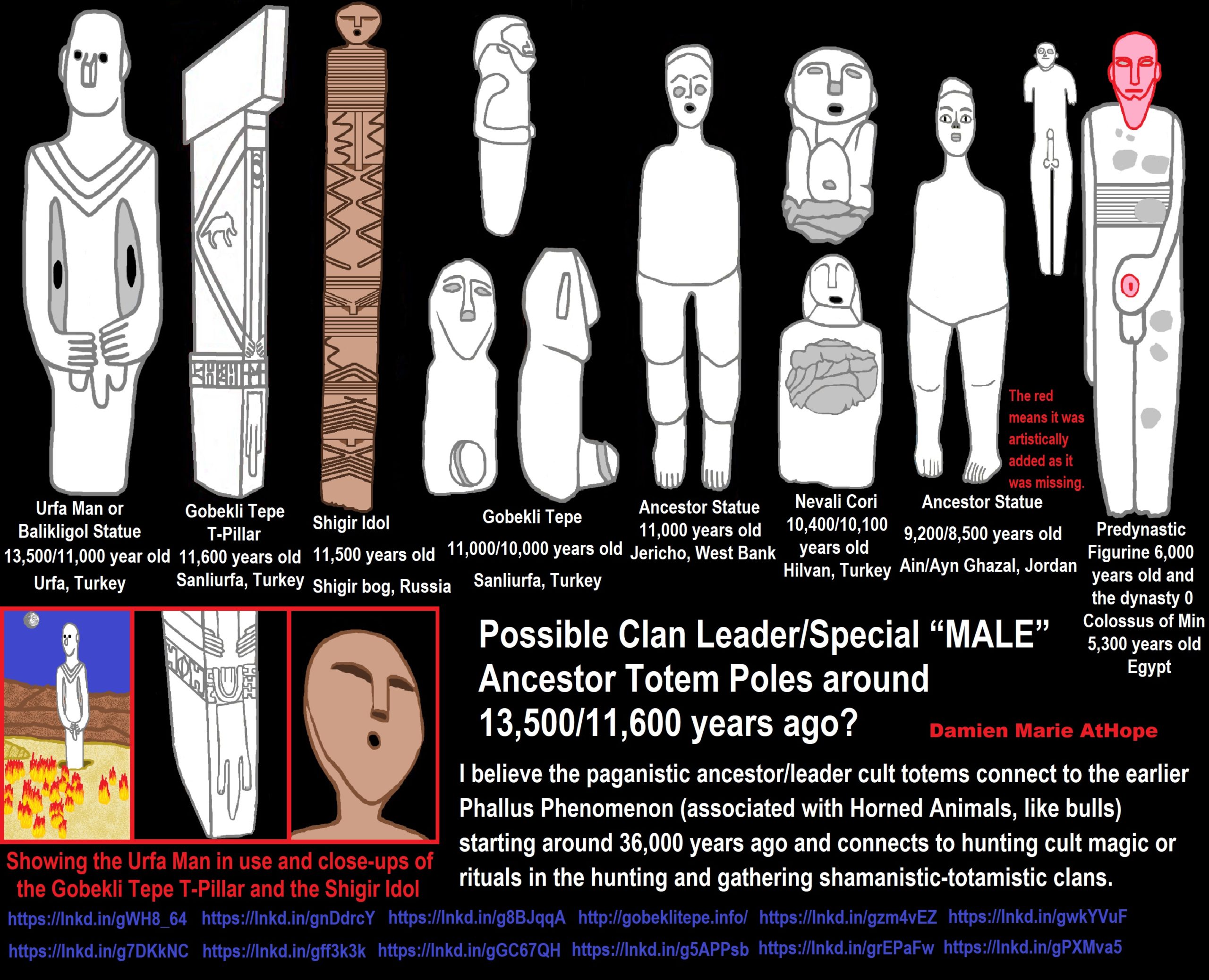
ref, ref, ref, ref, ref, ref, ref, ref, ref, ref, ref, ref, ref
I believe the paganistic ancestor/leader cult totems connect to the earlier Phallus Phenomenon (associated with Horned Animals, like bulls) starting around 36,000 years ago and connects to hunting cult magic or rituals in the hunting and gathering shamanistic-totamistic clans.
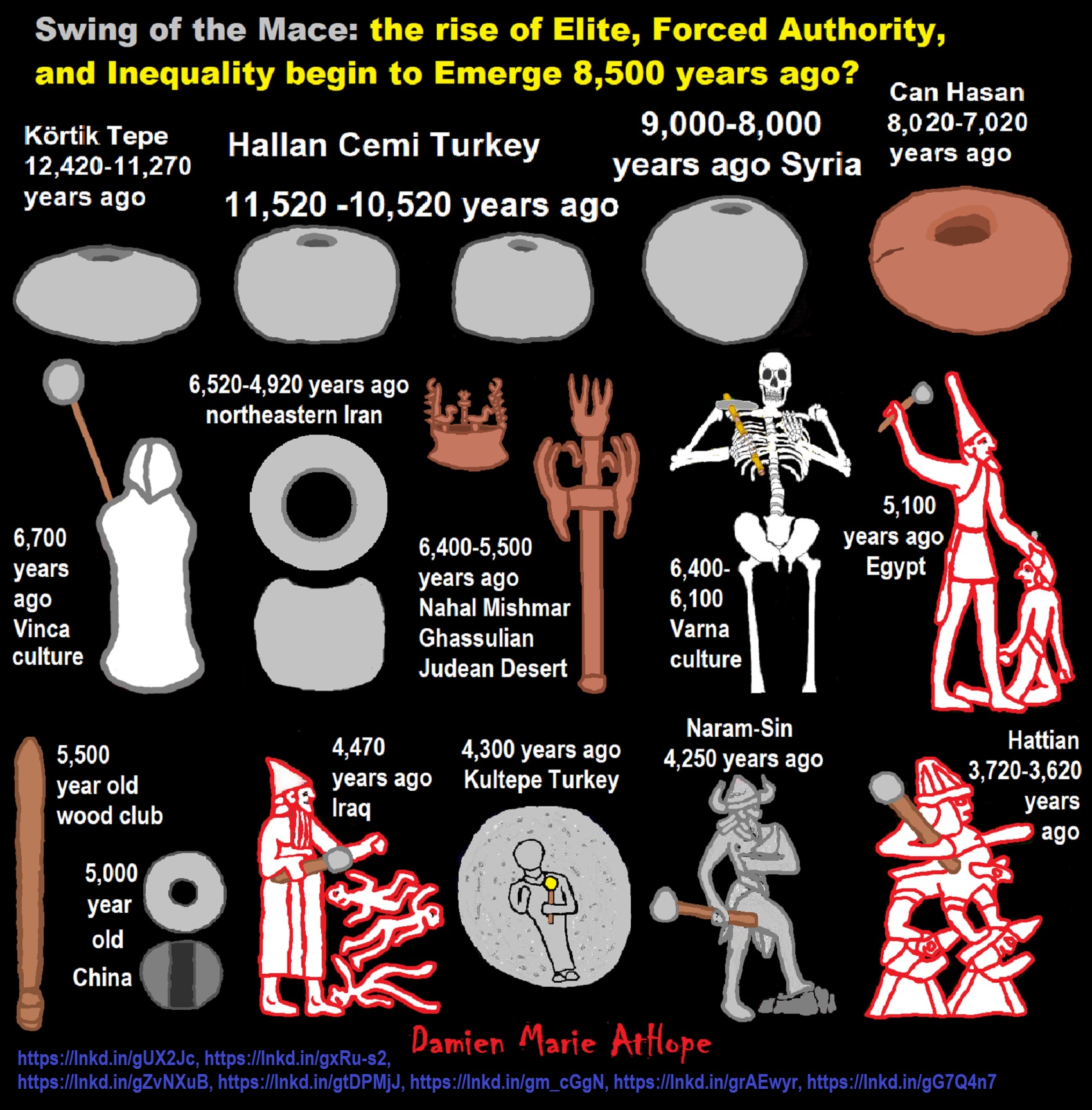

ref, ref, ref, ref, ref, ref, ref, ref, ref, ref, ref, ref, ref, ref, ref, ref, ref, ref, ref, ref, ref, ref, ref, ref, ref, ref, ref, ref, ref, ref, ref, ref, ref, ref, ref, ref, ref, ref, ref, ref, ref, ref, ref, ref, ref, ref, ref, ref, ref, ref, ref, ref, ref, ref, ref, ref, ref, ref, ref, ref, ref, ref, ref, ref, ref, ref, ref, ref, ref, ref, ref, ref, ref, ref, ref, ref, ref, ref, ref, ref, ref, ref, ref, ref, ref, ref, ref, ref, ref, ref
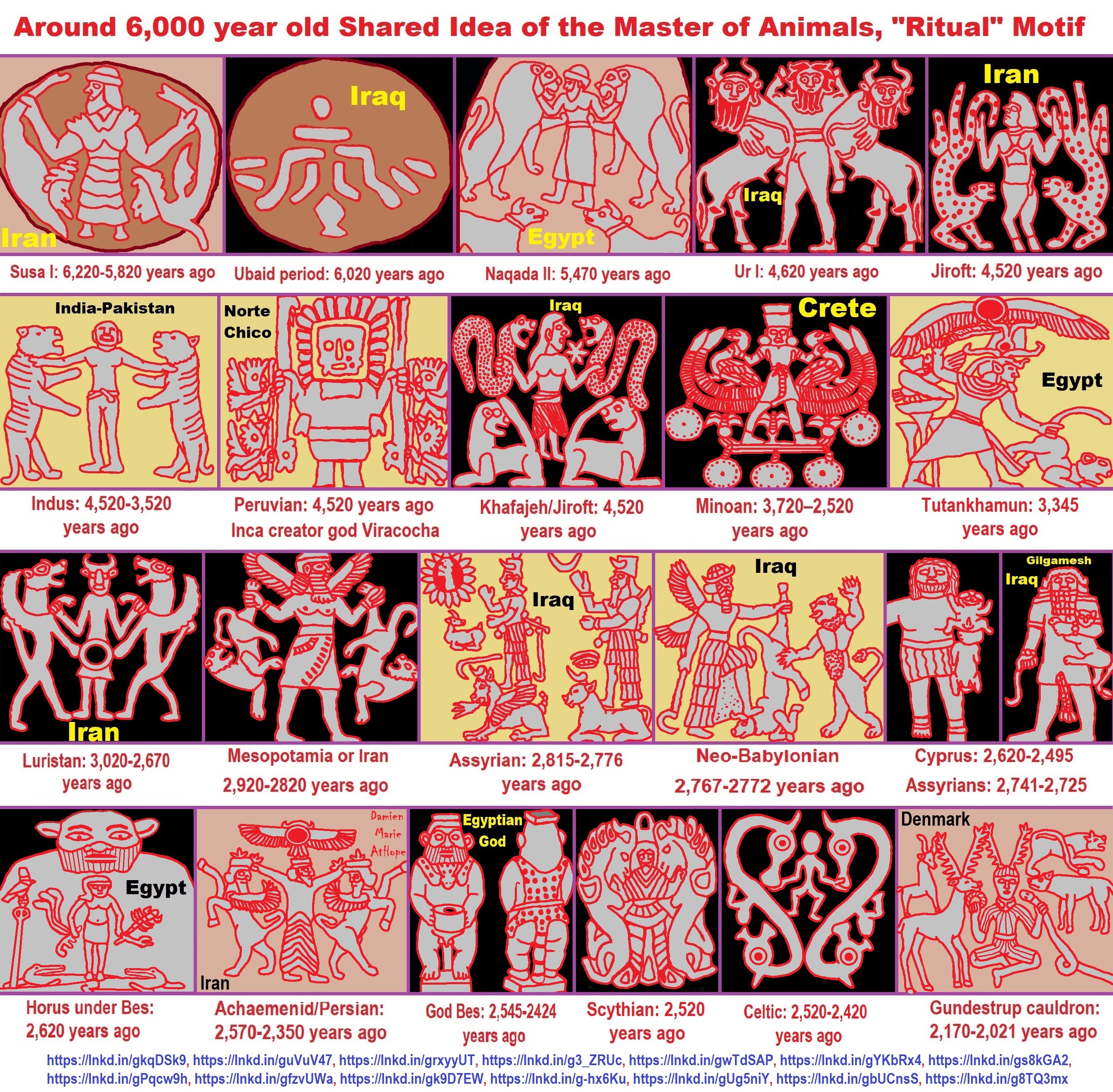
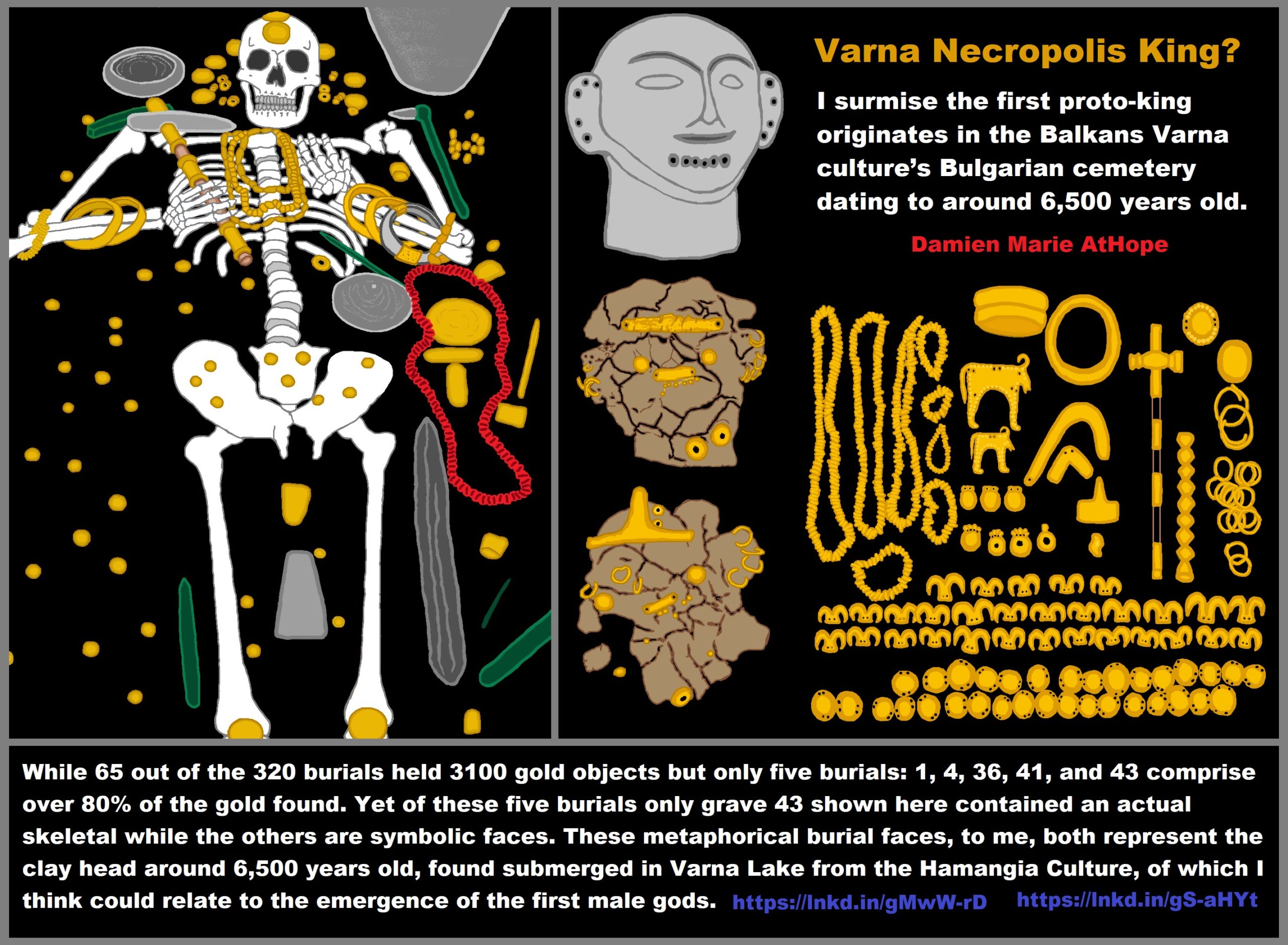
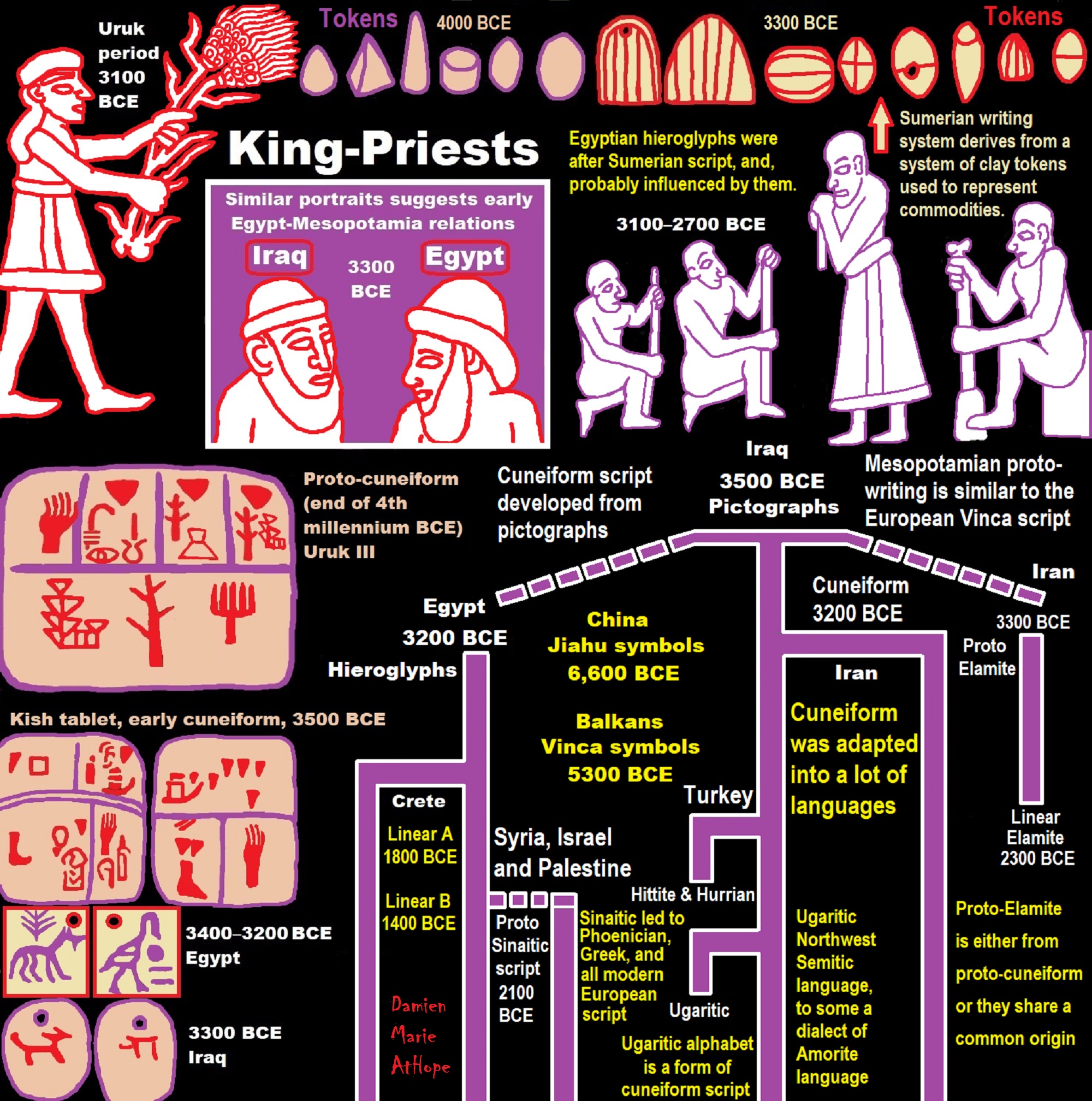
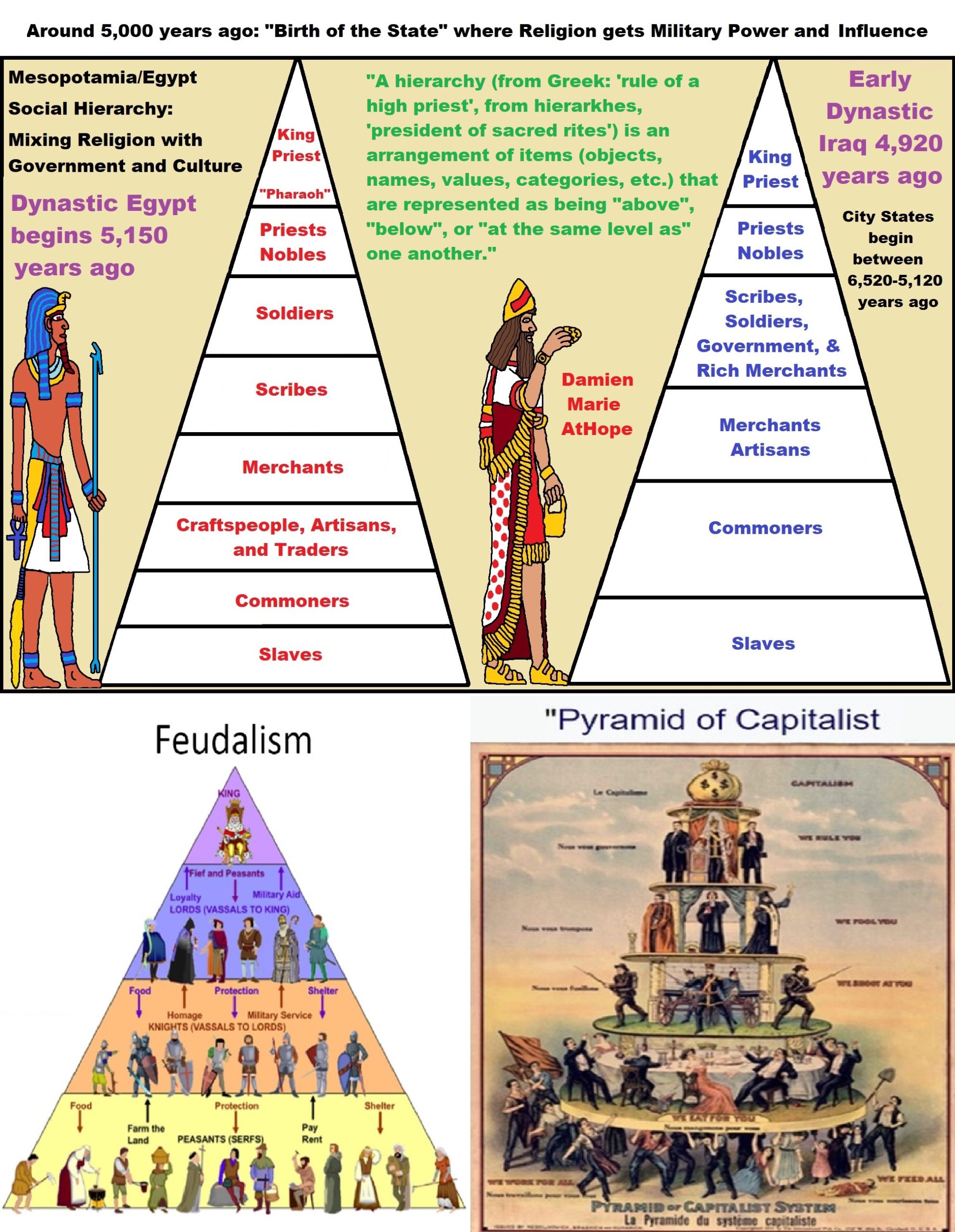
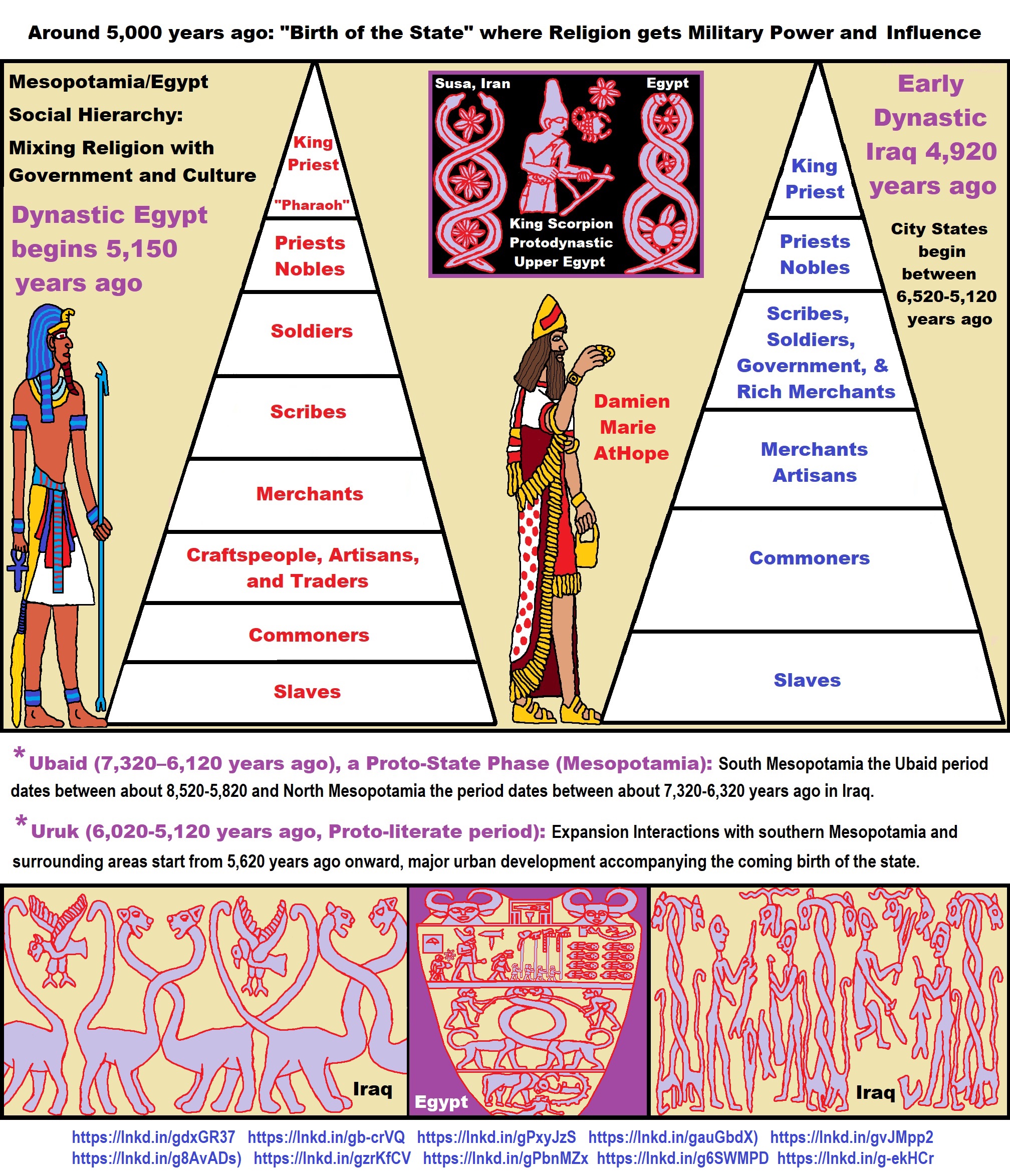

People don’t commonly teach religious history, even that of their own claimed religion. No, rather they teach a limited “pro their religion” history of their religion from a religious perspective favorable to the religion of choice.

Do you truly think “Religious Belief” is only a matter of some personal choice?
Do you not see how coercive one’s world of choice is limited to the obvious hereditary belief, in most religious choices available to the child of religious parents or caregivers? Religion is more commonly like a family, culture, society, etc. available belief that limits the belief choices of the child and that is when “Religious Belief” is not only a matter of some personal choice and when it becomes hereditary faith, not because of the quality of its alleged facts or proposed truths but because everyone else important to the child believes similarly so they do as well simply mimicking authority beliefs handed to them. Because children are raised in religion rather than being presented all possible choices but rather one limited dogmatic brand of “Religious Belief” where children only have a choice of following the belief as instructed, and then personally claim the faith hereditary belief seen in the confirming to the belief they have held themselves all their lives. This is obvious in statements asked and answered by children claiming a faith they barely understand but they do understand that their family believes “this or that” faith, so they feel obligated to believe it too. While I do agree that “Religious Belief” should only be a matter of some personal choice, it rarely is… End Hereditary Religion!
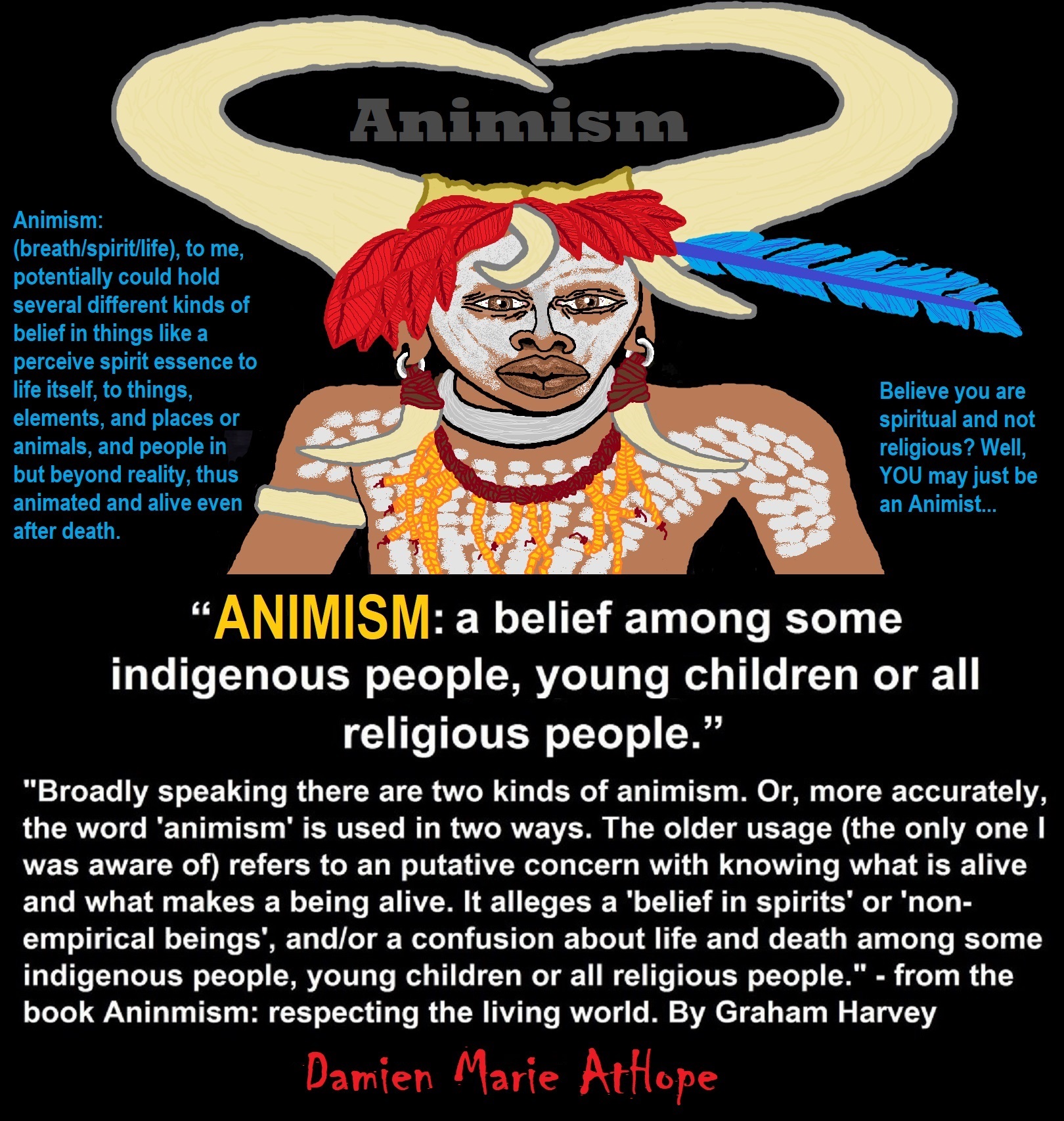
Animism: Respecting the Living World by Graham Harvey
“How have human cultures engaged with and thought about animals, plants, rocks, clouds, and other elements in their natural surroundings? Do animals and other natural objects have a spirit or soul? What is their relationship to humans? In this new study, Graham Harvey explores current and past animistic beliefs and practices of Native Americans, Maori, Aboriginal Australians, and eco-pagans. He considers the varieties of animism found in these cultures as well as their shared desire to live respectfully within larger natural communities. Drawing on his extensive casework, Harvey also considers the linguistic, performative, ecological, and activist implications of these different animisms.” ref
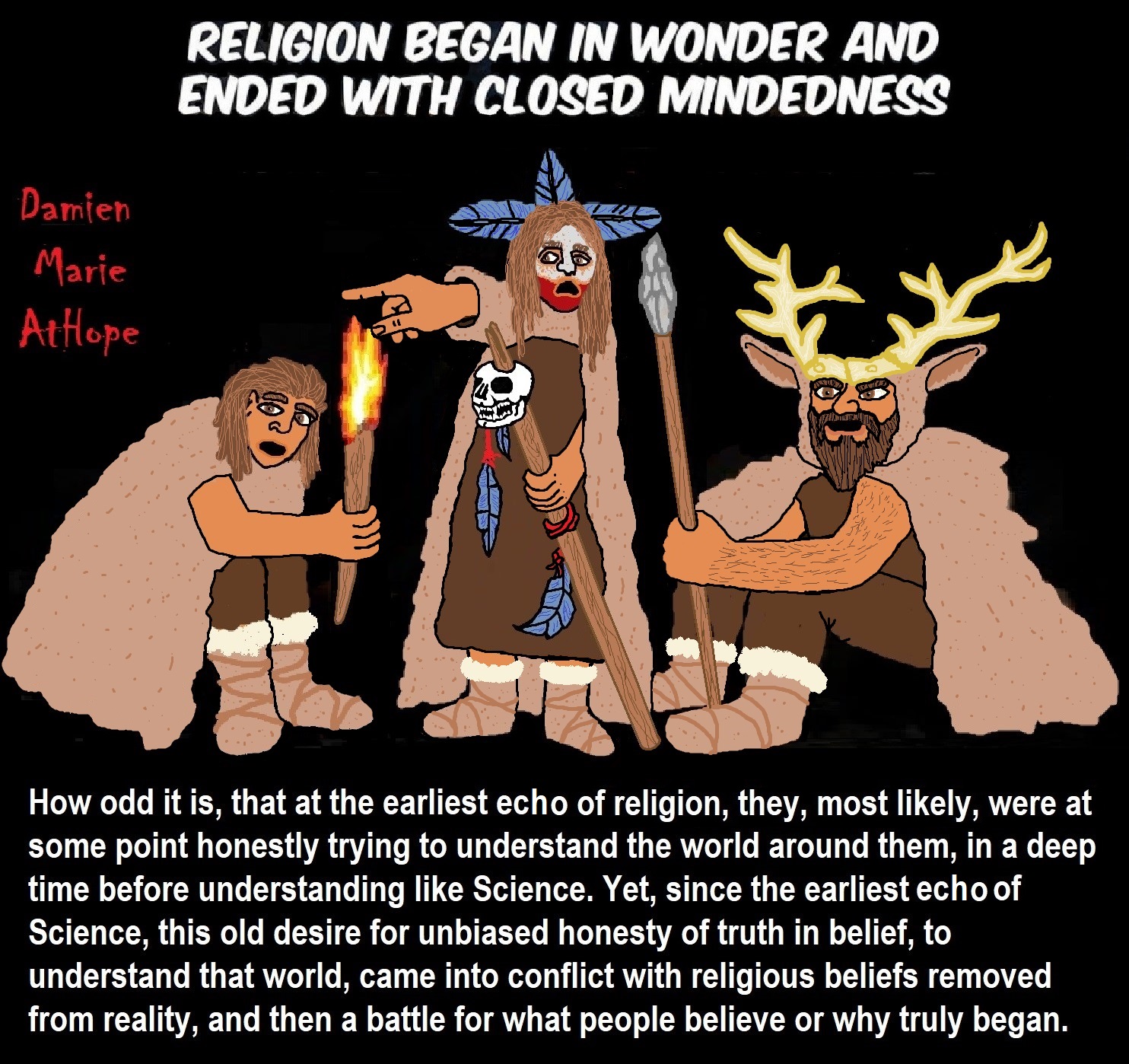
We are like believing machines we vacuum up ideas, like Velcro sticks to almost everything. We accumulate beliefs that we allow to negatively influence our lives, often without realizing it. Our willingness must be to alter skewed beliefs that impend our balance or reason, which allows us to achieve new positive thinking and accurate outcomes.

My thoughts on Religion Evolution with external links for more info:
- (Pre-Animism Africa mainly, but also Europe, and Asia at least 300,000 years ago), (Pre-Animism – Oxford Dictionaries)
- (Animism Africa around 100,000 years ago), (Animism – Britannica.com)
- (Totemism Europe around 50,000 years ago), (Totemism – Anthropology)
- (Shamanism Siberia around 30,000 years ago), (Shamanism – Britannica.com)
- (Paganism Turkey around 12,000 years ago), (Paganism – BBC Religion)
- (Progressed Organized Religion “Institutional Religion” Egypt around 5,000 years ago), (Ancient Egyptian Religion – Britannica.com)
- (CURRENT “World” RELIGIONS after 4,000 years ago) (Origin of Major Religions – Sacred Texts)
- (Early Atheistic Doubting at least by 2,600 years ago) (History of Atheism – Wikipedia)
“Religion is an Evolved Product” and Yes, Religion is Like Fear Given Wings…
Atheists talk about gods and religions for the same reason doctors talk about cancer, they are looking for a cure, or a firefighter talks about fires because they burn people and they care to stop them. We atheists too often feel a need to help the victims of mental slavery, held in the bondage that is the false beliefs of gods and the conspiracy theories of reality found in religions.
Understanding Religion Evolution:
- Pre-Animism (at least 300,000 years ago)
- Animism (Africa: 100,000 years ago)
- Totemism (Europe: 50,000 years ago)
- Shamanism (Siberia: 30,000 years ago)
- Paganism (Turkey: 12,000 years ago)
- Progressed organized religion (Egypt: 5,000 years ago), (Egypt, the First Dynasty 5,150 years ago)
- CURRENT “World” RELIGIONS (after 4,000 years ago)
- Early Atheistic Doubting (at least by 2,600 years ago)
“An Archaeological/Anthropological Understanding of Religion Evolution”
It seems ancient peoples had to survived amazing threats in a “dangerous universe (by superstition perceived as good and evil),” and human “immorality or imperfection of the soul” which was thought to affect the still living, leading to ancestor worship. This ancestor worship presumably led to the belief in supernatural beings, and then some of these were turned into the belief in gods. This feeble myth called gods were just a human conceived “made from nothing into something over and over, changing, again and again, taking on more as they evolve, all the while they are thought to be special,” but it is just supernatural animistic spirit-belief perceived as sacred.
Quick Evolution of Religion?
Pre-Animism (at least 300,000 years ago) pre-religion is a beginning that evolves into later Animism. So, Religion as we think of it, to me, all starts in a general way with Animism (Africa: 100,000 years ago) (theoretical belief in supernatural powers/spirits), then this is physically expressed in or with Totemism (Europe: 50,000 years ago) (theoretical belief in mythical relationship with powers/spirits through a totem item), which then enlists a full-time specific person to do this worship and believed interacting Shamanism (Siberia/Russia: 30,000 years ago) (theoretical belief in access and influence with spirits through ritual), and then there is the further employment of myths and gods added to all the above giving you Paganism (Turkey: 12,000 years ago) (often a lot more nature-based than most current top world religions, thus hinting to their close link to more ancient religious thinking it stems from). My hypothesis is expressed with an explanation of the building of a theatrical house (modern religions development). Progressed organized religion (Egypt: 5,000 years ago) with CURRENT “World” RELIGIONS (after 4,000 years ago).
Historically, in large city-state societies (such as Egypt or Iraq) starting around 5,000 years ago culminated to make religion something kind of new, a sociocultural-governmental-religious monarchy, where all or at least many of the people of such large city-state societies seem familiar with and committed to the existence of “religion” as the integrated life identity package of control dynamics with a fixed closed magical doctrine, but this juggernaut integrated religion identity package of Dogmatic-Propaganda certainly did not exist or if developed to an extent it was highly limited in most smaller prehistoric societies as they seem to lack most of the strong control dynamics with a fixed closed magical doctrine (magical beliefs could be at times be added or removed). Many people just want to see developed religious dynamics everywhere even if it is not. Instead, all that is found is largely fragments until the domestication of religion.
Religions, as we think of them today, are a new fad, even if they go back to around 6,000 years in the timeline of human existence, this amounts to almost nothing when seen in the long slow evolution of religion at least around 70,000 years ago with one of the oldest ritual worship. Stone Snake of South Africa: “first human worship” 70,000 years ago. This message of how religion and gods among them are clearly a man-made thing that was developed slowly as it was invented and then implemented peace by peace discrediting them all. Which seems to be a simple point some are just not grasping how devastating to any claims of truth when we can see the lie clearly in the archeological sites.
I wish people fought as hard for the actual values as they fight for the group/clan names political or otherwise they think support values. Every amount spent on war is theft to children in need of food or the homeless kept from shelter.
Here are several of my blog posts on history:
- To Find Truth You Must First Look
- (Magdalenian/Iberomaurusian) Connections to the First Paganists of the early Neolithic Near East Dating from around 17,000 to 12,000 Years Ago
- Natufians: an Ancient People at the Origins of Agriculture and Sedentary Life
- Possible Clan Leader/Special “MALE” Ancestor Totem Poles At Least 13,500 years ago?
- Jewish People with DNA at least 13,200 years old, Judaism, and the Origins of Some of its Ideas
- Baltic Reindeer Hunters: Swiderian, Lyngby, Ahrensburgian, and Krasnosillya cultures 12,020 to 11,020 years ago are evidence of powerful migratory waves during the last 13,000 years and a genetic link to Saami and the Finno-Ugric peoples.
- The Rise of Inequality: patriarchy and state hierarchy inequality
- Fertile Crescent 12,500 – 9,500 Years Ago: fertility and death cult belief system?
- 12,400 – 11,700 Years Ago – Kortik Tepe (Turkey) Pre/early-Agriculture Cultic Ritualism
- Ritualistic Bird Symbolism at Gobekli Tepe and its “Ancestor Cult”
- Male-Homosexual (female-like) / Trans-woman (female) Seated Figurine from Gobekli Tepe
- Could a 12,000-year-old Bull Geoglyph at Göbekli Tepe relate to older Bull and Female Art 25,000 years ago and Later Goddess and the Bull cults like Catal Huyuk?
- Sedentism and the Creation of goddesses around 12,000 years ago as well as male gods after 7,000 years ago.
- Alcohol, where Agriculture and Religion Become one? Such as Gobekli Tepe’s Ritualistic use of Grain as Food and Ritual Drink
- Neolithic Ritual Sites with T-Pillars and other Cultic Pillars
- Paganism: Goddesses around 12,000 years ago then Male Gods after 7,000 years ago
- First Patriarchy: Split of Women’s Status around 12,000 years ago & First Hierarchy: fall of Women’s Status around 5,000 years ago.
- Natufians: an Ancient People at the Origins of Agriculture and Sedentary Life
- J DNA and the Spread of Agricultural Religion (paganism)
- Paganism: an approximately 12,000-year-old belief system
- Paganism 12,000 years old: related to “Anarchism and Socialism” (Pre-Capitalism)
- Shaman burial in Israel 12,000 years ago and the Shamanism Phenomena
- Need to Mythicized: gods and goddesses
- 12,000 – 7,000 Years Ago – Paleo-Indian Culture (The Americas)
- 12,000 – 2,000 Years Ago – Indigenous-Scandinavians (Nordic)
- Norse did not wear helmets with horns?
- Pre-Pottery Neolithic Skull Cult around 11,500 to 8,400 Years Ago?
- 10,400 – 10,100 Years Ago, in Turkey the Nevail Cori Religious Settlement
- 9,000-6,500 Years Old Submerged Pre-Pottery/Pottery Neolithic Ritual Settlements off Israel’s Coast
- Catal Huyuk “first religious designed city” around 9,500 to 7,700 years ago (Turkey)
- Cultic Hunting at Catal Huyuk “first religious designed city”
- Special Items and Art as well as Special Elite Burials at Catal Huyuk
- New Rituals and Violence with the appearance of Pottery and People?
- Haplogroup N and its related Uralic Languages and Cultures
- Ainu people, Sámi people, Native Americans, the Ancient North Eurasians, and Paganistic-Shamanism with Totemism
- Ideas, Technology and People from Turkey, Europe, to China and Back again 9,000 to 5,000 years ago?
- First Pottery of Europe and the Related Cultures
- 9,000 years old Neolithic Artifacts Judean Desert and Hills Israel
- 9,000-7,000 years-old Sex and Death Rituals: Cult Sites in Israel, Jordan, and the Sinai
- 9,000-8500 year old Horned Female shaman Bad Dürrenberg Germany
- Neolithic Jewelry and the Spread of Farming in Europe Emerging out of West Turkey
- 8,600-year-old Tortoise Shells in Neolithic graves in central China have Early Writing and Shamanism
- Swing of the Mace: the rise of Elite, Forced Authority, and Inequality begin to Emerge 8,500 years ago?
- Migrations and Changing Europeans Beginning around 8,000 Years Ago
- My “Steppe-Anatolian-Kurgan hypothesis” 8,000/7,000 years ago
- Around 8,000-year-old Shared Idea of the Mistress of Animals, “Ritual” Motif
- Pre-Columbian Red-Paint (red ochre) Maritime Archaic Culture 8,000-3,000 years ago
- 7,522-6,522 years ago Linear Pottery culture which I think relates to Arcane Capitalism’s origins
- Arcane Capitalism: Primitive socialism, Primitive capital, Private ownership, Means of production, Market capitalism, Class discrimination, and Petite bourgeoisie (smaller capitalists)
- 7,500-4,750 years old Ritualistic Cucuteni-Trypillian culture of Moldova, Romania, and Ukraine
- Roots of a changing early society 7,200-6,700 years ago Jordan and Israel
- Agriculture religion (Paganism) with farming reached Britain between about 7,000 to 6,500 or so years ago and seemingly expressed in things like Western Europe’s Long Barrows
- My Thoughts on Possible Migrations of “R” DNA and Proto-Indo-European?
- “Millet” Spreading from China 7,022 years ago to Europe and related Language may have Spread with it leading to Proto-Indo-European
- Proto-Indo-European (PIE), ancestor of Indo-European languages: DNA, Society, Language, and Mythology
- The Dnieper–Donets culture and Asian varieties of Millet from China to the Black Sea region of Europe by 7,022 years ago
- Kurgan 6,000 years ago/dolmens 7,000 years ago: funeral, ritual, and other?
- 7,020 to 6,020-year-old Proto-Indo-European Homeland of Urheimat or proposed home of their Language and Religion
- Ancient Megaliths: Kurgan, Ziggurat, Pyramid, Menhir, Trilithon, Dolman, Kromlech, and Kromlech of Trilithons
- The Mytheme of Ancient North Eurasian Sacred-Dog belief and similar motifs are found in Indo-European, Native American, and Siberian comparative mythology
- Elite Power Accumulation: Ancient Trade, Tokens, Writing, Wealth, Merchants, and Priest-Kings
- Sacred Mounds, Mountains, Kurgans, and Pyramids may hold deep connections?
- Between 7,000-5,000 Years ago, rise of unequal hierarchy elite, leading to a “birth of the State” or worship of power, strong new sexism, oppression of non-elites, and the fall of Women’s equal status
- Paganism 7,000-5,000 years old: related to “Anarchism and Socialism” (Capitalism) (World War 0) Elite & their slaves
- Hell and Underworld mythologies starting maybe as far back as 7,000 to 5,000 years ago with the Proto-Indo-Europeans?
- The First Expression of the Male God around 7,000 years ago?
- White (light complexion skin) Bigotry and Sexism started 7,000 years ago?
- Around 7,000-year-old Shared Idea of the Divine Bird (Tutelary and/or Trickster spirit/deity), “Ritual” Motif
- Nekhbet an Ancient Egyptian Vulture Goddess and Tutelary Deity
- 6,720 to 4,920 years old Ritualistic Hongshan Culture of Inner Mongolia with 5,000-year-old Pyramid Mounds and Temples
- First proto-king in the Balkans, Varna culture around 6,500 years ago?
- 6,500–5,800 years ago in Israel Late Chalcolithic (Copper Age) Period in the Southern Levant Seems to Express Northern Levant Migrations, Cultural and Religious Transfer
- KING OF BEASTS: Master of Animals “Ritual” Motif, around 6,000 years old or older…
- Around 6000-year-old Shared Idea of the Solid Wheel & the Spoked Wheel-Shaped Ritual Motif
- “The Ghassulian Star,” a mysterious 6,000-year-old mural from Jordan; a Proto-Star of Ishtar, Star of Inanna or Star of Venus?
- Religious/Ritual Ideas, including goddesses and gods as well as ritual mounds or pyramids from Northeastern Asia at least 6,000 years old, seemingly filtering to Iran, Iraq, the Mediterranean, Europe, Egypt, and the Americas?
- Maykop (5,720–5,020 years ago) Caucasus region Bronze Age culture-related to Copper Age farmers from the south, influenced by the Ubaid period and Leyla-Tepe culture, as well as influencing the Kura-Araxes culture
- 5-600-year-old Tomb, Mummy, and First Bearded Male Figurine in a Grave
- Kura-Araxes Cultural 5,520 to 4,470 years old DNA traces to the Canaanites, Arabs, and Jews
- Minoan/Cretan (Keftiu) Civilization and Religion around 5,520 to 3,120 years ago
- Evolution Of Science at least by 5,500 years ago
- 5,500 Years old birth of the State, the rise of Hierarchy, and the fall of Women’s status
- “Jiroft culture” 5,100 – 4,200 years ago and the History of Iran
- Stonehenge: Paganistic Burial and Astrological Ritual Complex, England (5,100-3,600 years ago)
- Around 5,000-year-old Shared Idea of the “Tree of Life” Ritual Motif
- Complex rituals for elite, seen from China to Egypt, at least by 5,000 years ago
- Around 5,000 years ago: “Birth of the State” where Religion gets Military Power and Influence
- The Center of the World “Axis Mundi” and/or “Sacred Mountains” Mythology Could Relate to the Altai Mountains, Heart of the Steppe
- Progressed organized religion starts, an approximately 5,000-year-old belief system
- China’s Civilization between 5,000-3,000 years ago, was a time of war and class struggle, violent transition from free clans to a Slave or Elite society
- Origin of Logics is Naturalistic Observation at least by around 5,000 years ago.
- Paganism 5,000 years old: progressed organized religion and the state: related to “Anarchism and Socialism” (Kings and the Rise of the State)
- Ziggurats (multi-platform temples: 4,900 years old) to Pyramids (multi-platform tombs: 4,700 years old)
- Did a 4,520–4,420-year-old Volcano In Turkey Inspire the Bible God?
- Finland’s Horned Shaman and Pre-Horned-God at least 4,500 years ago?
- 4,000-year-Old Dolmens in Israel: A Connected Dolmen Religious Phenomenon?
- Creation myths: From chaos, Ex nihilo, Earth-diver, Emergence, World egg, and World parent
- Bronze Age “Ritual” connections of the Bell Beaker culture with the Corded Ware/Single Grave culture, which were related to the Yamnaya culture and Proto-Indo-European Languages/Religions
- Low Gods (Earth/ Tutelary deity), High Gods (Sky/Supreme deity), and Moralistic Gods (Deity enforcement/divine order)
- The exchange of people, ideas, and material-culture including, to me, the new god (Sky Father) and goddess (Earth Mother) religion between the Cucuteni-Trypillians and others which is then spread far and wide
- Koryaks: Indigenous People of the Russian Far East and Big Raven myths also found in Tlingit, Haida, Tsimshian, and other Indigenous People of North America
- 42 Principles Of Maat (Egyptian Goddess of the justice) around 4,400 years ago, 2000 Years Before Ten Commandments
- “Happy Easter” Well Happy Eostre/Ishter
- 4,320-3,820 years old “Shimao” (North China) site with Totemistic-Shamanistic Paganism and a Stepped Pyramid
- 4,250 to 3,400 Year old Stonehenge from Russia: Arkaim?
- 4,100-year-old beaker with medicinal & flowering plants in a grave of a woman in Scotland
- Early European Farmer ancestry, Kelif el Boroud people with the Cardial Ware culture, and the Bell Beaker culture Paganists too, spread into North Africa, then to the Canary Islands off West Africa
- Flood Accounts: Gilgamesh epic (4,100 years ago) Noah in Genesis (2,600 years ago)
- Paganism 4,000 years old: related to “Anarchism and Socialism” (First Moralistic gods, then the Origin time of Monotheism)
- When was the beginning: TIMELINE OF CURRENT RELIGIONS, which start around 4,000 years ago.
- Early Religions Thought to Express Proto-Monotheistic Systems around 4,000 years ago
- Kultepe? An archaeological site with a 4,000 years old women’s rights document.
- Single God Religions (Monotheism) = “Man-o-theism” started around 4,000 years ago with the Great Sky Spirit/God Tiān (天)?
- Confucianism’s Tiān (Shangdi god 4,000 years old): Supernaturalism, Pantheism or Theism?
- Yes, Your Male God is Ridiculous
- Mythology, a Lunar Deity is a Goddess or God of the Moon
- Sacred Land, Hills, and Mountains: Sami Mythology (Paganistic Shamanism)
- Horse Worship/Sacrifice: mythical union of Ruling Elite/Kingship and the Horse
- The Amorite/Amurru people’s God Amurru “Lord of the Steppe”, relates to the Origins of the Bible God?
- Bronze Age Exotic Trade Routes Spread Quite Far as well as Spread Religious Ideas with Them
- Sami and the Northern Indigenous Peoples Landscape, Language, and its Connection to Religion
- Prototype of Ancient Analemmatic Sundials around 3,900-3,150 years ago and a Possible Solar Connection to gods?
- Judaism is around 3,450 or 3,250 years old. (“Paleo-Hebrew” 3,000 years ago and Torah 2,500 years ago)
- The Weakening of Ancient Trade and the Strengthening of Religions around 3000 years ago?
- Are you aware that there are religions that worship women gods, explain now religion tears women down?
- Animistic, Totemistic, and Paganistic Superstition Origins of bible god and the bible’s Religion.
- Myths and Folklore: “Trickster gods and goddesses”
- Jews, Judaism, and the Origins of Some of its Ideas
- An Old Branch of Religion Still Giving Fruit: Sacred Trees
- Dating the BIBLE: naming names and telling times (written less than 3,000 years ago, provable to 2,200 years ago)
- Did a Volcano Inspire the bible god?
- Dené–Yeniseian language, Old Copper Complex, and Pre-Columbian Mound Builders?
- No “dinosaurs and humans didn’t exist together just because some think they are in the bible itself”
- Sacred Shit and Sacred Animals?
- Everyone Killed in the Bible Flood? “Nephilim” (giants)?
- Hey, Damien dude, I have a question for you regarding “the bible” Exodus.
- Archaeology Disproves the Bible
- Bible Battle, Just More, Bible Babble
- The Jericho Conquest lie?
- Canaanites and Israelites?
- Accurate Account on how did Christianity Began?
- Let’s talk about Christianity.
- So the 10 commandments isn’t anything to go by either right?
- Misinformed christian
- Debunking Jesus?
- Paulism vs Jesus
- Ok, you seem confused so let’s talk about Buddhism.
- Unacknowledged Buddhism: Gods, Savior, Demons, Rebirth, Heavens, Hells, and Terrorism
- His Foolishness The Dalai Lama
- Yin and Yang is sexist with an ORIGIN around 2,300 years ago?
- I Believe Archaeology, not Myths & Why Not, as the Religious Myths Already Violate Reason!
- Archaeological, Scientific, & Philosophic evidence shows the god myth is man-made nonsense.
- Aquatic Ape Theory/Hypothesis? As Always, Just Pseudoscience.
- Ancient Aliens Conspiracy Theorists are Pseudohistorians
- The Pseudohistoric and Pseudoscientific claims about “Bakoni Ruins” of South Africa
- Why do people think Religion is much more than supernaturalism and superstitionism?
- Religion is an Evolved Product
- Was the Value of Ancient Women Different?
- 1000 to 1100 CE, human sacrifice Cahokia Mounds a pre-Columbian Native American site
- Feminist atheists as far back as the 1800s?
- Promoting Religion as Real is Mentally Harmful to a Flourishing Humanity
- Screw All Religions and Their Toxic lies, they are all fraud
- Forget Religions’ Unfounded Myths, I Have Substantiated “Archaeology Facts.”
- Religion Dispersal throughout the World
- I Hate Religion Just as I Hate all Pseudoscience
- Exposing Scientology, Eckankar, Wicca and Other Nonsense?
- Main deity or religious belief systems
- Quit Trying to Invent Your God From the Scraps of Science.
- Archaeological, Scientific, & Philosophic evidence shows the god myth is man-made nonsense.
- Ancient Alien Conspiracy Theorists: Misunderstanding, Rhetoric, Misinformation, Fabrications, and Lies
- Misinformation, Distortion, and Pseudoscience in Talking with a Christian Creationist
- Judging the Lack of Goodness in Gods, Even the Norse God Odin
- Challenging the Belief in God-like Aliens and Gods in General
- A Challenge to Christian use of Torture Devices?
- Yes, Hinduism is a Religion
- Trump is One of the Most Reactionary Forces of Far-right Christian Extremism
- Was the Bull Head a Symbol of God? Yes!
- Primate Death Rituals
- Christian – “God and Christianity are objectively true”
- Australopithecus afarensis Death Ritual?
- You Claim Global Warming is a Hoax?
- Doubter of Science and Defamer of Atheists?
- I think that sounds like the Bible?
- History of the Antifa (“anti-fascist”) Movements
- Indianapolis Anti-Blasphemy Laws #Free Soheil Rally
- Damien, you repeat the golden rule in so many forms then you say religion is dogmatic?
- Science is a Trustable Methodology whereas Faith is not Trustable at all!
- Was I ever a believer, before I was an atheist?
- Atheists rise in reason
- Mistrust of science?
- Open to Talking About the Definition of ‘God’? But first, we address Faith.
- ‘United Monarchy’ full of splendor and power – Saul, David, and Solomon? Most likely not.
- Is there EXODUS ARCHAEOLOGY? The short answer is “no.”
- Lacking Proof of Bigfoots, Unicorns, and Gods is Just a Lack of Research?
- Religion and Politics: Faith Beliefs vs. Rational Thinking
- Hammer of Truth that lying pig RELIGION: challenged by an archaeologist
- “The Hammer of Truth” -ontology question- What do You Mean by That?
- Navigation of a bad argument: Ad Hominem vs. Attack
- Why is it Often Claimed that Gods have a Gender?
- Why are basically all monotheistic religions ones that have a male god?
- Shifting through the Claims in support of Faith
- Dear Mr. AtHope, The 20th Century is an Indictment of Secularism and a Failed Atheist Century
- An Understanding of the Worldwide Statistics and Dynamics of Terrorist Incidents and Suicide Attacks
- Intoxication and Evolution? Addressing and Assessing the “Stoned Ape” or “Drunken Monkey” Theories as Catalysts in Human Evolution
- Sacred Menstrual cloth? Inanna’s knot, Isis knot, and maybe Ma’at’s feather?
- Damien, why don’t the Hebrews accept the bible stories?
- Dealing with a Troll and Arguing Over Word Meaning
- Knowledge without Belief? Justified beliefs or disbeliefs worthy of Knowledge?
- Afrocentrism and African Religions
- Crecganford @crecganford offers history & stories of the people, places, gods, & culture
- Empiricism-Denier?
I am not an academic. I am a revolutionary that teaches in public, in places like social media, and in the streets. I am not a leader by some title given but from my commanding leadership style of simply to start teaching everywhere to everyone, all manner of positive education.

ref, ref, ref, ref, ref, ref, ref, ref, ref, ref, ref, ref, ref, ref, ref, ref, ref, ref, ref, ref, ref
Low Gods “Earth” or Tutelary deity and High Gods “Sky” or Supreme deity
“An Earth goddess is a deification of the Earth. Earth goddesses are often associated with the “chthonic” deities of the underworld. Ki and Ninhursag are Mesopotamian earth goddesses. In Greek mythology, the Earth is personified as Gaia, corresponding to Roman Terra, Indic Prithvi/Bhūmi, etc. traced to an “Earth Mother” complementary to the “Sky Father” in Proto-Indo-European religion. Egyptian mythology exceptionally has a sky goddess and an Earth god.” ref
“A mother goddess is a goddess who represents or is a personification of nature, motherhood, fertility, creation, destruction or who embodies the bounty of the Earth. When equated with the Earth or the natural world, such goddesses are sometimes referred to as Mother Earth or as the Earth Mother. In some religious traditions or movements, Heavenly Mother (also referred to as Mother in Heaven or Sky Mother) is the wife or feminine counterpart of the Sky father or God the Father.” ref
“Any masculine sky god is often also king of the gods, taking the position of patriarch within a pantheon. Such king gods are collectively categorized as “sky father” deities, with a polarity between sky and earth often being expressed by pairing a “sky father” god with an “earth mother” goddess (pairings of a sky mother with an earth father are less frequent). A main sky goddess is often the queen of the gods and may be an air/sky goddess in her own right, though she usually has other functions as well with “sky” not being her main. In antiquity, several sky goddesses in ancient Egypt, Mesopotamia, and the Near East were called Queen of Heaven. Neopagans often apply it with impunity to sky goddesses from other regions who were never associated with the term historically. The sky often has important religious significance. Many religions, both polytheistic and monotheistic, have deities associated with the sky.” ref
“In comparative mythology, sky father is a term for a recurring concept in polytheistic religions of a sky god who is addressed as a “father”, often the father of a pantheon and is often either a reigning or former King of the Gods. The concept of “sky father” may also be taken to include Sun gods with similar characteristics, such as Ra. The concept is complementary to an “earth mother“. “Sky Father” is a direct translation of the Vedic Dyaus Pita, etymologically descended from the same Proto-Indo-European deity name as the Greek Zeûs Pater and Roman Jupiter and Germanic Týr, Tir or Tiwaz, all of which are reflexes of the same Proto-Indo-European deity’s name, *Dyēus Ph₂tḗr. While there are numerous parallels adduced from outside of Indo-European mythology, there are exceptions (e.g. In Egyptian mythology, Nut is the sky mother and Geb is the earth father).” ref
Tutelary deity
“A tutelary (also tutelar) is a deity or spirit who is a guardian, patron, or protector of a particular place, geographic feature, person, lineage, nation, culture, or occupation. The etymology of “tutelary” expresses the concept of safety and thus of guardianship. In late Greek and Roman religion, one type of tutelary deity, the genius, functions as the personal deity or daimon of an individual from birth to death. Another form of personal tutelary spirit is the familiar spirit of European folklore.” ref
“A tutelary (also tutelar) in Korean shamanism, jangseung and sotdae were placed at the edge of villages to frighten off demons. They were also worshiped as deities. Seonangshin is the patron deity of the village in Korean tradition and was believed to embody the Seonangdang. In Philippine animism, Diwata or Lambana are deities or spirits that inhabit sacred places like mountains and mounds and serve as guardians. Such as: Maria Makiling is the deity who guards Mt. Makiling and Maria Cacao and Maria Sinukuan. In Shinto, the spirits, or kami, which give life to human bodies come from nature and return to it after death. Ancestors are therefore themselves tutelaries to be worshiped. And similarly, Native American beliefs such as Tonás, tutelary animal spirit among the Zapotec and Totems, familial or clan spirits among the Ojibwe, can be animals.” ref
“A tutelary (also tutelar) in Austronesian beliefs such as: Atua (gods and spirits of the Polynesian peoples such as the Māori or the Hawaiians), Hanitu (Bunun of Taiwan‘s term for spirit), Hyang (Kawi, Sundanese, Javanese, and Balinese Supreme Being, in ancient Java and Bali mythology and this spiritual entity, can be either divine or ancestral), Kaitiaki (New Zealand Māori term used for the concept of guardianship, for the sky, the sea, and the land), Kawas (mythology) (divided into 6 groups: gods, ancestors, souls of the living, spirits of living things, spirits of lifeless objects, and ghosts), Tiki (Māori mythology, Tiki is the first man created by either Tūmatauenga or Tāne and represents deified ancestors found in most Polynesian cultures). ” ref, ref, ref, ref, ref, ref, ref
Mesopotamian Tutelary Deities can be seen as ones related to City-States
“Historical city-states included Sumerian cities such as Uruk and Ur; Ancient Egyptian city-states, such as Thebes and Memphis; the Phoenician cities (such as Tyre and Sidon); the five Philistine city-states; the Berber city-states of the Garamantes; the city-states of ancient Greece (the poleis such as Athens, Sparta, Thebes, and Corinth); the Roman Republic (which grew from a city-state into a vast empire); the Italian city-states from the Middle Ages to the early modern period, such as Florence, Siena, Ferrara, Milan (which as they grew in power began to dominate neighboring cities) and Genoa and Venice, which became powerful thalassocracies; the Mayan and other cultures of pre-Columbian Mesoamerica (including cities such as Chichen Itza, Tikal, Copán and Monte Albán); the central Asian cities along the Silk Road; the city-states of the Swahili coast; Ragusa; states of the medieval Russian lands such as Novgorod and Pskov; and many others.” ref
“The Uruk period (ca. 4000 to 3100 BCE; also known as Protoliterate period) of Mesopotamia, named after the Sumerian city of Uruk, this period saw the emergence of urban life in Mesopotamia and the Sumerian civilization. City-States like Uruk and others had a patron tutelary City Deity along with a Priest-King.” ref
“Chinese folk religion, both past, and present, includes myriad tutelary deities. Exceptional individuals, highly cultivated sages, and prominent ancestors can be deified and honored after death. Lord Guan is the patron of military personnel and police, while Mazu is the patron of fishermen and sailors. Such as Tu Di Gong (Earth Deity) is the tutelary deity of a locality, and each individual locality has its own Earth Deity and Cheng Huang Gong (City God) is the guardian deity of an individual city, worshipped by local officials and locals since imperial times.” ref
“A tutelary (also tutelar) in Hinduism, personal tutelary deities are known as ishta-devata, while family tutelary deities are known as Kuladevata. Gramadevata are guardian deities of villages. Devas can also be seen as tutelary. Shiva is the patron of yogis and renunciants. City goddesses include: Mumbadevi (Mumbai), Sachchika (Osian); Kuladevis include: Ambika (Porwad), and Mahalakshmi. In NorthEast India Meitei mythology and religion (Sanamahism) of Manipur, there are various types of tutelary deities, among which Lam Lais are the most predominant ones. Tibetan Buddhism has Yidam as a tutelary deity. Dakini is the patron of those who seek knowledge.” ref
“A tutelary (also tutelar) The Greeks also thought deities guarded specific places: for instance, Athena was the patron goddess of the city of Athens. Socrates spoke of hearing the voice of his personal spirit or daimonion:
You have often heard me speak of an oracle or sign which comes to me … . This sign I have had ever since I was a child. The sign is a voice which comes to me and always forbids me to do something which I am going to do, but never commands me to do anything, and this is what stands in the way of my being a politician.” ref
“Tutelary deities who guard and preserve a place or a person are fundamental to ancient Roman religion. The tutelary deity of a man was his Genius, that of a woman her Juno. In the Imperial era, the Genius of the Emperor was a focus of Imperial cult. An emperor might also adopt a major deity as his personal patron or tutelary, as Augustus did Apollo. Precedents for claiming the personal protection of a deity were established in the Republican era, when for instance the Roman dictator Sulla advertised the goddess Victory as his tutelary by holding public games (ludi) in her honor.” ref
“Each town or city had one or more tutelary deities, whose protection was considered particularly vital in time of war and siege. Rome itself was protected by a goddess whose name was to be kept ritually secret on pain of death (for a supposed case, see Quintus Valerius Soranus). The Capitoline Triad of Juno, Jupiter, and Minerva were also tutelaries of Rome. The Italic towns had their own tutelary deities. Juno often had this function, as at the Latin town of Lanuvium and the Etruscan city of Veii, and was often housed in an especially grand temple on the arx (citadel) or other prominent or central location. The tutelary deity of Praeneste was Fortuna, whose oracle was renowned.” ref
“The Roman ritual of evocatio was premised on the belief that a town could be made vulnerable to military defeat if the power of its tutelary deity were diverted outside the city, perhaps by the offer of superior cult at Rome. The depiction of some goddesses such as the Magna Mater (Great Mother, or Cybele) as “tower-crowned” represents their capacity to preserve the city. A town in the provinces might adopt a deity from within the Roman religious sphere to serve as its guardian, or syncretize its own tutelary with such; for instance, a community within the civitas of the Remi in Gaul adopted Apollo as its tutelary, and at the capital of the Remi (present-day Rheims), the tutelary was Mars Camulus.” ref
Household deity (a kind of or related to a Tutelary deity)
“A household deity is a deity or spirit that protects the home, looking after the entire household or certain key members. It has been a common belief in paganism as well as in folklore across many parts of the world. Household deities fit into two types; firstly, a specific deity – typically a goddess – often referred to as a hearth goddess or domestic goddess who is associated with the home and hearth, such as the ancient Greek Hestia.” ref
“The second type of household deities are those that are not one singular deity, but a type, or species of animistic deity, who usually have lesser powers than major deities. This type was common in the religions of antiquity, such as the Lares of ancient Roman religion, the Gashin of Korean shamanism, and Cofgodas of Anglo-Saxon paganism. These survived Christianisation as fairy-like creatures existing in folklore, such as the Anglo-Scottish Brownie and Slavic Domovoy.” ref
“Household deities were usually worshipped not in temples but in the home, where they would be represented by small idols (such as the teraphim of the Bible, often translated as “household gods” in Genesis 31:19 for example), amulets, paintings, or reliefs. They could also be found on domestic objects, such as cosmetic articles in the case of Tawaret. The more prosperous houses might have a small shrine to the household god(s); the lararium served this purpose in the case of the Romans. The gods would be treated as members of the family and invited to join in meals, or be given offerings of food and drink.” ref
“In many religions, both ancient and modern, a god would preside over the home. Certain species, or types, of household deities, existed. An example of this was the Roman Lares. Many European cultures retained house spirits into the modern period. Some examples of these include:
- Brownie (Scotland and England) or Hob (England) / Kobold (Germany) / Goblin / Hobgoblin
- Domovoy (Slavic)
- Nisse (Norwegian or Danish) / Tomte (Swedish) / Tonttu (Finnish)
- Húsvættir (Norse)” ref
“Although the cosmic status of household deities was not as lofty as that of the Twelve Olympians or the Aesir, they were also jealous of their dignity and also had to be appeased with shrines and offerings, however humble. Because of their immediacy they had arguably more influence on the day-to-day affairs of men than the remote gods did. Vestiges of their worship persisted long after Christianity and other major religions extirpated nearly every trace of the major pagan pantheons. Elements of the practice can be seen even today, with Christian accretions, where statues to various saints (such as St. Francis) protect gardens and grottos. Even the gargoyles found on older churches, could be viewed as guardians partitioning a sacred space.” ref
“For centuries, Christianity fought a mop-up war against these lingering minor pagan deities, but they proved tenacious. For example, Martin Luther‘s Tischreden have numerous – quite serious – references to dealing with kobolds. Eventually, rationalism and the Industrial Revolution threatened to erase most of these minor deities, until the advent of romantic nationalism rehabilitated them and embellished them into objects of literary curiosity in the 19th century. Since the 20th century this literature has been mined for characters for role-playing games, video games, and other fantasy personae, not infrequently invested with invented traits and hierarchies somewhat different from their mythological and folkloric roots.” ref
“In contradistinction to both Herbert Spencer and Edward Burnett Tylor, who defended theories of animistic origins of ancestor worship, Émile Durkheim saw its origin in totemism. In reality, this distinction is somewhat academic, since totemism may be regarded as a particularized manifestation of animism, and something of a synthesis of the two positions was attempted by Sigmund Freud. In Freud’s Totem and Taboo, both totem and taboo are outward expressions or manifestations of the same psychological tendency, a concept which is complementary to, or which rather reconciles, the apparent conflict. Freud preferred to emphasize the psychoanalytic implications of the reification of metaphysical forces, but with particular emphasis on its familial nature. This emphasis underscores, rather than weakens, the ancestral component.” ref
“William Edward Hearn, a noted classicist, and jurist, traced the origin of domestic deities from the earliest stages as an expression of animism, a belief system thought to have existed also in the neolithic, and the forerunner of Indo-European religion. In his analysis of the Indo-European household, in Chapter II “The House Spirit”, Section 1, he states:
The belief which guided the conduct of our forefathers was … the spirit rule of dead ancestors.” ref
“In Section 2 he proceeds to elaborate:
It is thus certain that the worship of deceased ancestors is a vera causa, and not a mere hypothesis. …
In the other European nations, the Slavs, the Teutons, and the Kelts, the House Spirit appears with no less distinctness. … [T]he existence of that worship does not admit of doubt. … The House Spirits had a multitude of other names which it is needless here to enumerate, but all of which are more or less expressive of their friendly relations with man. … In [England] … [h]e is the Brownie. … In Scotland this same Brownie is well known. He is usually described as attached to particular families, with whom he has been known to reside for centuries, threshing the corn, cleaning the house, and performing similar household tasks. His favorite gratification was milk and honey.” ref

ref, ref, ref, ref, ref, ref, ref, ref, ref, ref, ref, ref, ref, ref, ref, ref, ref
“These ideas are my speculations from the evidence.”
I am still researching the “god‘s origins” all over the world. So you know, it is very complicated but I am smart and willing to look, DEEP, if necessary, which going very deep does seem to be needed here, when trying to actually understand the evolution of gods and goddesses. I am sure of a few things and less sure of others, but even in stuff I am not fully grasping I still am slowly figuring it out, to explain it to others. But as I research more I am understanding things a little better, though I am still working on understanding it all or something close and thus always figuring out more.
Sky Father/Sky God?
“Egyptian: (Nut) Sky Mother and (Geb) Earth Father” (Egypt is different but similar)
Turkic/Mongolic: (Tengri/Tenger Etseg) Sky Father and (Eje/Gazar Eej) Earth Mother *Transeurasian*
Hawaiian: (Wākea) Sky Father and (Papahānaumoku) Earth Mother *Austronesian*
New Zealand/ Māori: (Ranginui) Sky Father and (Papatūānuku) Earth Mother *Austronesian*
Proto-Indo-European: (Dyḗus/Dyḗus ph₂tḗr) Sky Father and (Dʰéǵʰōm/Pleth₂wih₁) Earth Mother
Indo-Aryan: (Dyaus Pita) Sky Father and (Prithvi Mata) Earth Mother *Indo-European*
Italic: (Jupiter) Sky Father and (Juno) Sky Mother *Indo-European*
Etruscan: (Tinia) Sky Father and (Uni) Sky Mother *Tyrsenian/Italy Pre–Indo-European*
Hellenic/Greek: (Zeus) Sky Father and (Hera) Sky Mother who started as an “Earth Goddess” *Indo-European*
Nordic: (Dagr) Sky Father and (Nótt) Sky Mother *Indo-European*
Slavic: (Perun) Sky Father and (Mokosh) Earth Mother *Indo-European*
Illyrian: (Deipaturos) Sky Father and (Messapic Damatura’s “earth-mother” maybe) Earth Mother *Indo-European*
Albanian: (Zojz) Sky Father and (?) *Indo-European*
Baltic: (Perkūnas) Sky Father and (Saulė) Sky Mother *Indo-European*
Germanic: (Týr) Sky Father and (?) *Indo-European*
Colombian-Muisca: (Bochica) Sky Father and (Huythaca) Sky Mother *Chibchan*
Aztec: (Quetzalcoatl) Sky Father and (Xochiquetzal) Sky Mother *Uto-Aztecan*
Incan: (Viracocha) Sky Father and (Mama Runtucaya) Sky Mother *Quechuan*
China: (Tian/Shangdi) Sky Father and (Dì) Earth Mother *Sino-Tibetan*
Sumerian, Assyrian and Babylonian: (An/Anu) Sky Father and (Ki) Earth Mother
Finnish: (Ukko) Sky Father and (Akka) Earth Mother *Finno-Ugric*
Sami: (Horagalles) Sky Father and (Ravdna) Earth Mother *Finno-Ugric*
Puebloan-Zuni: (Ápoyan Ta’chu) Sky Father and (Áwitelin Tsíta) Earth Mother
Puebloan-Hopi: (Tawa) Sky Father and (Kokyangwuti/Spider Woman/Grandmother) Earth Mother *Uto-Aztecan*
Puebloan-Navajo: (Tsohanoai) Sky Father and (Estsanatlehi) Earth Mother *Na-Dene*
ref, ref, ref, ref, ref, ref, ref, ref, ref, ref, ref, ref, ref, ref, ref, ref, ref, ref, ref, ref, ref, ref, ref, ref, ref, ref, ref
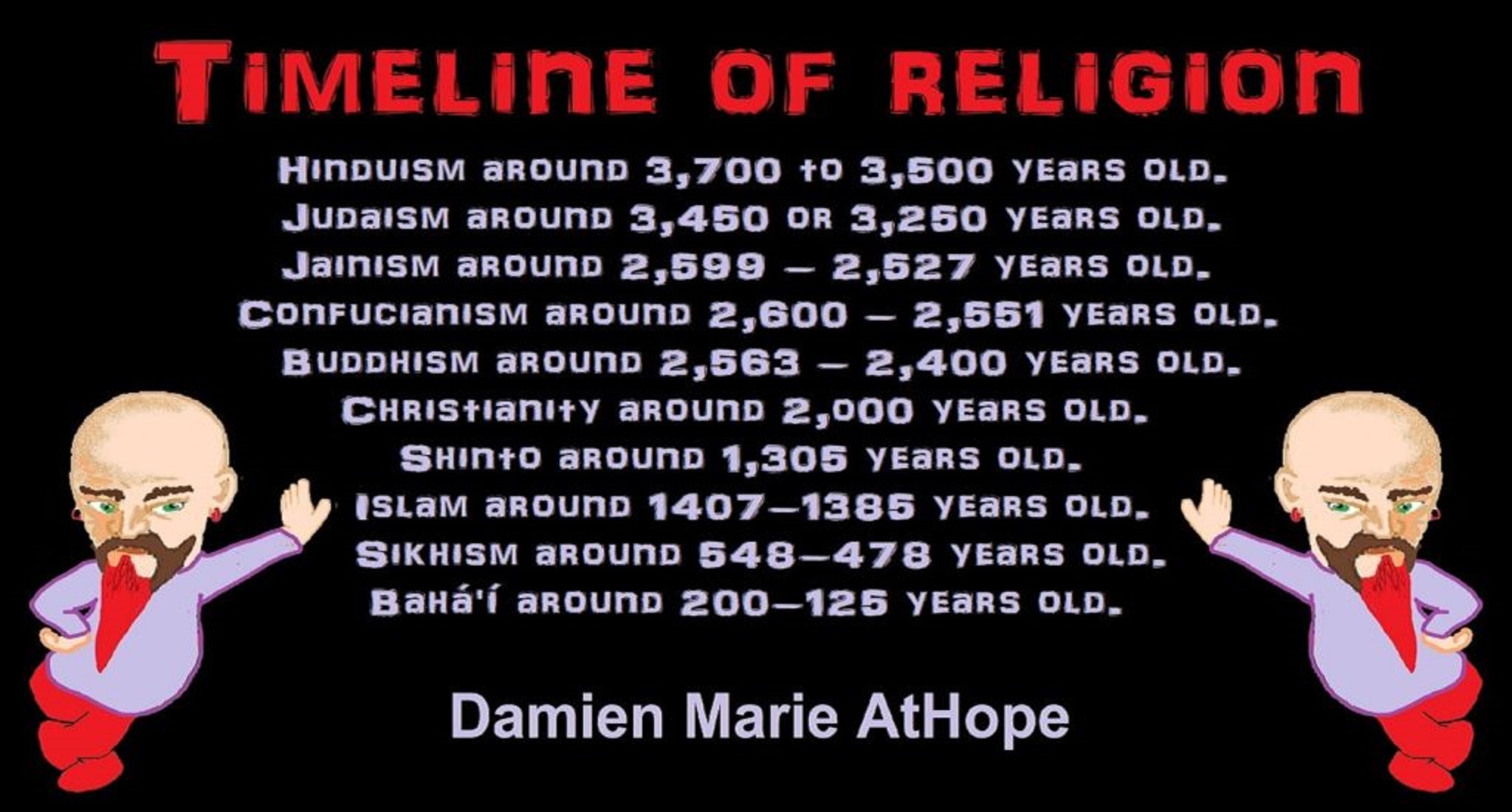
Hinduism around 3,700 to 3,500 years old. ref
Judaism around 3,450 or 3,250 years old. (The first writing in the bible was “Paleo-Hebrew” dated to around 3,000 years ago Khirbet Qeiyafa is the site of an ancient fortress city overlooking the Elah Valley. And many believe the religious Jewish texts were completed around 2,500) ref, ref
Judaism is around 3,450 or 3,250 years old. (“Paleo-Hebrew” 3,000 years ago and Torah 2,500 years ago)
“Judaism is an Abrahamic, its roots as an organized religion in the Middle East during the Bronze Age. Some scholars argue that modern Judaism evolved from Yahwism, the religion of ancient Israel and Judah, by the late 6th century BCE, and is thus considered to be one of the oldest monotheistic religions.” ref
“Yahwism is the name given by modern scholars to the religion of ancient Israel, essentially polytheistic, with a plethora of gods and goddesses. Heading the pantheon was Yahweh, the national god of the Israelite kingdoms of Israel and Judah, with his consort, the goddess Asherah; below them were second-tier gods and goddesses such as Baal, Shamash, Yarikh, Mot, and Astarte, all of whom had their own priests and prophets and numbered royalty among their devotees, and a third and fourth tier of minor divine beings, including the mal’ak, the messengers of the higher gods, who in later times became the angels of Judaism, Christianity and Islam. Yahweh, however, was not the ‘original’ god of Israel “Isra-El”; it is El, the head of the Canaanite pantheon, whose name forms the basis of the name “Israel”, and none of the Old Testament patriarchs, the tribes of Israel, the Judges, or the earliest monarchs, have a Yahwistic theophoric name (i.e., one incorporating the name of Yahweh).” ref
“El is a Northwest Semitic word meaning “god” or “deity“, or referring (as a proper name) to any one of multiple major ancient Near Eastern deities. A rarer form, ‘ila, represents the predicate form in Old Akkadian and in Amorite. The word is derived from the Proto-Semitic *ʔil-, meaning “god”. Specific deities known as ‘El or ‘Il include the supreme god of the ancient Canaanite religion and the supreme god of East Semitic speakers in Mesopotamia’s Early Dynastic Period. ʼĒl is listed at the head of many pantheons. In some Canaanite and Ugaritic sources, ʼĒl played a role as father of the gods, of creation, or both. For example, in the Ugaritic texts, ʾil mlk is understood to mean “ʼĒl the King” but ʾil hd as “the god Hadad“. The Semitic root ʾlh (Arabic ʾilāh, Aramaic ʾAlāh, ʾElāh, Hebrew ʾelōah) may be ʾl with a parasitic h, and ʾl may be an abbreviated form of ʾlh. In Ugaritic the plural form meaning “gods” is ʾilhm, equivalent to Hebrew ʾelōhîm “powers”. In the Hebrew texts this word is interpreted as being semantically singular for “god” by biblical commentators. However the documentary hypothesis for the Old Testament (corresponds to the Jewish Torah) developed originally in the 1870s, identifies these that different authors – the Jahwist, Elohist, Deuteronomist, and the Priestly source – were responsible for editing stories from a polytheistic religion into those of a monotheistic religion. Inconsistencies that arise between monotheism and polytheism in the texts are reflective of this hypothesis.” ref
Jainism around 2,599 – 2,527 years old. ref
Confucianism around 2,600 – 2,551 years old. ref
Buddhism around 2,563/2,480 – 2,483/2,400 years old. ref
Christianity around 2,o00 years old. ref
Shinto around 1,305 years old. ref
Islam around 1407–1385 years old. ref

Knowledge to Ponder:
Stars/Astrology:
- Possibly, around 30,000 years ago (in simpler form) to 6,000 years ago, Stars/Astrology are connected to Ancestors, Spirit Animals, and Deities.
- The star also seems to be a possible proto-star for Star of Ishtar, Star of Inanna, or Star of Venus.
- Around 7,000 to 6,000 years ago, Star Constellations/Astrology have connections to the “Kurgan phenomenon” of below-ground “mound” stone/wood burial structures and “Dolmen phenomenon” of above-ground stone burial structures.
- Around 6,500–5,800 years ago, The Northern Levant migrations into Jordon and Israel in the Southern Levant brought new cultural and religious transfer from Turkey and Iran.
- “The Ghassulian Star,” a mysterious 6,000-year-old mural from Jordan may have connections to the European paganstic kurgan/dolmens phenomenon.
“Astrology is a range of divinatory practices, recognized as pseudoscientific since the 18th century, that claim to discern information about human affairs and terrestrial events by studying the apparent positions of celestial objects. Different cultures have employed forms of astrology since at least the 2nd millennium BCE, these practices having originated in calendrical systems used to predict seasonal shifts and to interpret celestial cycles as signs of divine communications. Most, if not all, cultures have attached importance to what they observed in the sky, and some—such as the Hindus, Chinese, and the Maya—developed elaborate systems for predicting terrestrial events from celestial observations. Western astrology, one of the oldest astrological systems still in use, can trace its roots to 19th–17th century BCE Mesopotamia, from where it spread to Ancient Greece, Rome, the Islamicate world and eventually Central and Western Europe. Contemporary Western astrology is often associated with systems of horoscopes that purport to explain aspects of a person’s personality and predict significant events in their lives based on the positions of celestial objects; the majority of professional astrologers rely on such systems.” ref
Around 5,500 years ago, Science evolves, The first evidence of science was 5,500 years ago and was demonstrated by a body of empirical, theoretical, and practical knowledge about the natural world. ref
Around 5,000 years ago, Origin of Logics is a Naturalistic Observation (principles of valid reasoning, inference, & demonstration) ref
Around 4,150 to 4,000 years ago: The earliest surviving versions of the Sumerian Epic of Gilgamesh, which was originally titled “He who Saw the Deep” (Sha naqba īmuru) or “Surpassing All Other Kings” (Shūtur eli sharrī) were written. ref
Hinduism:
- 3,700 years ago or so, the oldest of the Hindu Vedas (scriptures), the Rig Veda was composed.
- 3,500 years ago or so, the Vedic Age began in India after the collapse of the Indus Valley Civilization.
Judaism:
- around 3,000 years ago, the first writing in the bible was “Paleo-Hebrew”
- around 2,500 years ago, many believe the religious Jewish texts were completed
Myths: The bible inspired religion is not just one religion or one myth but a grouping of several religions and myths
- Around 3,450 or 3,250 years ago, according to legend, is the traditionally accepted period in which the Israelite lawgiver, Moses, provided the Ten Commandments.
- Around 2,500 to 2,400 years ago, a collection of ancient religious writings by the Israelites based primarily upon the Hebrew Bible, Tanakh, or Old Testament is the first part of Christianity’s bible.
- Around 2,400 years ago, the most accepted hypothesis is that the canon was formed in stages, first the Pentateuch (Torah).
- Around 2,140 to 2,116 years ago, the Prophets was written during the Hasmonean dynasty, and finally the remaining books.
- Christians traditionally divide the Old Testament into four sections:
- The first five books or Pentateuch (Torah).
- The proposed history books telling the history of the Israelites from their conquest of Canaan to their defeat and exile in Babylon.
- The poetic and proposed “Wisdom books” dealing, in various forms, with questions of good and evil in the world.
- The books of the biblical prophets, warning of the consequences of turning away from God:
- Henotheism:
- Exodus 20:23 “You shall not make other gods besides Me (not saying there are no other gods just not to worship them); gods of silver or gods of gold, you shall not make for yourselves.”
- Polytheism:
- Judges 10:6 “Then the sons of Israel again did evil in the sight of the LORD, served the Baals and the Ashtaroth, the gods of Aram, the gods of Sidon, the gods of Moab, the gods of the sons of Ammon, and the gods of the Philistines; thus they forsook the LORD and did not serve Him.”
- 1 Corinthians 8:5 “For even if there are so-called gods whether in heaven or on earth, as indeed there are many gods and many lords.”
- Monotheism:
- Isaiah 43:10 “You are my witnesses,” declares the LORD, “and my servant whom I have chosen, so that you may know and believe me and understand that I am he. Before me no god was formed, nor will there be one after me.
Around 2,570 to 2,270 Years Ago, there is a confirmation of atheistic doubting as well as atheistic thinking, mainly by Greek philosophers. However, doubting gods is likely as old as the invention of gods and should destroy the thinking that belief in god(s) is the “default belief”. The Greek word is apistos (a “not” and pistos “faithful,”), thus not faithful or faithless because one is unpersuaded and unconvinced by a god(s) claim. Short Definition: unbelieving, unbeliever, or unbelief.

Expressions of Atheistic Thinking:
- Around 2,600 years ago, Ajita Kesakambali, ancient Indian philosopher, who is the first known proponent of Indian materialism. ref
- Around 2,535 to 2,475 years ago, Heraclitus, Greek pre-Socratic philosopher, a native of the Greek city Ephesus, Ionia, on the coast of Anatolia, also known as Asia Minor or modern Turkey. ref
- Around 2,500 to 2,400 years ago, according to The Story of Civilization book series certain African pygmy tribes have no identifiable gods, spirits, or religious beliefs or rituals, and even what burials accrue are without ceremony. ref
- Around 2,490 to 2,430 years ago, Empedocles, Greek pre-Socratic philosopher and a citizen of Agrigentum, a Greek city in Sicily. ref
- Around 2,460 to 2,370 years ago, Democritus, Greek pre-Socratic philosopher considered to be the “father of modern science” possibly had some disbelief amounting to atheism. ref
- Around 2,399 years ago or so, Socrates, a famous Greek philosopher was tried for sinfulness by teaching doubt of state gods. ref
- Around 2,341 to 2,270 years ago, Epicurus, a Greek philosopher known for composing atheistic critics and famously stated, “Is God willing to prevent evil, but not able? Then he is not omnipotent. Is he able, but not willing? Then he is malevolent. Is he both able and willing? Then whence cometh evil? Is he neither able nor willing? Then why call him god?” ref
This last expression by Epicurus, seems to be an expression of Axiological Atheism. To understand and utilize value or actually possess “Value Conscious/Consciousness” to both give a strong moral “axiological” argument (the problem of evil) as well as use it to fortify humanism and positive ethical persuasion of human helping and care responsibilities. Because value-blindness gives rise to sociopathic/psychopathic evil.

While hallucinogens are associated with shamanism, it is alcohol that is associated with paganism.
The Atheist-Humanist-Leftist Revolutionaries Shows in the prehistory series:
Show two: Pre-animism 300,000 years old and animism 100,000 years old: related to “Anarchism and Socialism”
Show tree: Totemism 50,000 years old: related to “Anarchism and Socialism”
Show four: Shamanism 30,000 years old: related to “Anarchism and Socialism”
Show five: Paganism 12,000 years old: related to “Anarchism and Socialism”
Show six: Emergence of hierarchy, sexism, slavery, and the new male god dominance: Paganism 7,000-5,000 years old: related to “Anarchism and Socialism” (Capitalism) (World War 0) Elite and their slaves!
Prehistory: related to “Anarchism and Socialism” the division of labor, power, rights, and recourses: VIDEO
Pre-animism 300,000 years old and animism 100,000 years old: related to “Anarchism and Socialism”: VIDEO
Totemism 50,000 years old: related to “Anarchism and Socialism”: VIDEO
Shamanism 30,000 years old: related to “Anarchism and Socialism”: VIDEO
Paganism 12,000 years old: related to “Anarchism and Socialism” (Pre-Capitalism): VIDEO
Paganism 7,000-5,000 years old: related to “Anarchism and Socialism” (Capitalism) (World War 0) Elite and their slaves: VIEDO
Paganism 5,000 years old: progressed organized religion and the state: related to “Anarchism and Socialism” (Kings and the Rise of the State): VIEDO
Paganism 4,000 years old: related to “Anarchism and Socialism” (First Moralistic gods, then the Origin time of Monotheism): VIEDO
I do not hate simply because I challenge and expose myths or lies any more than others being thought of as loving simply because of the protection and hiding from challenge their favored myths or lies.
The truth is best championed in the sunlight of challenge.
An archaeologist once said to me “Damien religion and culture are very different”
My response, So are you saying that was always that way, such as would you say Native Americans’ cultures are separate from their religions? And do you think it always was the way you believe?
I had said that religion was a cultural product. That is still how I see it and there are other archaeologists that think close to me as well. Gods too are the myths of cultures that did not understand science or the world around them, seeing magic/supernatural everywhere.
I personally think there is a goddess and not enough evidence to support a male god at Çatalhöyük but if there was both a male and female god and goddess then I know the kind of gods they were like Proto-Indo-European mythology.
This series idea was addressed in, Anarchist Teaching as Free Public Education or Free Education in the Public: VIDEO
Our 12 video series: Organized Oppression: Mesopotamian State Force and the Politics of power (9,000-4,000 years ago), is adapted from: The Complete and Concise History of the Sumerians and Early Bronze Age Mesopotamia (7000-2000 BC): https://www.youtube.com/watch?v=szFjxmY7jQA by “History with Cy“
Show #1: Mesopotamian State Force and the Politics of Power (Samarra, Halaf, Ubaid)
Show #2: Mesopotamian State Force and the Politics of Power
Show #3: Mesopotamian State Force and the Politics of Power (Uruk and the First Cities)
Show #4: Mesopotamian State Force and the Politics of Power (First Kings)
Show #5: Mesopotamian State Force and the Politics of Power (Early Dynastic Period)
Show #6: Mesopotamian State Force and the Politics of Power
Show #7: Mesopotamian State Force and the Politics of Power (Sargon and Akkadian Rule)
Show #9: Mesopotamian State Force and the Politics of Power (Gudea of Lagash and Utu-hegal)
Show #12: Mesopotamian State Force and the Politics of Power (Aftermath and Legacy of Sumer)

The “Atheist-Humanist-Leftist Revolutionaries”
Cory Johnston ☭ Ⓐ Atheist Leftist @Skepticallefty & I (Damien Marie AtHope) @AthopeMarie (my YouTube & related blog) are working jointly in atheist, antitheist, antireligionist, antifascist, anarchist, socialist, and humanist endeavors in our videos together, generally, every other Saturday.
Why Does Power Bring Responsibility?
Think, how often is it the powerless that start wars, oppress others, or commit genocide? So, I guess the question is to us all, to ask, how can power not carry responsibility in a humanity concept? I know I see the deep ethical responsibility that if there is power their must be a humanistic responsibility of ethical and empathic stewardship of that power. Will I be brave enough to be kind? Will I possess enough courage to be compassionate? Will my valor reach its height of empathy? I as everyone, earns our justified respect by our actions, that are good, ethical, just, protecting, and kind. Do I have enough self-respect to put my love for humanity’s flushing, over being brought down by some of its bad actors? May we all be the ones doing good actions in the world, to help human flourishing.
I create the world I want to live in, striving for flourishing. Which is not a place but a positive potential involvement and promotion; a life of humanist goal precision. To master oneself, also means mastering positive prosocial behaviors needed for human flourishing. I may have lost a god myth as an atheist, but I am happy to tell you, my friend, it is exactly because of that, leaving the mental terrorizer, god belief, that I truly regained my connected ethical as well as kind humanity.
Cory and I will talk about prehistory and theism, addressing the relevance to atheism, anarchism, and socialism.
At the same time as the rise of the male god, 7,000 years ago, there was also the very time there was the rise of violence, war, and clans to kingdoms, then empires, then states. It is all connected back to 7,000 years ago, and it moved across the world.
Cory Johnston: https://damienmarieathope.com/2021/04/cory-johnston-mind-of-a-skeptical-leftist/?v=32aec8db952d
The Mind of a Skeptical Leftist (YouTube)
Cory Johnston: Mind of a Skeptical Leftist @Skepticallefty
The Mind of a Skeptical Leftist By Cory Johnston: “Promoting critical thinking, social justice, and left-wing politics by covering current events and talking to a variety of people. Cory Johnston has been thoughtfully talking to people and attempting to promote critical thinking, social justice, and left-wing politics.” http://anchor.fm/skepticalleft
Cory needs our support. We rise by helping each other.
Cory Johnston ☭ Ⓐ @Skepticallefty Evidence-based atheist leftist (he/him) Producer, host, and co-host of 4 podcasts @skeptarchy @skpoliticspod and @AthopeMarie
Damien Marie AtHope (“At Hope”) Axiological Atheist, Anti-theist, Anti-religionist, Secular Humanist. Rationalist, Writer, Artist, Poet, Philosopher, Advocate, Activist, Psychology, and Armchair Archaeology/Anthropology/Historian.
Damien is interested in: Freedom, Liberty, Justice, Equality, Ethics, Humanism, Science, Atheism, Antiteism, Antireligionism, Ignosticism, Left-Libertarianism, Anarchism, Socialism, Mutualism, Axiology, Metaphysics, LGBTQI, Philosophy, Advocacy, Activism, Mental Health, Psychology, Archaeology, Social Work, Sexual Rights, Marriage Rights, Woman’s Rights, Gender Rights, Child Rights, Secular Rights, Race Equality, Ageism/Disability Equality, Etc. And a far-leftist, “Anarcho-Humanist.”
I am not a good fit in the atheist movement that is mostly pro-capitalist, I am anti-capitalist. Mostly pro-skeptic, I am a rationalist not valuing skepticism. Mostly pro-agnostic, I am anti-agnostic. Mostly limited to anti-Abrahamic religions, I am an anti-religionist.
To me, the “male god” seems to have either emerged or become prominent around 7,000 years ago, whereas the now favored monotheism “male god” is more like 4,000 years ago or so. To me, the “female goddess” seems to have either emerged or become prominent around 11,000-10,000 years ago or so, losing the majority of its once prominence around 2,000 years ago due largely to the now favored monotheism “male god” that grow in prominence after 4,000 years ago or so.
My Thought on the Evolution of Gods?
Animal protector deities from old totems/spirit animal beliefs come first to me, 13,000/12,000 years ago, then women as deities 11,000/10,000 years ago, then male gods around 7,000/8,000 years ago. Moralistic gods around 5,000/4,000 years ago, and monotheistic gods around 4,000/3,000 years ago.

Damien Marie AtHope (Said as “At” “Hope”)/(Autodidact Polymath but not good at math):
Axiological Atheist, Anti-theist, Anti-religionist, Secular Humanist, Rationalist, Writer, Artist, Jeweler, Poet, “autodidact” Philosopher, schooled in Psychology, and “autodidact” Armchair Archaeology/Anthropology/Pre-Historian (Knowledgeable in the range of: 1 million to 5,000/4,000 years ago). I am an anarchist socialist politically. Reasons for or Types of Atheism
My Website, My Blog, & Short-writing or Quotes, My YouTube, Twitter: @AthopeMarie, and My Email: damien.marie.athope@gmail.com

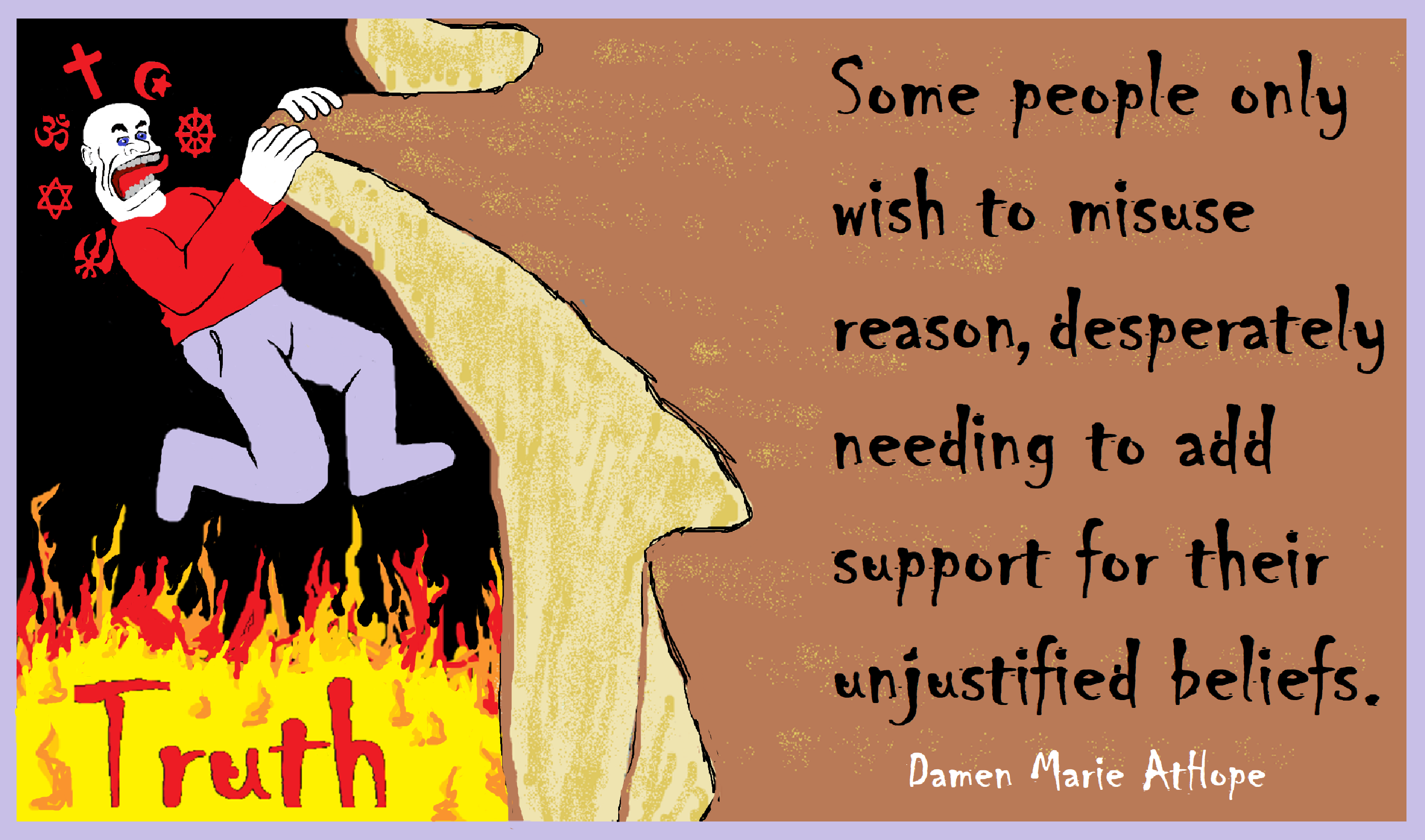

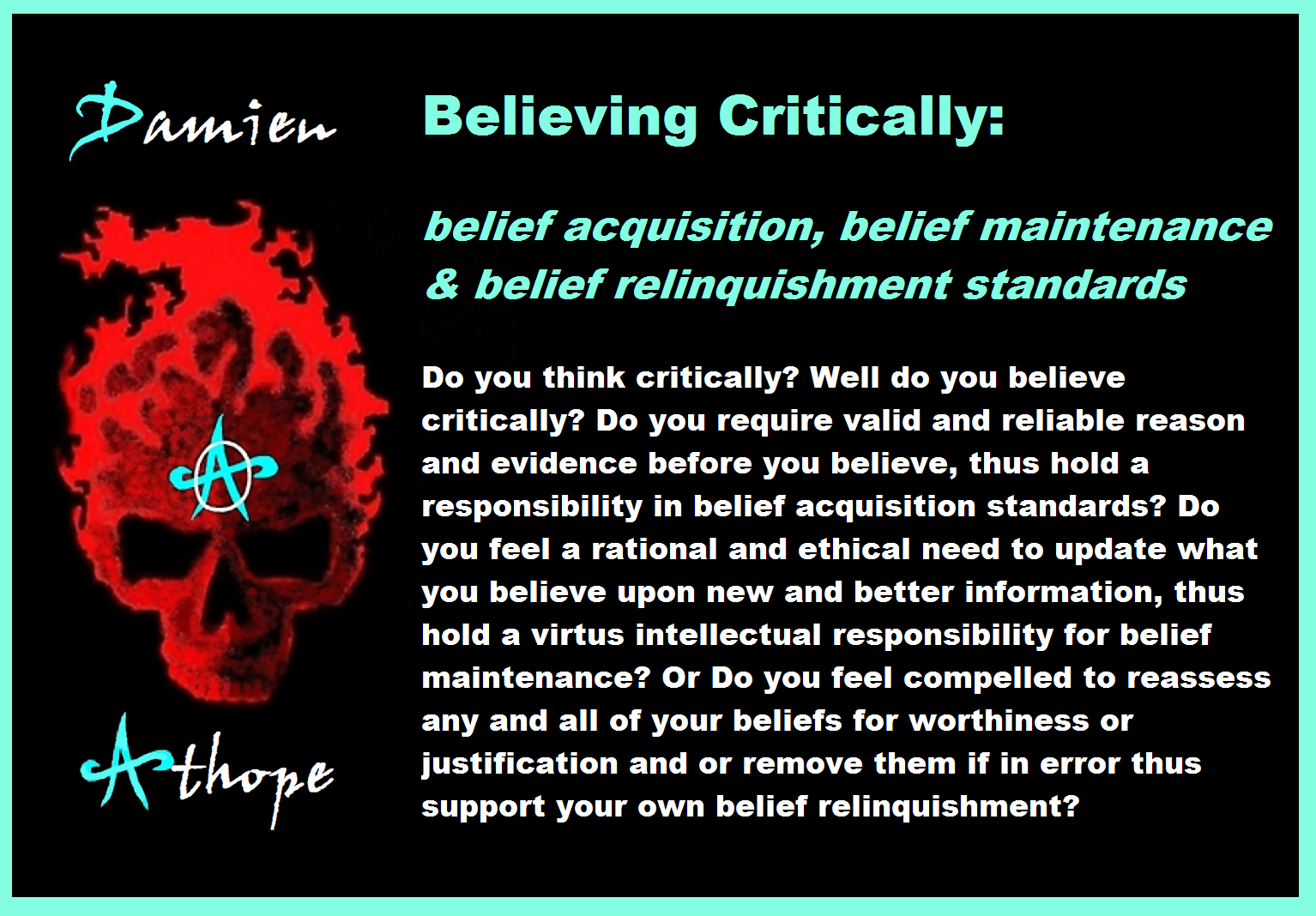
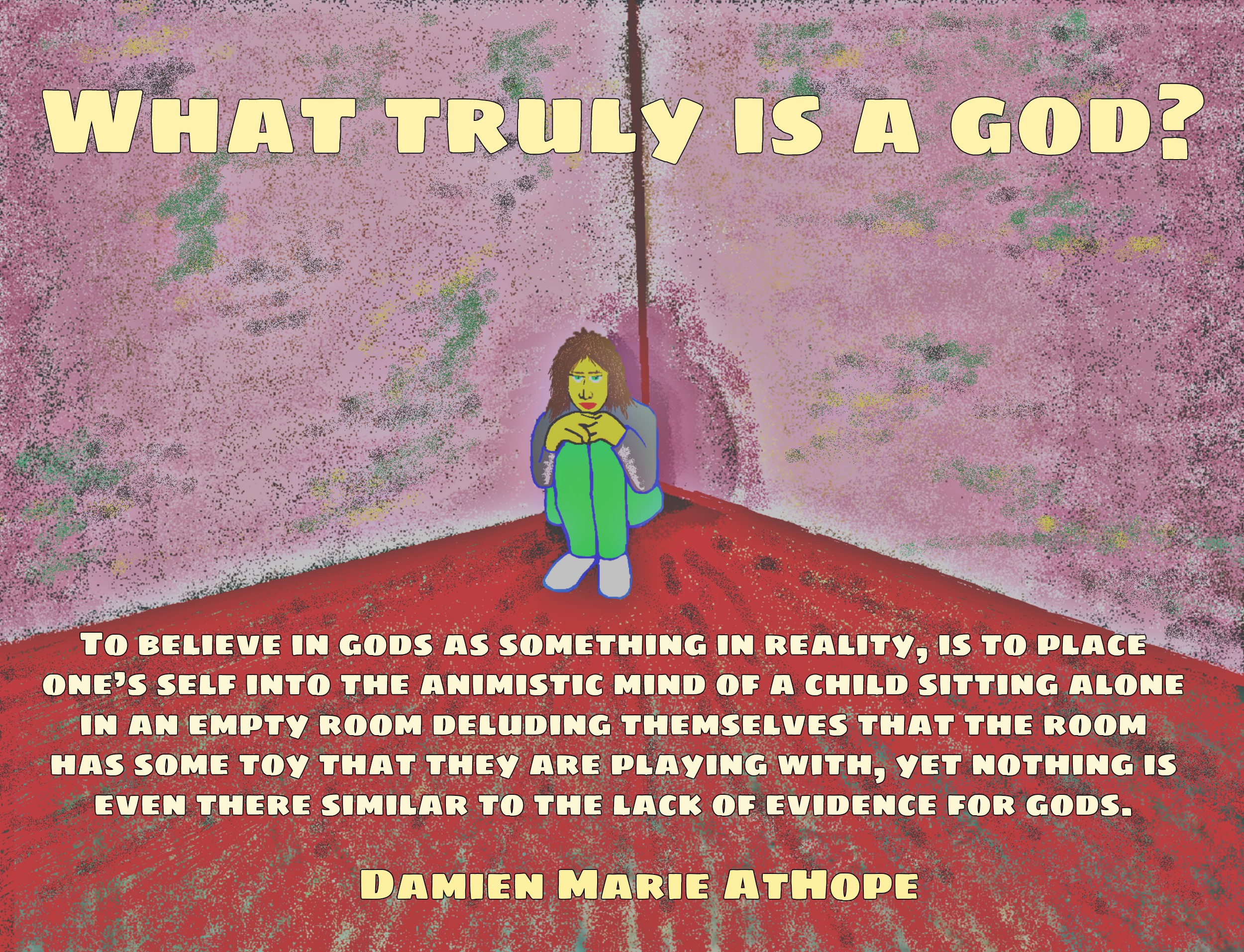
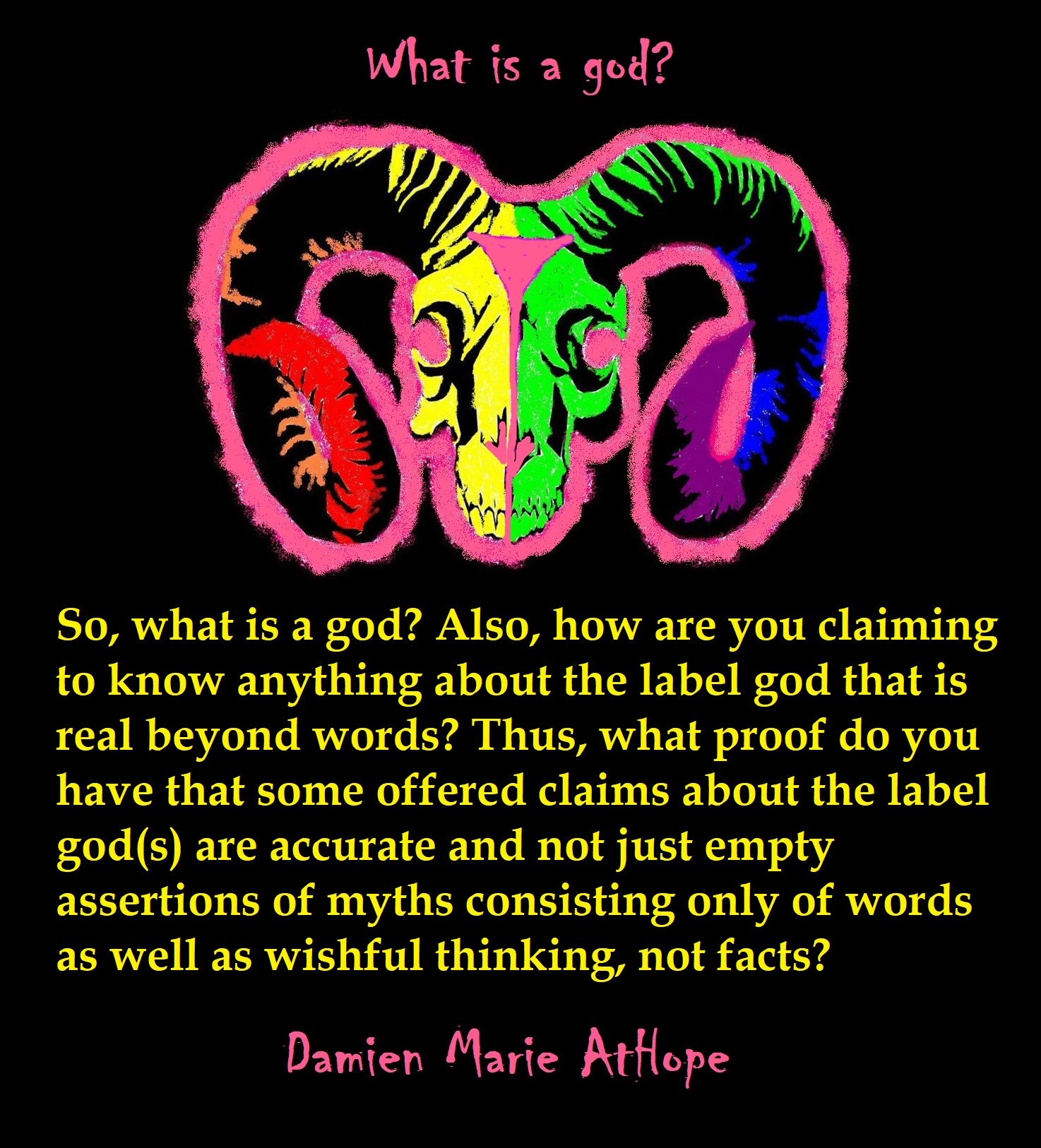
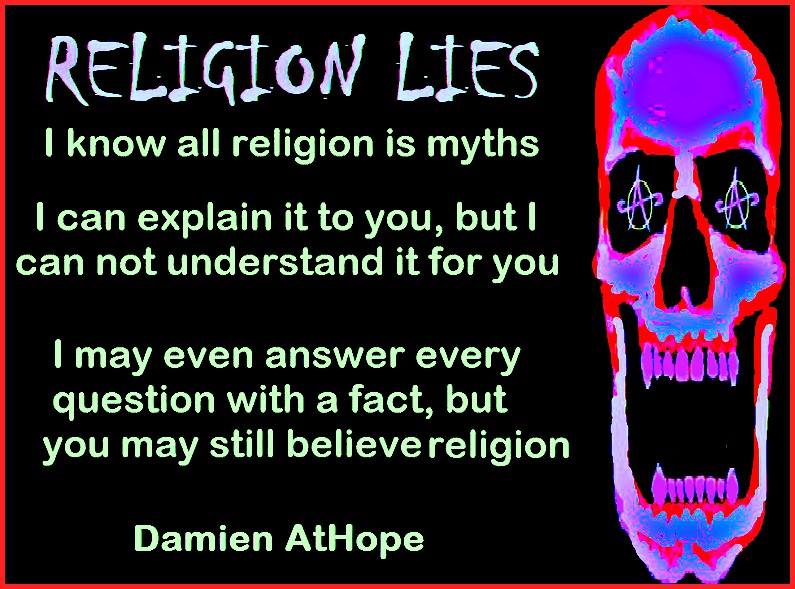

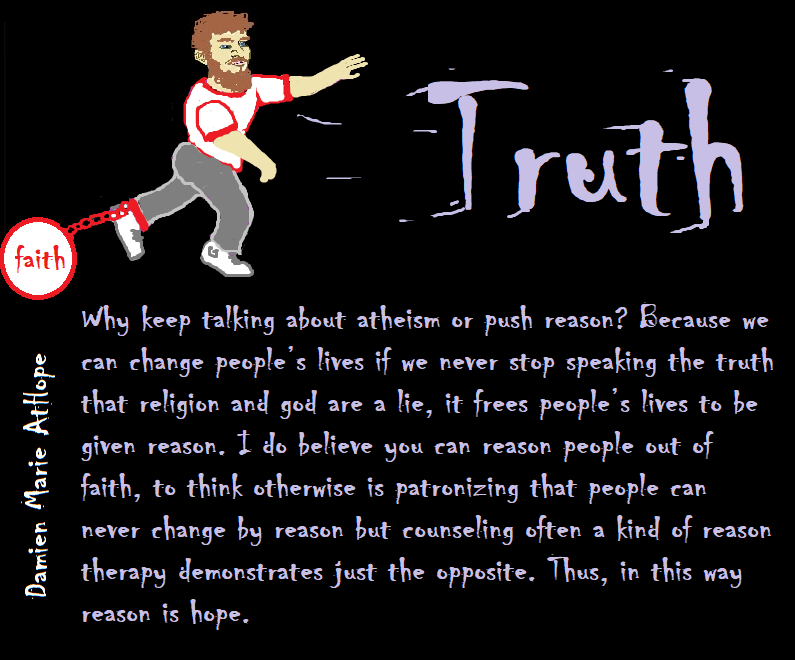
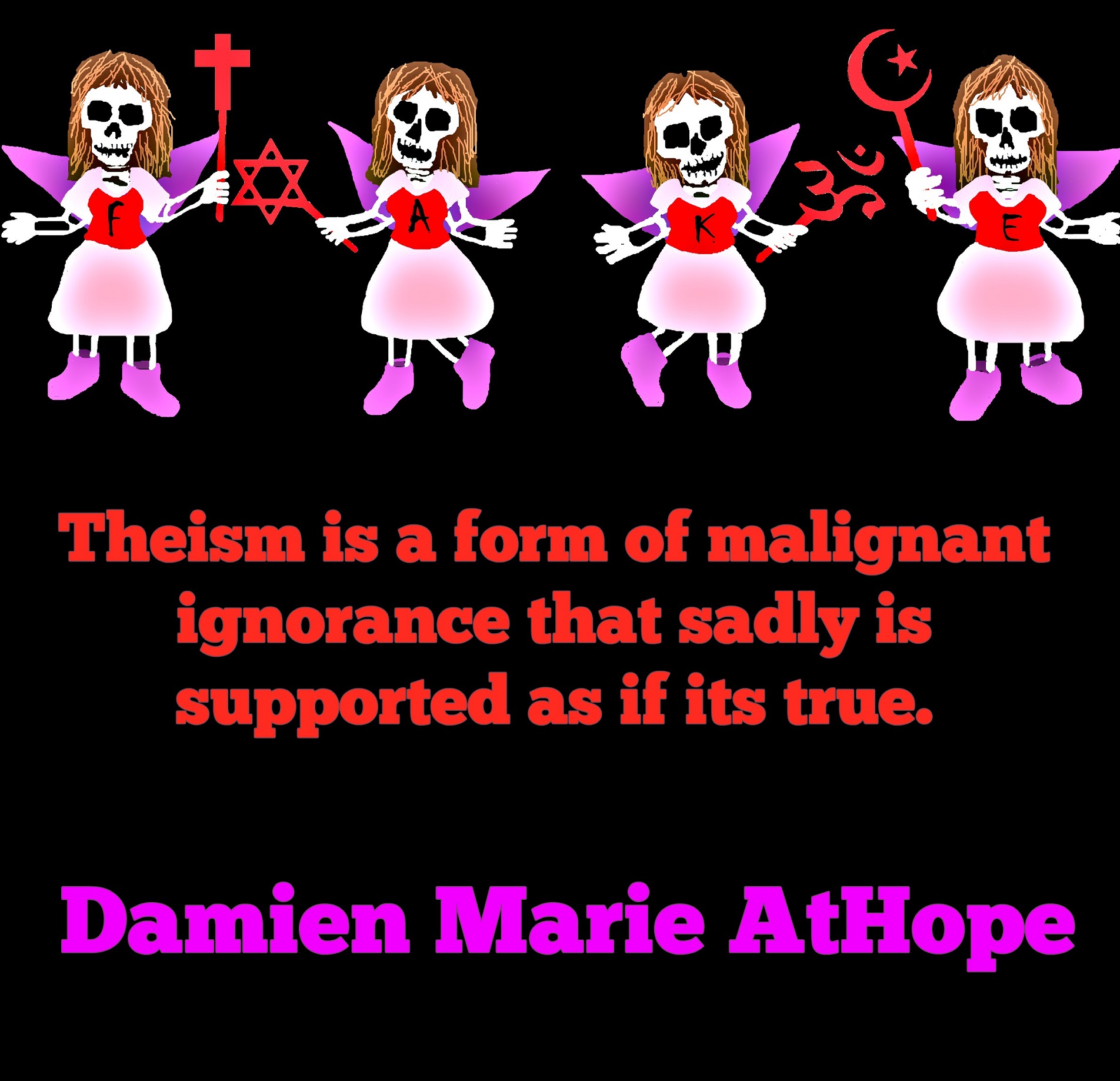
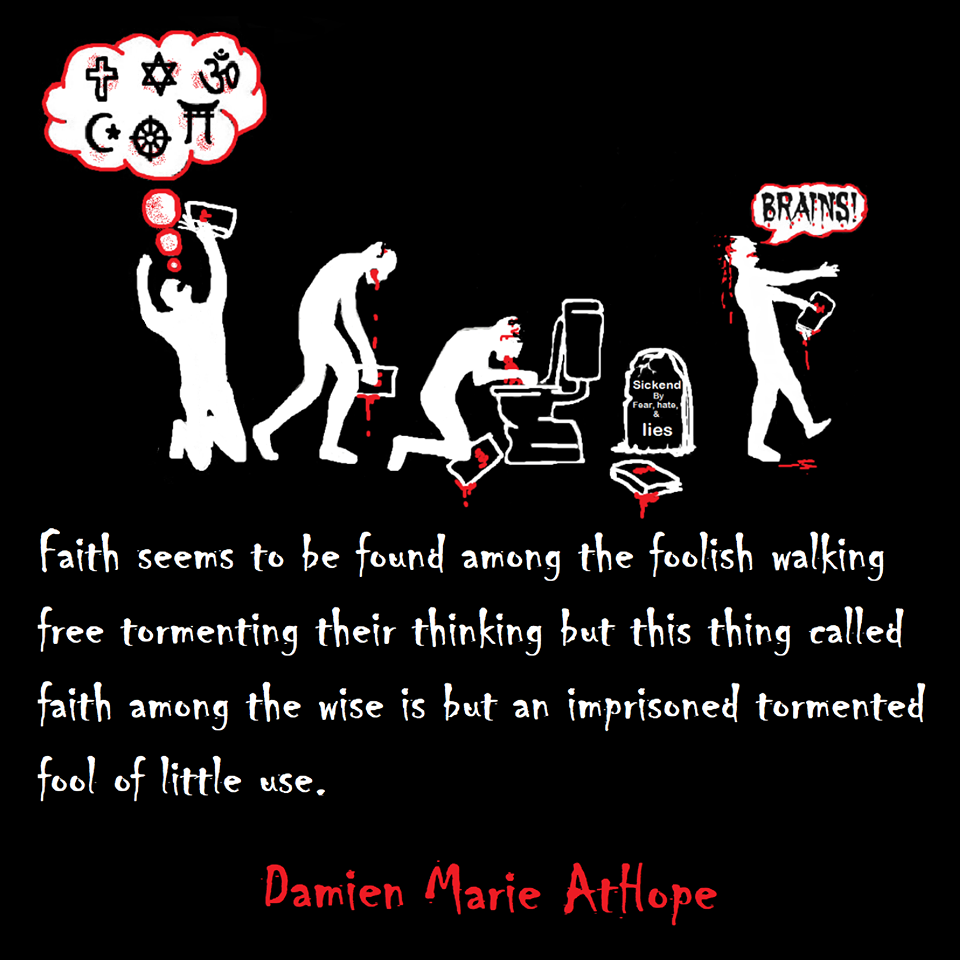
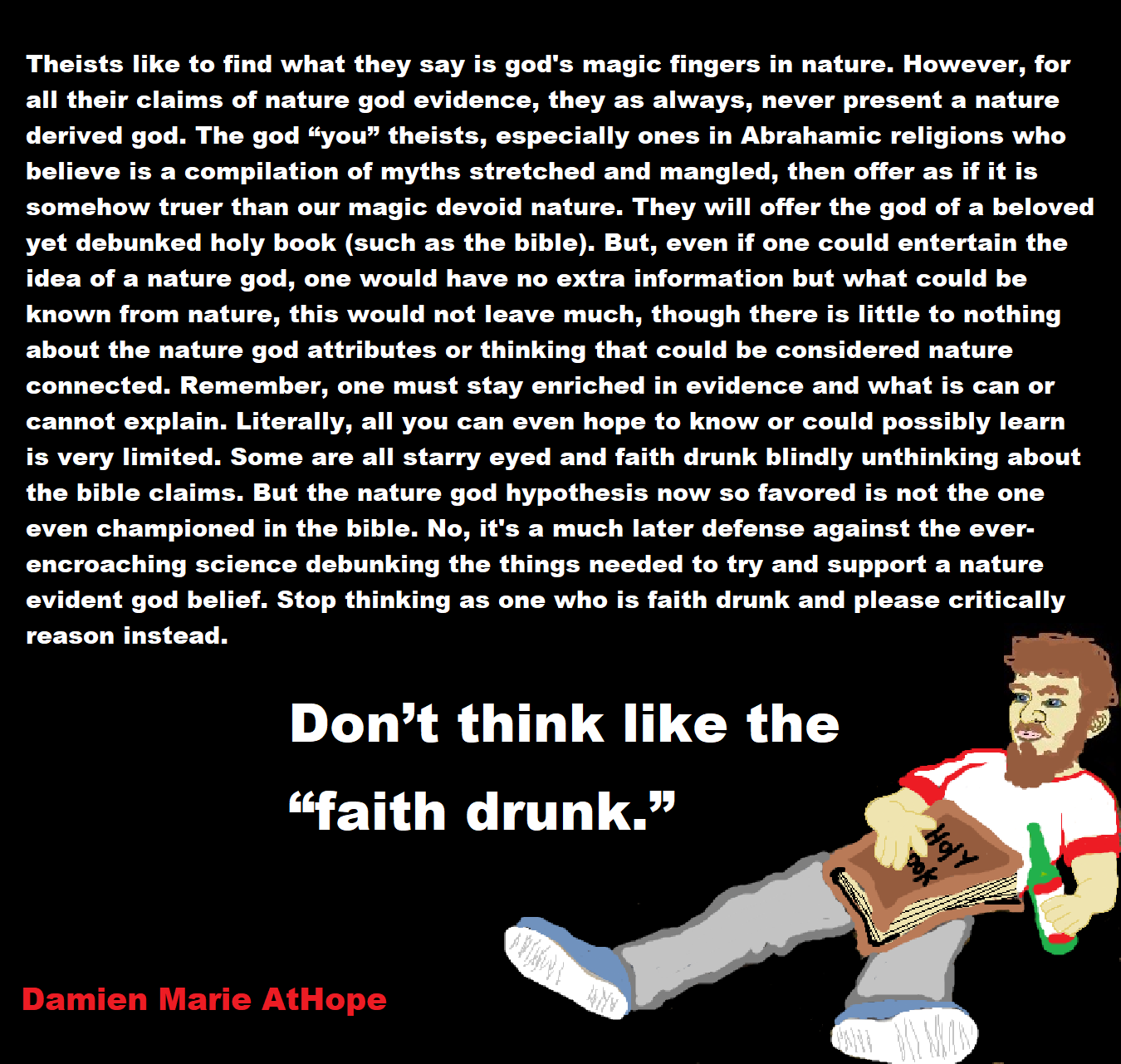
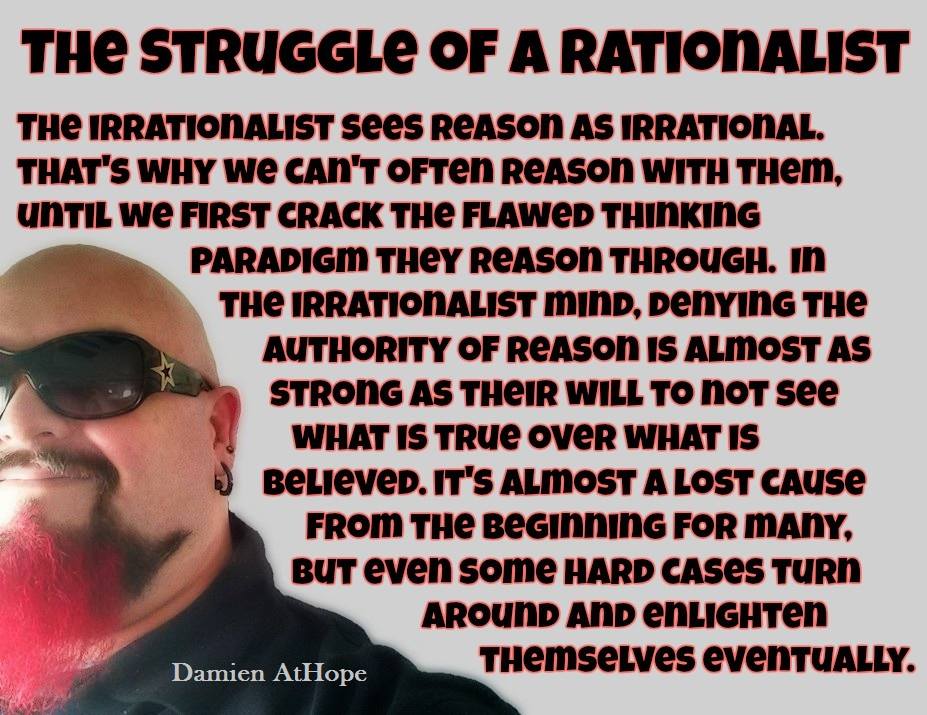

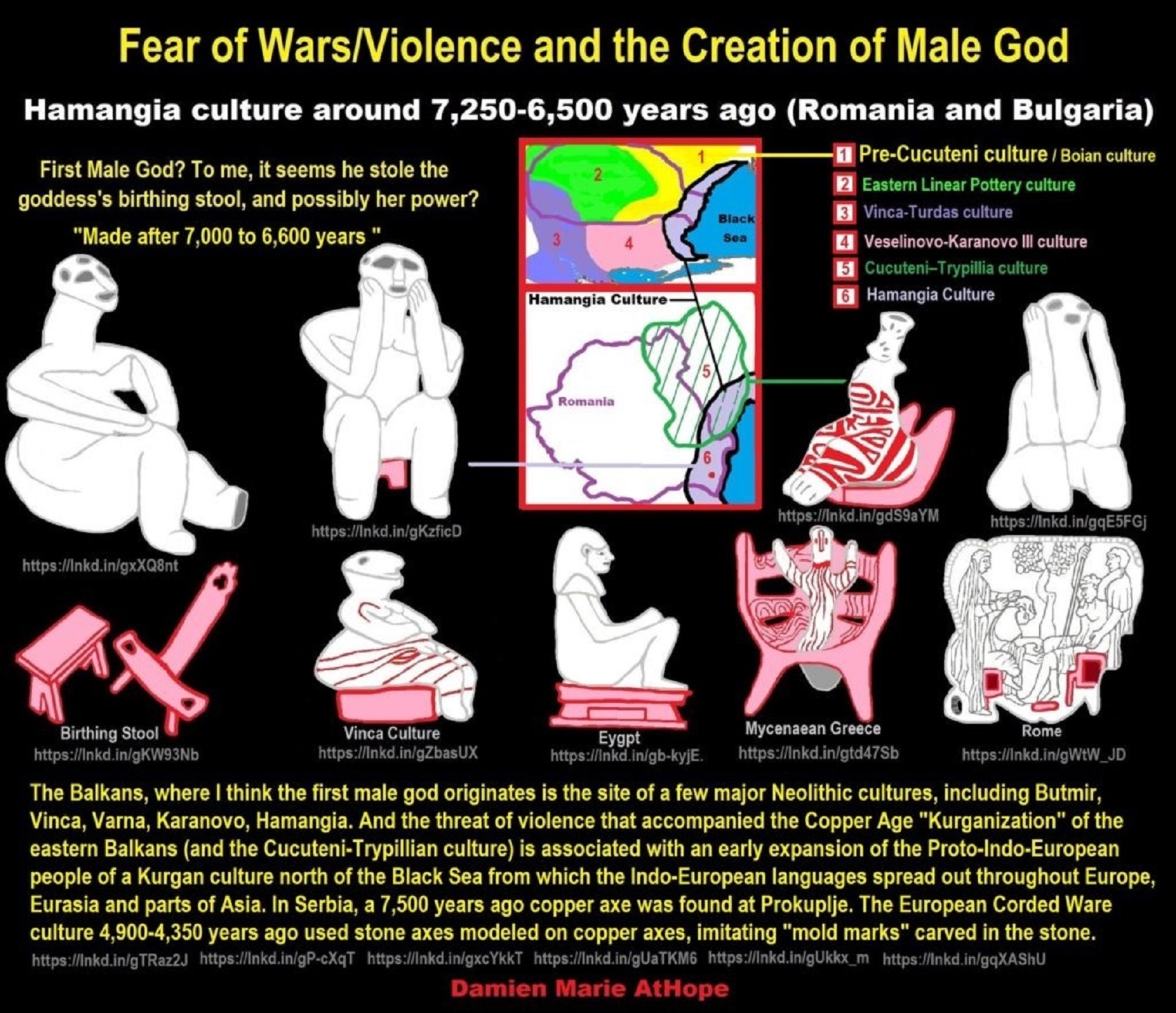

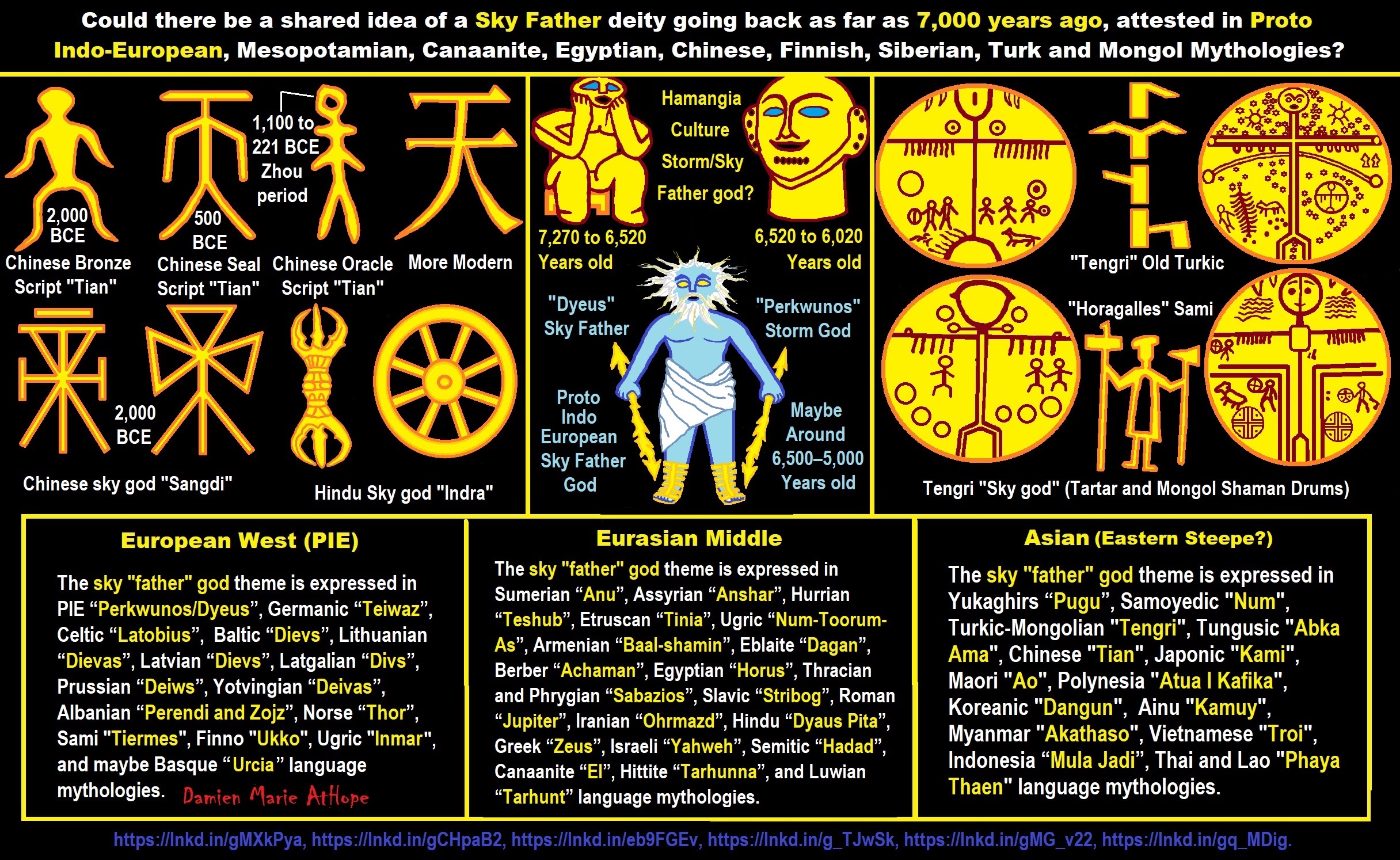
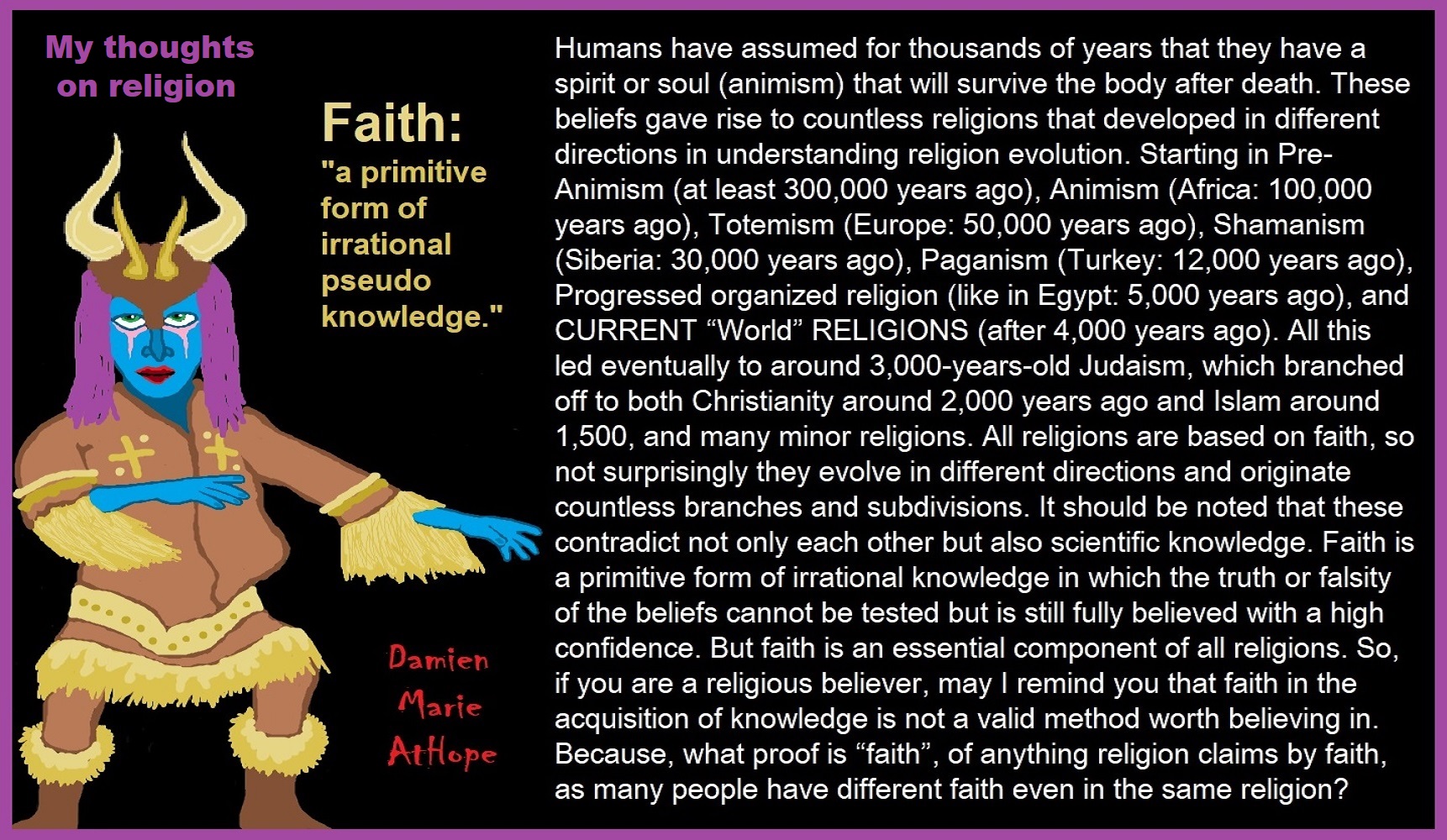

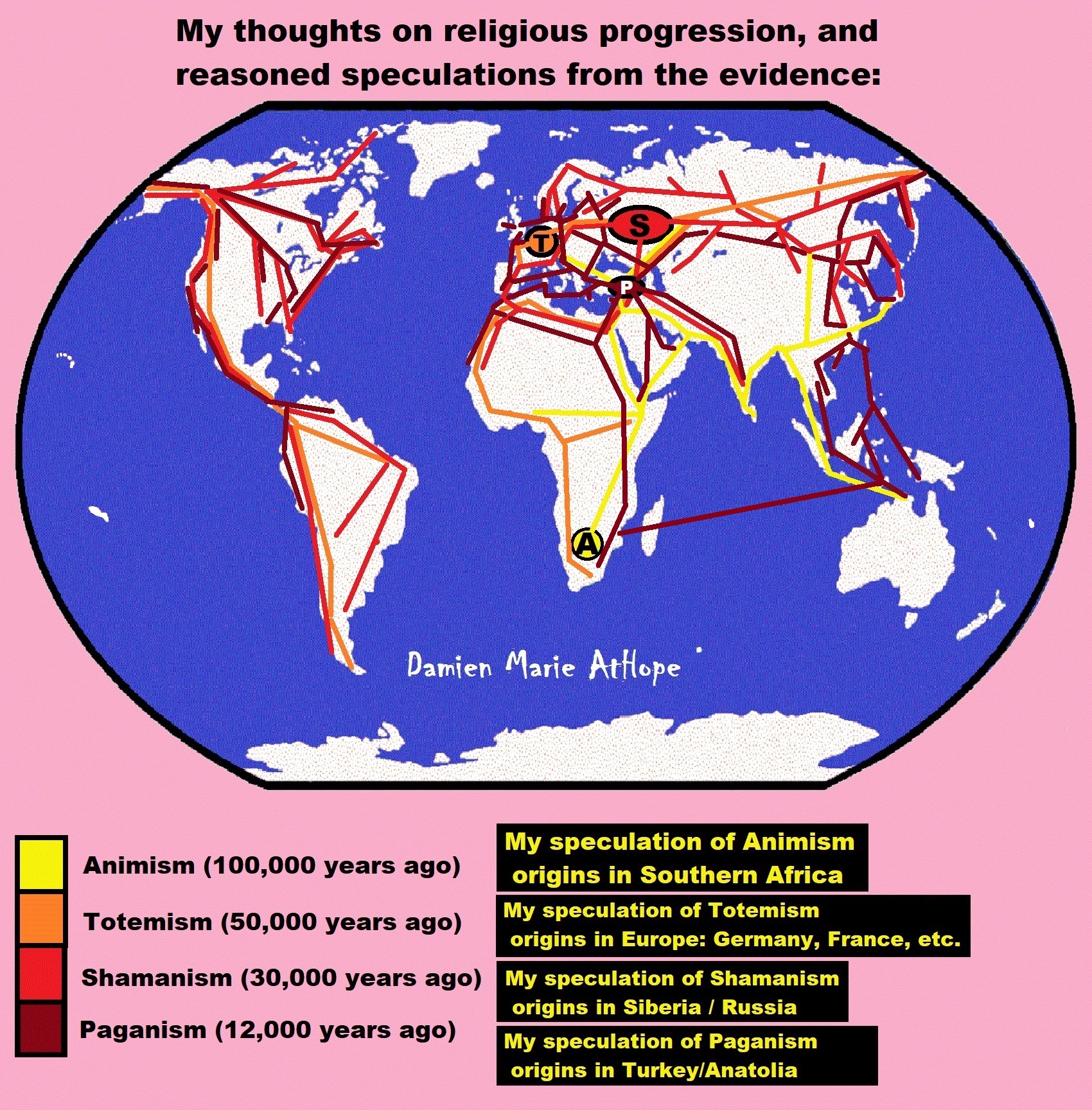


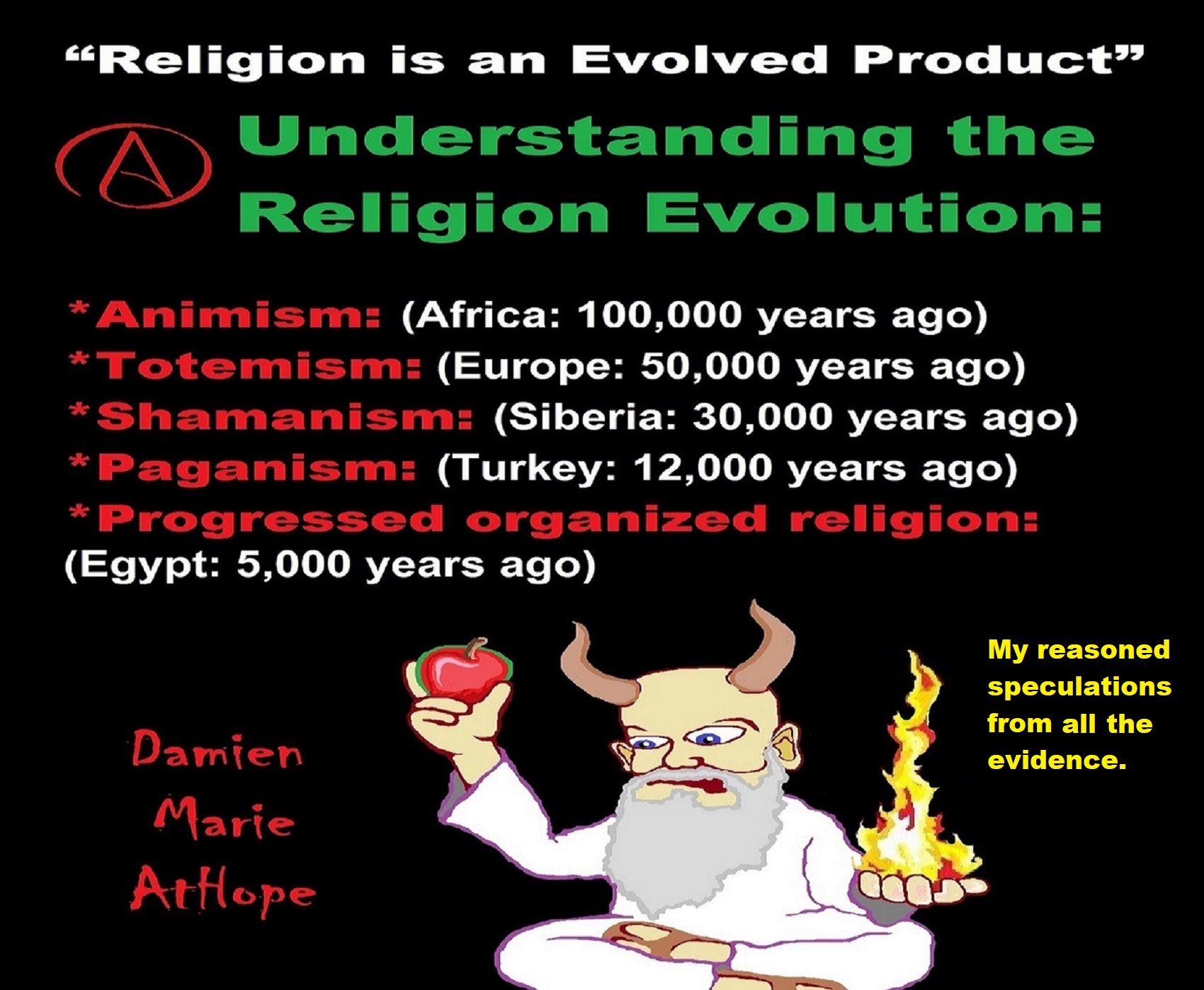
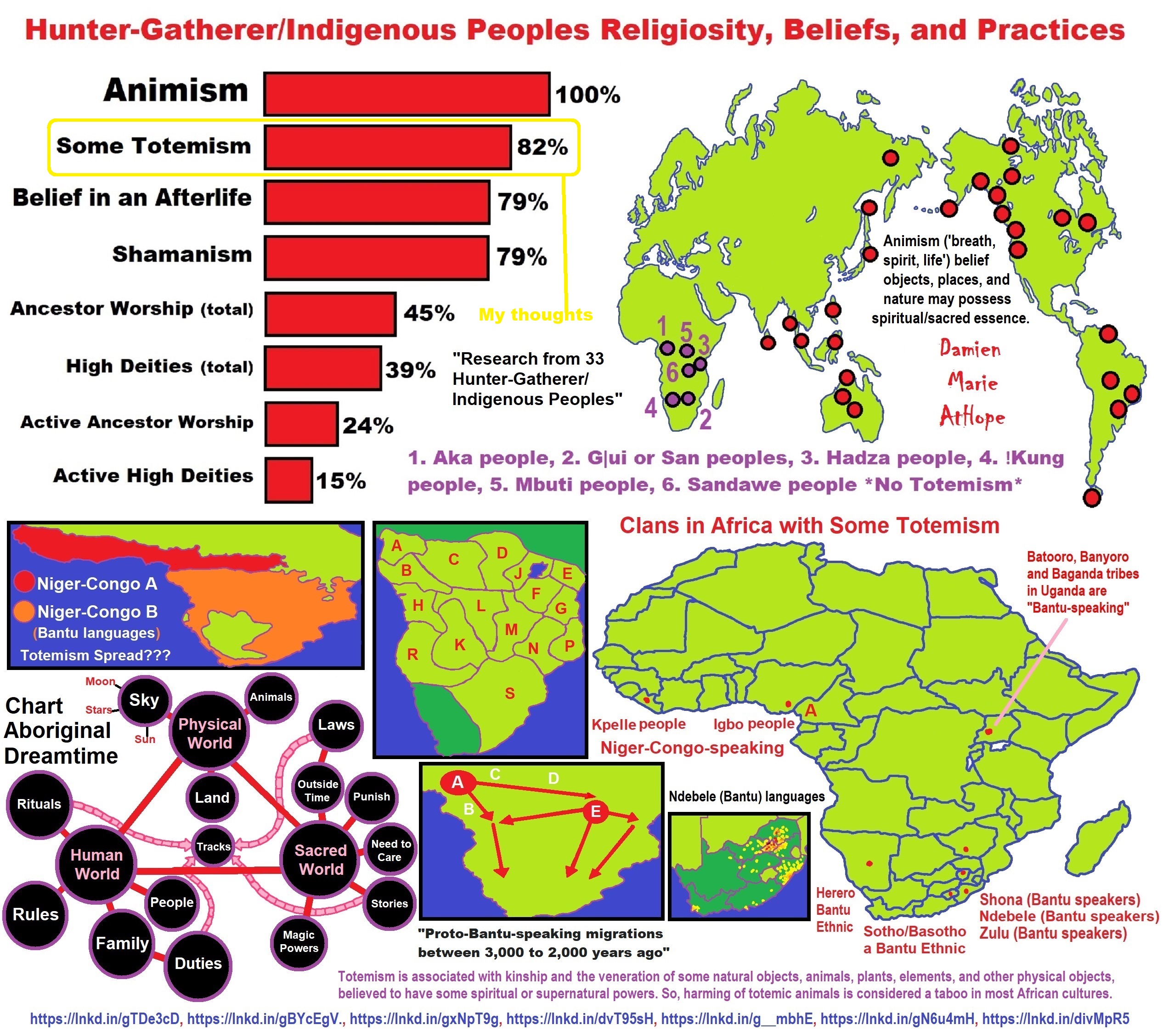




It seems ancient peoples had to survived amazing threats in a “dangerous universe (by superstition perceived as good and evil),” and human “immorality or imperfection of the soul” which was thought to affect the still living, leading to ancestor worship. This ancestor worship presumably led to the belief in supernatural beings, and then some of these were turned into the belief in gods. This feeble myth called gods were just a human conceived “made from nothing into something over and over, changing, again and again, taking on more as they evolves all the while they are thought to be special,” but it is just supernatural animistic spirit-belief perceived as sacred. So, it all starts in a general way with Animism (theoretical belief in supernatural powers/spirits), then this is physically expressed in or with Totemism (theoretical belief in mythical relationship with powers/spirits through a totem item), which then enlists a full-time specific person to do this worship and believed interacting Shamanism (theoretical belief in access and influence with spirits through ritual), and then there is the further employment of myths and gods added to all the above giving you Paganism (often a lot more nature-based than most current top world religions, thus hinting to their close link to more ancient religious thinking it stems from). My hypothesis is expressed with an explanation of the building of a theatrical house (modern religions development).